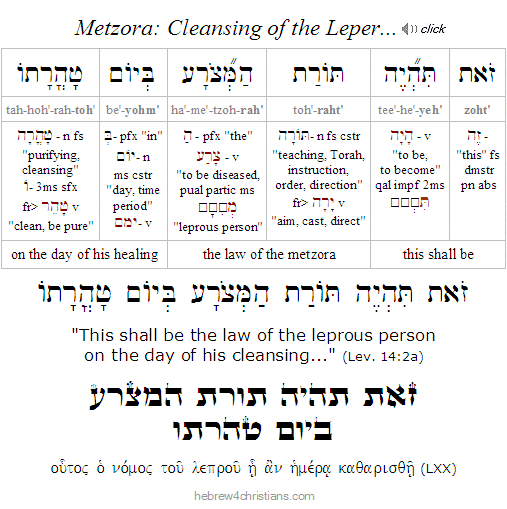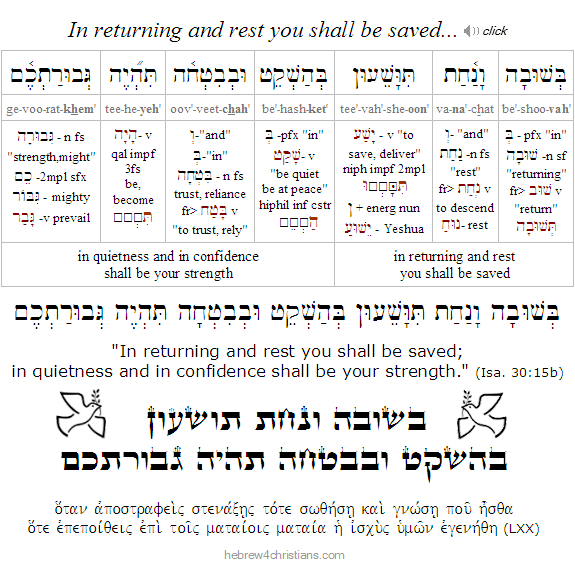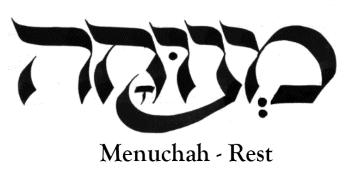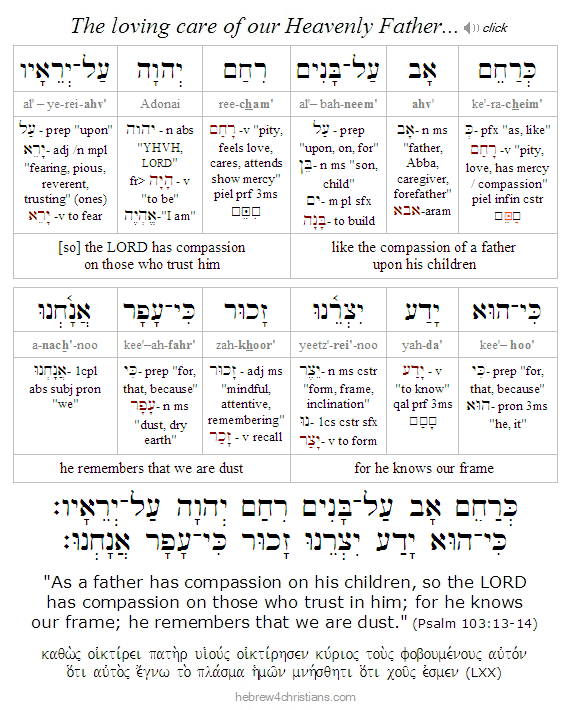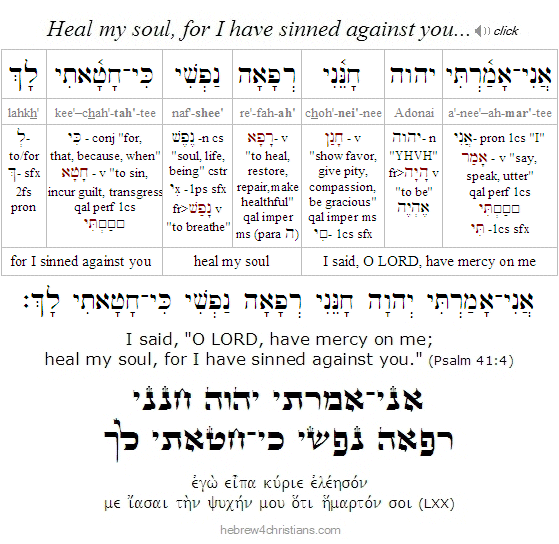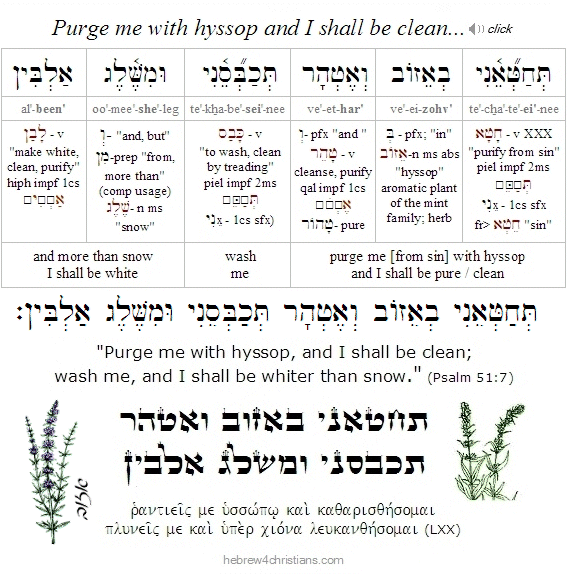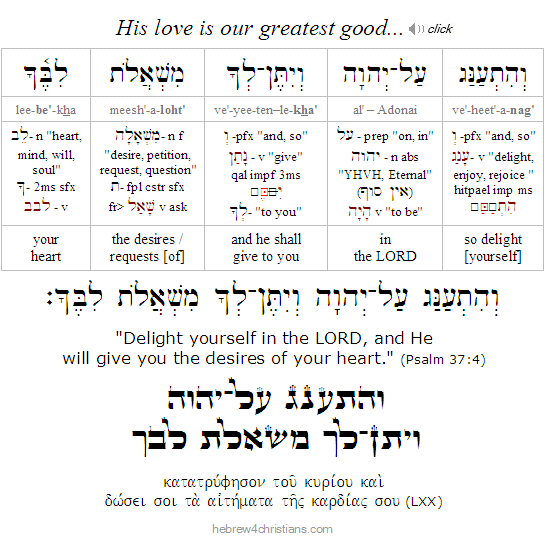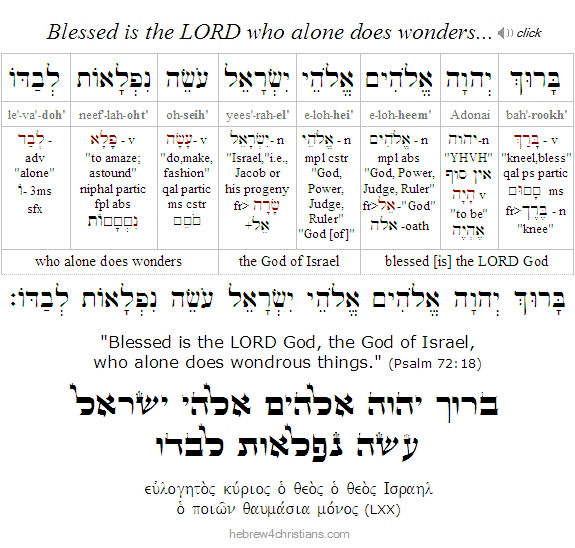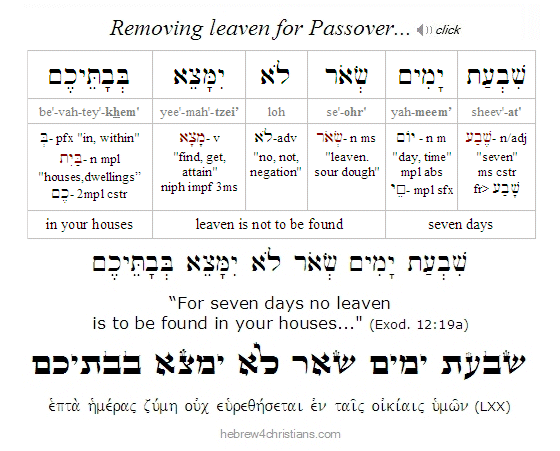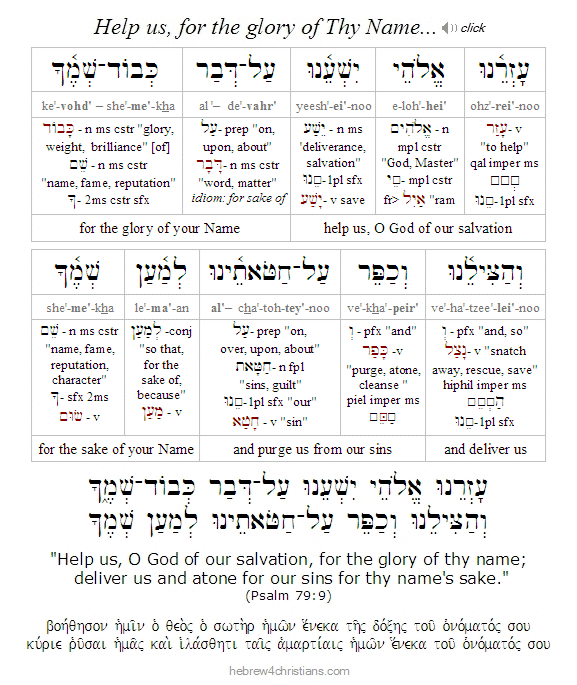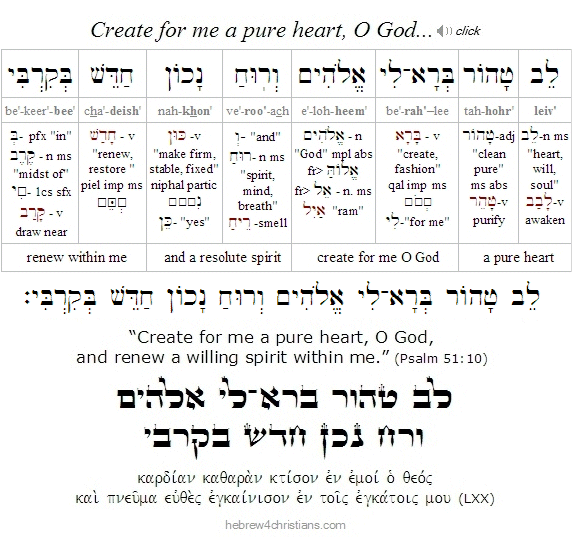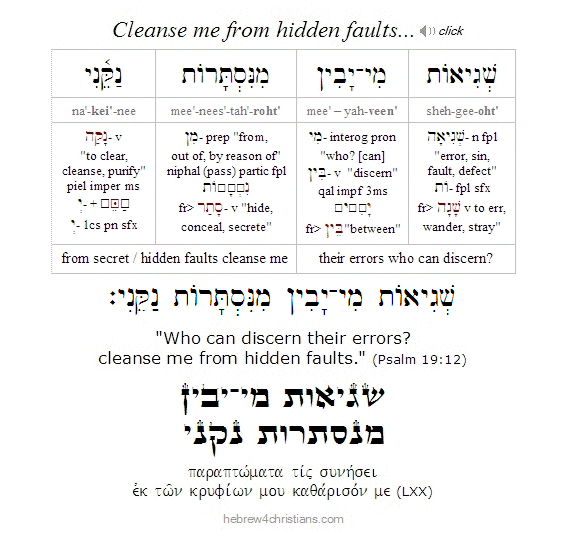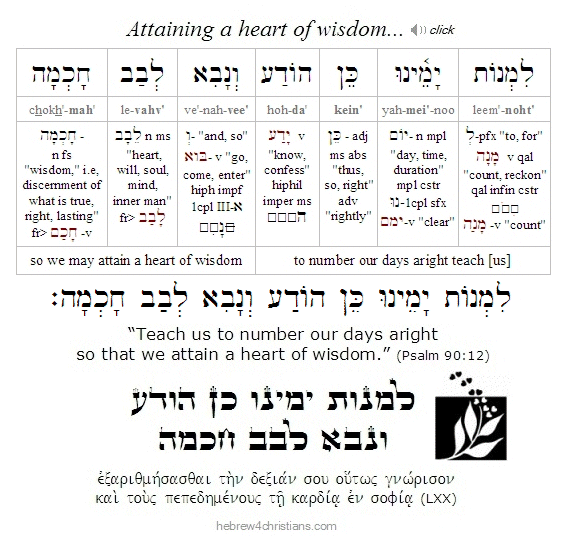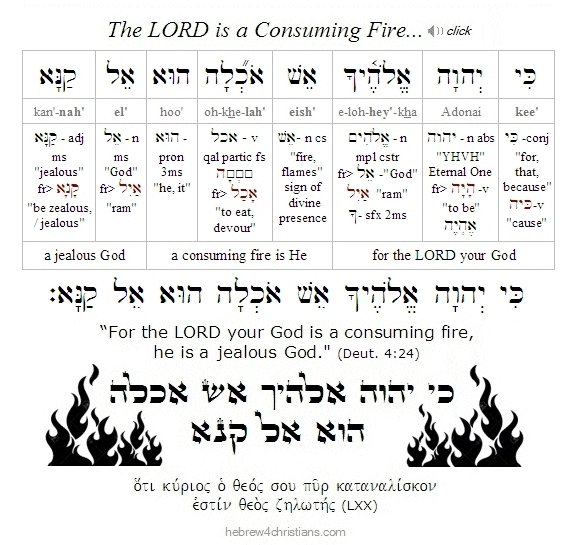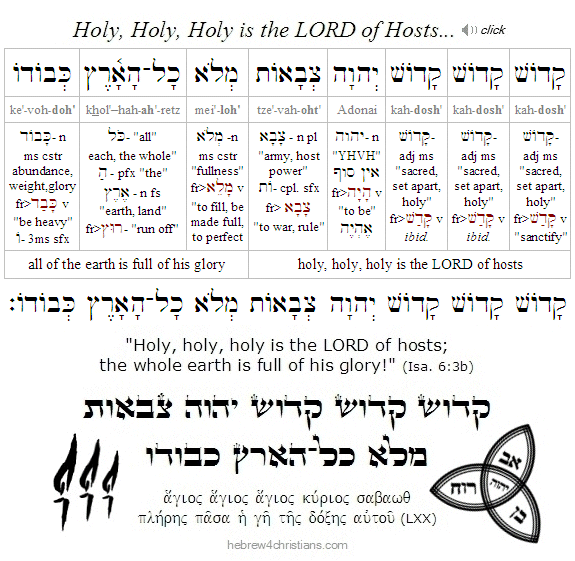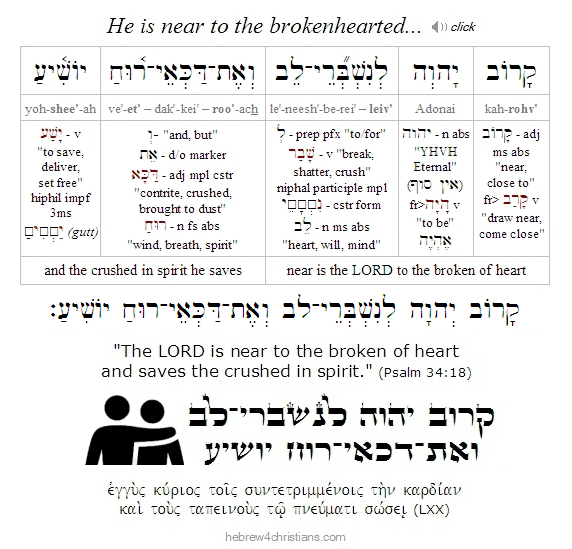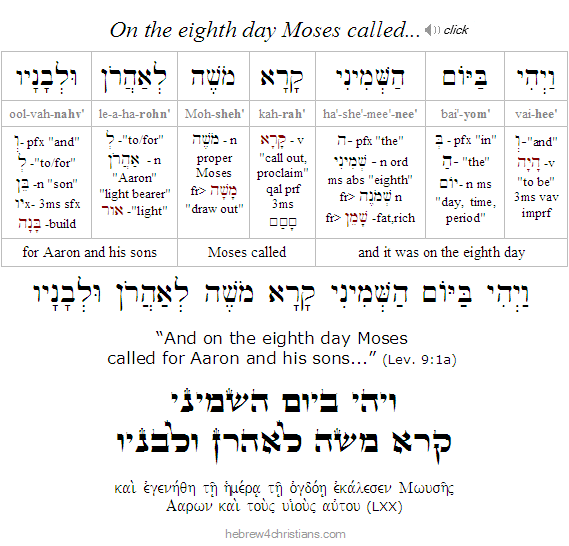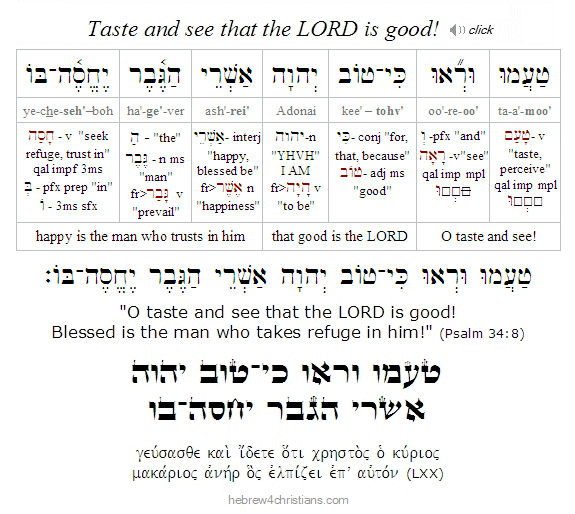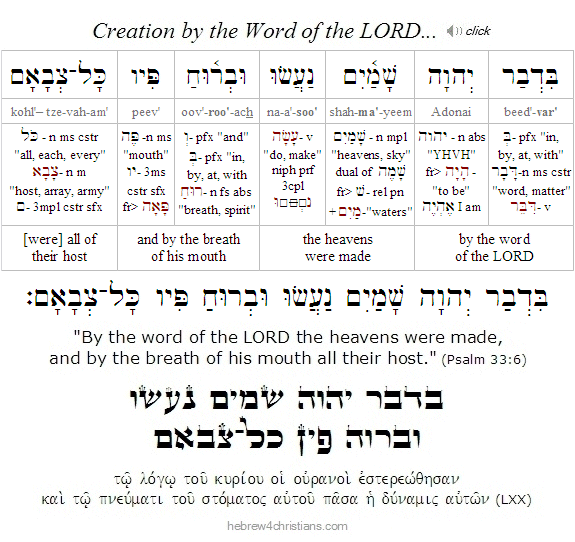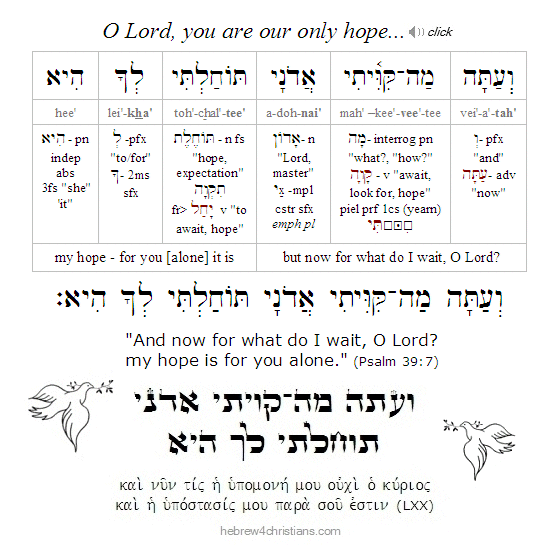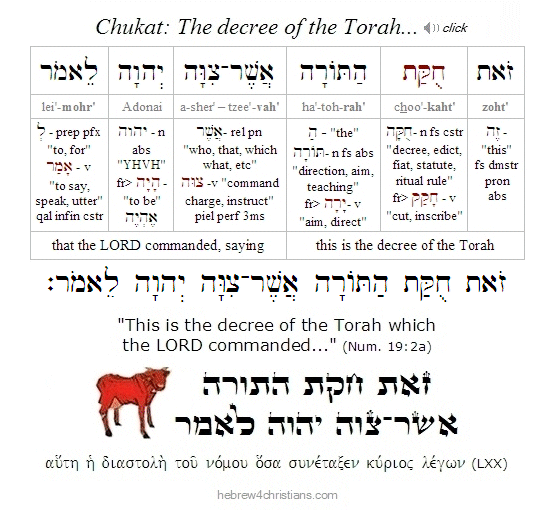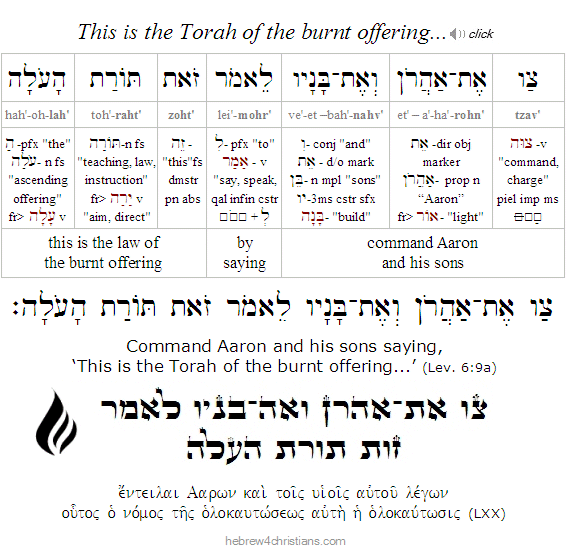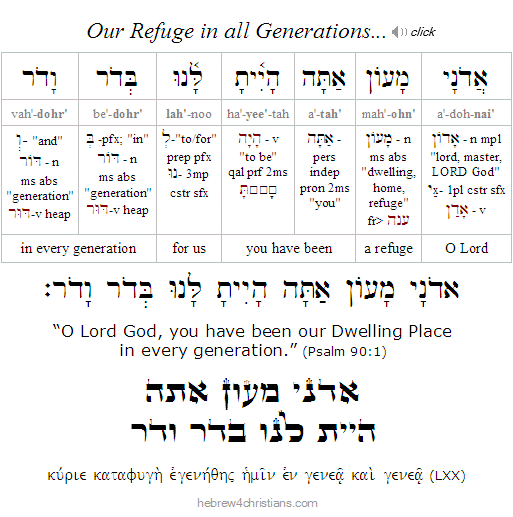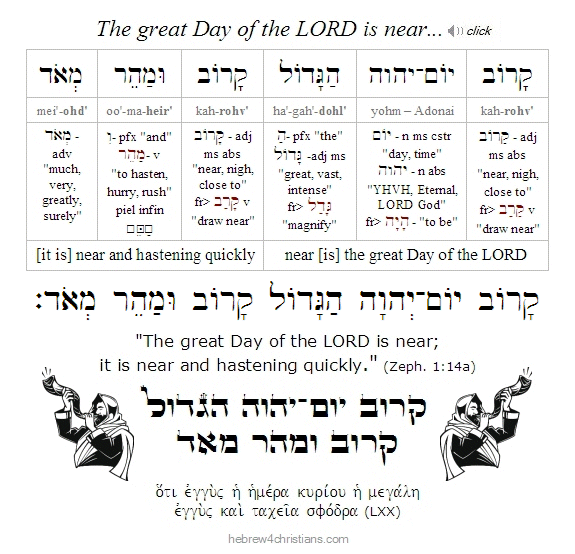|
Prayer Request (for site updates, see below)
I was laid off from my full-time job several years ago when -- after a lot of prayer, soul searching and discussion with my wife -- we decided to operate the Hebrew for Christians ministry entirely by faith in God's provision through the love and kindness of His people. I am not paid for doing this work, and therefore I ask you to consider supporting us. If you can help, please offer a donation or purchase some of the Hebrew study materials offered here. Encouraging other web sites to link here also helps us become more visible on the web. Above all, agree with us for the Lord's will to be done in our lives. Todah, chaverim.
  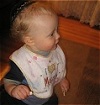 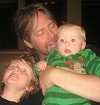 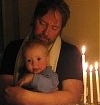
Note: My wife and I have have three young children (Josiah, Judah, and Emanuel David ). The LORD has graciously provided for us as Adonai Yireh (יְהוָה יִרְאֶה), "the One who sees [our need]." We are living one day at a time by the grace and mercy of God, and I want to publicly praise Yeshua and acknowledge His faithful love in caring for my family -- despite the trials during this time. The LORD God of Israel is faithful and true! And to those of you who have sent us a word of encouragement or donation during this difficult time, please accept our heartfelt appreciation! Your chesed truly helps sustain us.
יהי שׁם יהוה מברך - "May the Name of the Lord be blessed."
 |
 |
Jewish Holiday Calendar
Note: For site updates, please scroll past this entry....
The Torah divides the calendar into two symmetrical halves: the Spring and the Fall, indicating the two advents of Messiah. The Biblical year officially begins during the month of the Passover from Egypt (called Rosh Chodashim, see Exod. 12:2), and the spring holidays of Passover, Unleavened Bread, and Firstfruits both recall our deliverance from Egypt and also our greater deliverance given by means of the death, burial, and resurrection of the Messiah, the great Passover Lamb of God. The holiday of Shavuot (i.e., "Pentecost") both commemorates the revelation of the Torah at Sinai as well as the revelation of the Ruach HaKodesh (Holy Spirit) at Zion, in fulfillment of the promise given by our Lord....
The intermediate months of summer end with the advent of the sixth month of the calendar, the month of Elul, which recalls the time Moses interceded on behalf of Israel after the sin of the Golden Calf. To commemorate this time of our history, we likewise focus on teshuvah (repentance) in anticipation of Rosh Hashanah and especially in anticipation of Yom Kippur, the great "Day of Atonement." In Jewish tradition the 30 days of Elul are combined with the first ten days of the seventh month (called the "Days of Awe") to set apart "Forty Days of Teshuvah" leading up to the Day of Forgiveness for Israel. Immediately following Yom Kippur, the mood changes as we begin preparing for a joyous week-long celebration called Sukkot (i.e., "Tabernacles") that concludes with the holiday of Simchat Torah.
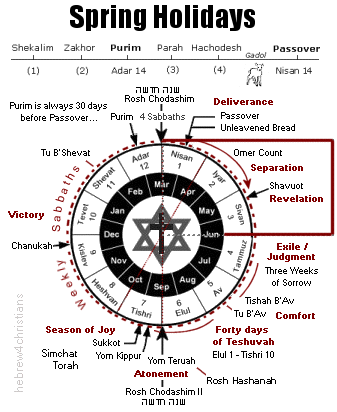 |
The Spring Holidays:
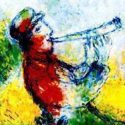
"This month (i.e., the month of Nisan in the spring) shall be for you the beginning of months (i.e., rosh chodashim: רֹאשׁ חֳדָשִׁים). It shall be the first month of the year for you" (Exodus 12:2). When the Lord said the month of Nisan 1 marked the "beginning of the year" (החודש הראשון של השנה), he was saying that all the other holidays were to be understood in relation to it. It is therefore called "Chodesh Ha'yeshuah" (חודש הישועה), the "Month of Salvation."
The Spring holidays (חגי האביב) then provide a portrait of the death, burial, and resurrection of the Messiah: Yeshua was crucified on erev Pesach (during the time of the sacrifice of the Passover lambs), buried during Chag Hamotzi (the festival of Unleavened Bread), and was resurrected from the dead on Yom Habikkurim (the Day of Firstfruits). Fifty days after Passover, on the climactic holiday of Shavuot (i.e., the feast of Pentecost), the Ruach HaKodesh (Holy Spirit) fell on the believers in fulfillment of the promise given by our Lord. Note that the giving of the Holy Spirit occurred precisely according to the calendar countdown given in the Torah (Lev. 23:15-16), and that it occurred after the resurrection of Yeshua -- just as our Messiah foretold (John 16:7; Acts 1:6-8, 2:1-4). This proves that the feasts of the LORD (מוֹעדי יהוה) were not abolished after the crucifixion. The meaning of the gospel is prefigured in the holidays given in Torah. See Luke 24:27, 24:44; John 5:46; Acts 26:22, etc.
![Spring Holiday Timeline (H4C]](../../About_HFC/Site_News/roshchodeshim-line.gif) |
Kindly note that in accordance with both Torah and Jewish tradition, the following holiday dates begin at sundown (ויהי־ערב ויהי־בקר; Gen. 1:5):
- Month of Adar II (Sat. March 9th [eve]) - Mon. April 8th [day])
Dates for Passover Week 2024:
Free Seder Guide
- Month of Nisan (Mon. April 8th [eve] - Tues. May 7th [day])
- Month of Iyyar (Tues. May 7th [eve] - Thurs. June 6th [day])
- Month of Sivan (Thurs. June 6th [eve] - Sun. June 18th [day])
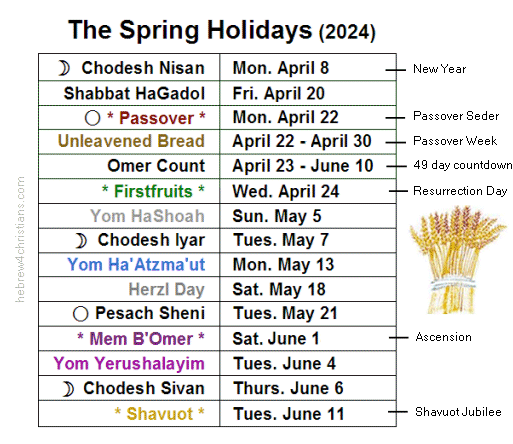 |
Note: For more information, see the Calendar Pages....
April 2024 Site Updates
Note: If any page content appears to be missing, please refresh the page...
Taking Passover Personally...
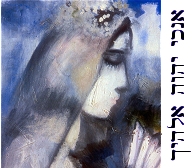
[ The great holiday of Passover begins Monday, April 22 at sundown... ]
04.17.24 (Nisan 9, 5784) The message of Passover applies to each of us: Dor va'dor: "In each and every generation an individual should look upon him or herself as if he or she (personally) had left Egypt." Indeed the very First Commandment is to accept the reality of your personal deliverance by the LORD: "I am the LORD your God, who brought you (singular) out of the land of Egypt, out of the house of slavery" (Exod. 20:2).
Note that the Hebrew word "Egypt" is mitzraim (מצרים), a word that means "prison, enclosure, or straights," from the verb tzur (צוּר) meaning "to bind or confine" (the Yiddish word tsuris, "trouble," comes from the same root). On the other hand, the Hebrew word for salvation is yeshuah (ישועה), from a root (יָשַׁע) that means "to wide," to "release from constraint," to deliver or set free. Amen, Yeshua (ישׁוע) sets us free from sin and death.
It is noteworthy that God began the Ten Commandments by identifying Himself as our Redeemer and Deliverer rather than as our Creator, because the very purpose of creation is to be set free by means of God's redemptive love given through Yeshua, the "Lamb slain from the foundation of the world" (Rev. 13:8; 1 Pet. 1:18-20; Eph. 1:4; 2 Tim. 1:9). Amen. The book of Genesis is the context to the story of the Exodus. A blessed Passover Season to you, friends...
Hebrew Lesson
Exodus 20:2 reading (click):
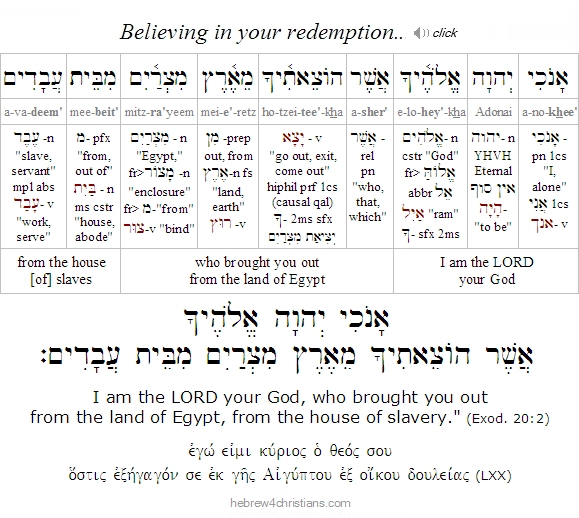 |
Our Broken Matzah...
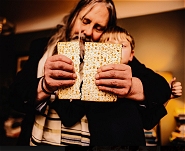
[ The major holiday of Passover begins Monday, April 22nd at sundown this year... ]
04.16.24 (Nisan 8, 5784) During the Passover Seder, three matzahs are placed on the table, said to represent Abraham, Isaac and Jacob, respectively. During the "Yachatz" step of the seder, the middle matzah (representing Isaac) will be broken to recall how Isaac was sacrificed in obedience to his father, foreshadowing the sacrifice of Yeshua by God the Father. Indeed, the Talmud states, "We break the middle matzah in tribute to Yitzchak (Isaac), who accepted the sins of the people upon himself" (Shabbos 89b). The smaller half of this broken matzah will be eaten later during the Motzi Matzah step, while the larger half will be eaten during the "Afikomen" step, near the end of the night...
In Hebrew, the middle of something is it's heart - the heart of the heavens, the heart of the earth, the heart of the sea, the heart of a person... Since the offering of Isaac by Abraham foretold of the greater offering of Yeshua by God Himself, when we break the middle matzah, then, we recall the broken heart of God over the pain Yeshua endured by taking our sins upon Him at the cross...."For our sake he made him to be sin who knew no sin, so that in him we might become the righteousness of God" (2 Cor. 5:21).
During his Passover seder with his disciples, Yeshua "took matzah, and after blessing it broke it and gave it to the disciples, and said, "Take, eat; this is my body" (Matt. 26:26). Since Yeshua did this while they were eating dinner, the matzah he broke would have been the Afikomen, thereby making the connection between the hidden bread (lechem ha-nistar) that would be broken given for our deliverance. The matzah we eat during Passover is called lechem oni (לֶחֶם ענִי) - "the bread of [His] suffering" - and eating the Bread of Life that was "broken for us" remembers ish makhovot, the man of sorrows, the suffering of our LORD...
Hebrew Lesson
Deut. 16:3b Hebrew reading:
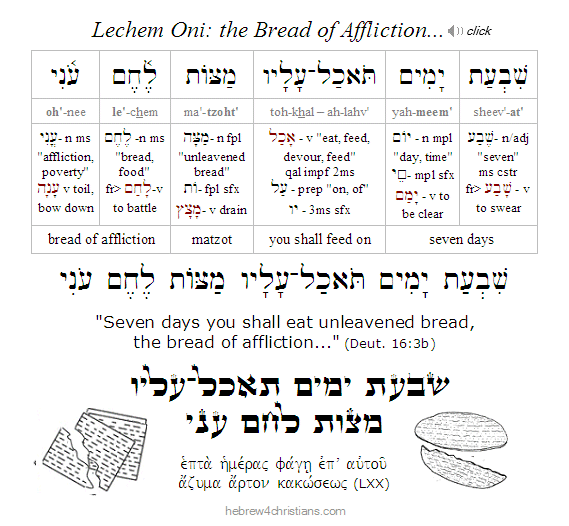 |
Immersion into the Waters...
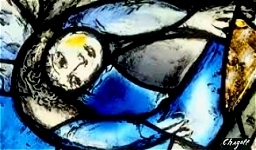
04.16.24 (Nisan 8, 5784) The ancient philosopher Heraclitus of Ephesus (6th century BC) observed the "fluidity of life" by famously observing that "panta rhei" (Πάντα ῥεῖ), "all things flow." You can't step into the same river twice, he said, because it has already moved on. Raw experience reveals a world that is finite, fluid, and constantly "moving" - like a mysterious river - whereas reflective reason discerns an underlying order that is eternal, timeless, rational, and stable. This image presents the paradox of change, or the philosophical problem of how something can both change and yet be the same thing. For example, you regard yourself as the same person you were when you were a young child, and yet your physical body has changed considerably, and indeed, the cells of your physical body cyclically die yet replicate over time. What about you has remained the same despite all the changes of your past?
Heraclitus further noted that while life was marked by constant change, there is an underlying principle of reason called the "logos" (ΛΟΓΟΣ) that serves to unify experience and that holds all things together. The dualistic separation of the real from the ideal was later incorporated into Plato's theory of "forms" (εἶδος) and Aristotle's theory of universals.... For us the unchanging is the Word of the LORD God and the soul created in his image and likeness.
People subconsciously fear change because it either represents the unknown behind the change, or because it represents decay, dissolution, and death. In the 1991 movie Shadows and Fog, the lead character Kleinman remarks about a sudden change in the weather by voicing Heraclitus' observation: "Everything's always moving all the time. Everything's constantly in motion -- so it's no wonder that I'm nauseous...."
Some people experience anxiety because they feel powerless in the face of change, so they "compensate" by trying to hold on to what cannot be held: "All the desires of this world are like rays of light. You try to catch them in your hand only to find there is nothing in your grasp." Nonetheless, the heart wants life to be both real and yet unchangingly ideal, and the soul yearns for loving relationships that will not be drowned by the inevitable flow of time. In light of this deep inner conflict, the existential question we must face is whether we will "agree" to let go and trust the flow of life, or whether we will protest by demanding our own "heaven" in the here and now. Will we accept life on life's terms, or on our own? Honoring the flow of life is to honor the Father's will for us, to let go of our dread (i.e., our craving for temporal security) by trusting in His sovereign plan for all of life. We overcome anxiety by trusting that God is in the "midst of the whirlwind" of change and is supervising the end of all things according to his good and perfect purposes (Rom. 8:28).
We must first look to the Eternal to see the finite; we must look upward before we look downward. Jesus walked on the water and then calmed the raging storm of life. Only God can give us safe passage through the shadowy and threatening transience of this world. As we contemplate God's Eternality and power, we realize the wonder and sanctity of our short time here. The Eternal is our refuge, our "dwelling place," in all generations, and that means in the present generation as well, on the other side of fleeting appearances of this world. When we pray to God as Avinu She-bashamayim, "Our Father in Heaven," we are calling to the One (שֶׁ) who is in (בּ) the midst of the waters (שָׁמָיִם) of Life.
Hebrew Lesson
Psalm 46:1-2 reading (click):
Our Lord Yeshua spoke of "living water" (מַיִם חַיִּים), or an inward flow that would well up within the heart through the agency of the Spirit of Life: "Whoever believes in me, as the Scripture has said, 'Out of his heart will flow rivers of living water'" (John 7:38). The image that spiritual life is like a flowing river is also found in the Book of Revelation, where the "river of the water of life" flows out from the Throne of God to nourish the Tree of Life (עֵץ חַיִּים) in midst of the paradise of God (Rev. 22:1-2).
The psalmist says (Psalm 118:17): "I shall not die but live." Rabbi Yitzchak said, in order really to live you must give yourself to death, but when you have done so, you discover that you are not to die, but to live. "Giving yourself to death" here means surrendering to God's will, accepting the yoke of heaven, and trusting in His governing "flow" over all of creation. This is the deeper meaning of "baptism" as we are immersed into God's care for our lives. Kierkegaard makes a similar point by saying that only after we have undergone "infinite resignation," that is, only after we have died upon the altar within our heart are we able to be reborn to take hold of reality. "Unless a seed of wheat falls into the earth and dies, it remains alone, but if it dies, it bears much fruit" (John 12:24).
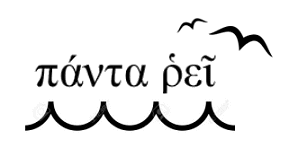 |
 |
The Leper Messiah...
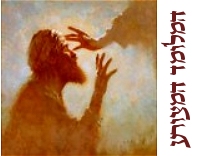
[ The following is related to our Torah reading for this week, parashat Metzora... ]
04.15.24 (Nisan 7, 5784) "The Messiah -- what is his name?... The sages say, the Leper Scholar..." (Sanhedrin 98b). But how was it that Yeshua was able to touch the metzora ("leper") and yet remain clean himself (Matt 8:1-4)? Only because He is the LORD (יהוה), the true Healer. Just as Yeshua spoke with greater authority than Moses (Matt. 5:21-48), so He was able to do what Moses (and those under the Levitical system of worship) could not do -- namely, reach down in compassion and take away the uncleanness from our lives.... Yeshua's blood creates the "waters of separation" (מֵי נִדָּה). He is the fulfillment of the "Red Heifer" sacrifice. Only Yeshua enters the "leper colony" of humanity and takes away our tzara'at (sin) by becoming ish machovot (אישׁ מַכְאבוֹת), a leper Himself, the Just for the Unjust, that He might make us acceptable before the LORD.
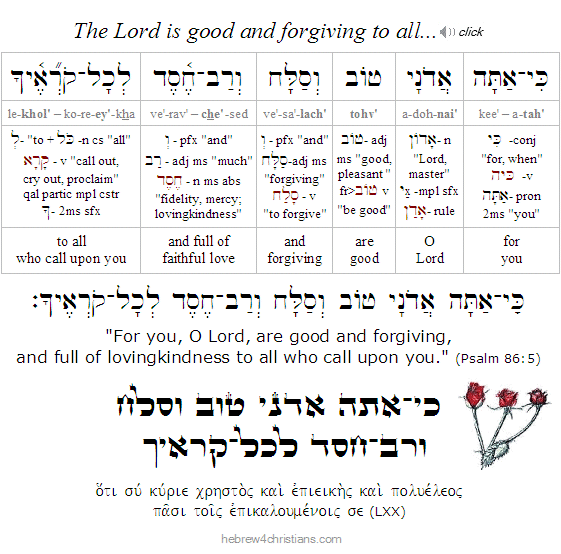 |
Just as a body can become sick with illness, so can the soul: "I said, 'O LORD, be gracious to me; heal my soul (רְפָאָה נַפְשִׁי), for I have sinned against you!'" (Psalm 41:4). If you feel your sins biting you, and your heart is wavering and beginning to tremble, take your place on the outside of the camp, where the lepers are standing, for they are the ones for whom the Gospel is intended.... Yeshua enters the leper colony to touch the leper. He seeks and saves the lost. The message of God's love and forgiveness is received only by those who understand how much they need it, to the self-confessed lepers of the soul... The gospel is sure remedy for the sick, not the healthy; it is for the sinner, not the saint. For those who accept Yeshua as their Redeemer, sin is turned right through the pain He bore on the cross, and forgiveness is a matter of sheer grace, not merit. There is joy in heaven for one sinner who turns to God in repentance, and this implies that every time you go to the LORD in your brokenness, in the truth of your need for Him, He will receive you with divine happiness.
 |
Broken of Heart...
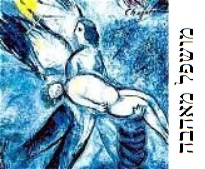
04.15.24 (Nisan 7, 5784) Who among us has not tasted the anguish of heart that attends our sinful condition? Who has not felt the sting of desperation revealed in our lost estate? But how can we be found if we do not believe we are lost? How can we be healed if we think we have no sickness? (Matt. 9:12).
A.W. Tozer once said, "It is doubtful whether God can bless a man greatly until he has hurt him deeply." Likewise Alan Redpath once wrote, "When God wants to do an impossible task, He takes an impossible individual – and crushes him." These are seeingly scandalous words; they speak a severe mercy. "Blessed are they that mourn" (Matt. 5:4).
This seems to be the divine pattern. "Truly, truly, I say to you, unless a grain of wheat falls into the earth and dies, it remains alone; but if it dies, it bears much fruit" (John 12:24). The hard "outer shell" of the seed must be broken so that the life of the Spirit can come through... Plainly put, God (and only God) can "deconstruct" the self so that life's priorities, focus, and passions are redirected to Him alone, the true Source of life and blessing.
The Lord is near to the nishbar lev, the one with a broken heart. The Hebrew word "lev" (לב) metaphorically refers to our inner life, that is, our affections, mind, and will. This is revealed in the letters of the Hebrew word itself: the Lamed (ל) depicts a "staff" used to direct something (i.e., the will), and the Bet (בּ) depicts the "house" of the physical body. Lev then represents our inner life of thought and feeling expressed in our actions. Those who are broken in heart – the nishberei lev – have discovered that they cannot control their own lives, that they are inwardly "shattered," and therefore need divine help. Contrary to conventional wisdom, God helps those who cannot help themselves; He singularly prefers to use broken vessels in His service (Psalm 51:19). As Tozer also wrote, "Beware of any Christian leader who does not walk with a limp."
There is parallelism in this verse. Both lev (לֵב) and ruach (רוּחַ) denote man's will and thoughts (Josh. 2:11; Deut. 2:30). Both the "broken of heart" and the "crushed in spirit" – dakkei ruach – refer to those who need God's deliverance (i.e., יְשׁוּעָה, yeshuah). The word translated "saves" (yoshia) connotes the idea of "making room" from what distresses us. Salvation is freedom from what oppresses and constricts our inward life. In that sense, God saves us from ourselves – from the chaos of the carnal ego trying to run our own lives.
The LORD is "near" -- karov -- to the broken of heart. This adverb means "close enough to touch." The same root is used for the word korban (קָרְבָּן), a sacrificial offering that draws us near to God, as well as karov (קָרוֹב), a near kinsman. The Lord is near to the nishbar lev, the one with a broken heart; he understands the grief of living in a fallen world.
The point of our brokenness is to draw us to God for healing: "The LORD heals the broken in heart and binds up their wounds" (Psalm 147:3). Yeshua came to "bind up the broken of heart (nishberei lev), to proclaim liberty to the captives, and the opening of the prison to those who are bound" (Isa. 61:1). God is merciful and redemptive in His afflictions: "He shall not break even a bruised reed, nor snuff out even a smoldering wick. He shall bring forth the true way" (Isa. 42:3). Affliction is a means of teaching us what we really need....
Yeshua is the healer of the broken heart and the Savior of those who are crushed in spirit. Blessed be His Name forever...
Shabbat Hagadol:
The Sabbath before Passover...
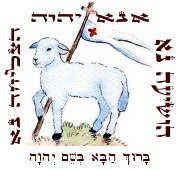
[ The holiday of Passover begins Monday, April 22nd at sundown... ]
04.15.24 (Nisan 7, 5784) The Sabbath that immediately precedes the festival of Passover is called the "Great Sabbath" (i.e., Shabbat HaGadol: שבת הגדול), in honor of the time when the first generation set aside the lamb for the Passover Sacrifice (i.e., korban Pesach: קרבן פסח).
During the time of the Temple it was customary to obtain the Korban Pesach (i.e., Passover lamb) four days before Passover so that worshipers could make sure that their lambs had no blemishes which would preclude them from being offered as sacrifices. This was done to fulfill the instructions given in Exodus 12 that the lamb for Passover be "without spot or blemish." Interestingly, this period of time allowed time for each family to become personally attached to their lamb, so that it would no longer simply be "a lamb" (Exod. 12:3) but rather their lamb" (Exod. 12:5). Indeed the Torah refers to "the" Lamb of God, as if there was only one: "You shall keep it [i.e., the Passover lamb] until the fourteenth day of this month, when the whole assembly of the congregation of Israel shall slaughter him (אתוֹ) at twilight (Exod. 12:6). Note that the direct object "him" (i.e., oto) can be read as Aleph-Tav (את) combined with the letter Vav (ו), signifying the Son of Man who is First and Last.
![Spring Holiday Timeline (H4C]](../../About_HFC/Site_News/shabbathagaolline.gif) |
Shabbat HaGadol foreshadowed the offering of Yeshua as the "Lamb of God" who takes away the sins of the world. The New Testament notes that it was a few days before Passover when Yeshua made His triumphant entry into Jerusalem riding on a donkey, signifying His Messiahship, in fulfillment of the prophecy of Zechariah: "Rejoice greatly, O daughter of Zion! Shout aloud, O daughter of Jerusalem! Behold, your king is coming to you; righteous and having salvation is he, humble and mounted on a donkey, on a colt, the foal of a donkey" (Zech. 9:9). During this time, when the pilgrims had come to select the lamb for the Passover sacrifice - they saw Yeshua and cried out: hoshiah na (הושׁיעה נא), meaning "please save" or "save now" (in English this phrase was translated from the Latin to form "Hosanna!"). The people spontaneously began singing Psalm 118:25-26 in anticipation of the fulfillment of the great Messianic hope:
אָנּא יְהוָה הוֹשִׁיעָה נָּא
אָנָּא יְהוָה הַצְלִיחָה נָּא
בָּרוּךְ הַבָּא בְּשֵׁם יְהוָה
בֵּרַכְנוּכֶם מִבֵּית יְהוָה
ah·nah · Adonai · hoh·shee·ah · nah
ah·nah · Adonai · hatz·lee·chah · nah
bah·rookh · ha·bah · be·shem · Adonai
be·rakh·noo·khem · mee·beit · Adonai

"Please, LORD save us! Please, LORD prosper us!
Blessed is He who comes in the Name of the LORD
We bless you from the house of the LORD."
(Psalm 118:25-26)
Hebrew Study Card
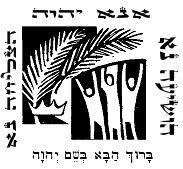
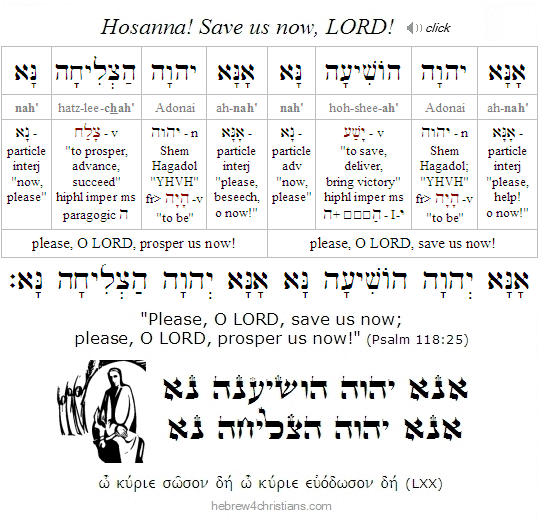
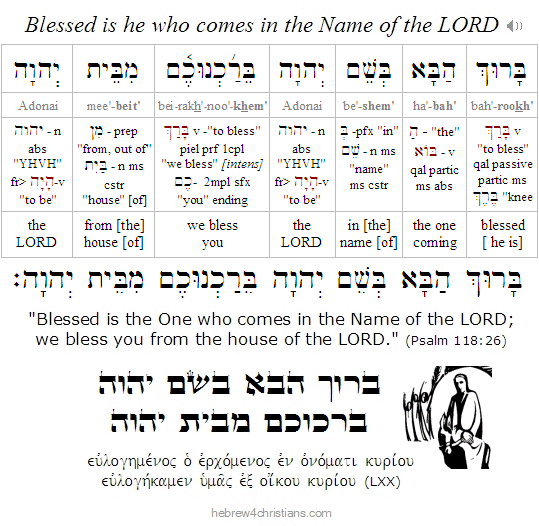
The Haftarah for Shabbat HaGadol (i.e., Malachi 3:4-24) foretells of Yom Adonai (יוֹם יהוה), the great Day of the LORD, and the return of Yeshua as Mashiach ben David. May that day come soon, chaverim. For more information, click here.
Note: Passover begins Monday, April 22nd this year, with the seder beginning approximately 18 minutes before sundown. With only a week before Passover, time is running out to begin preparing for your seder! To help you get started, I have created a free Seder Guide you can download here. Let's keep the feast, chaverim! (1 Cor. 5:7-8).
Cleansing of the Leper:
Parashat Metzora...
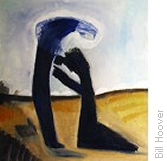
04.14.24 (Nisan 6, 5784) Shalom chaverim. Recall from last week's Torah reading (i.e., Tazria) that if someone was diagnosed with tzara'at (i.e., "leprosy"), they were forced to live in a state of exile. The afflicted person (called a "metzora") tore his clothes like a mourner, put a shroud over his face, and remained alone. If anyone came near, the person would cry out: "Unclean! Unclean! Stay away! Do not become impure because of me!" While so isolated, the person would have opportunity to perform teshuvah (repentance) and to reexamine his relationship with God.
In our Torah portion for this week (i.e., Metzora), we learn about the laws for cleansing "lepers" (i.e., metzorim). If the one suffering from tzara'at (i.e., the metzora) had apparently been healed, he would first call for the priest to be officially reexamined. If the priest saw no sign of tumah (uncleanness), a second examination was scheduled seven days later, and if at that time there was no further sign of disease, the process of tahara (purification) would begin.
The purification process was somewhat elaborate: After the second examination, the priest required that the metzora bring the following items for his cleansing:
- An earthenware bowl filled with spring water (mayim chayim)
- Two birds of the same type (whether turtledoves or pigeons)
- A stick of cedar wood
- A hyssop branch
- A scarlet thread
The priest then commanded that one of the birds should be slaughtered over the earthen vessel filled with fresh water, with its blood mixing with the water. The living bird, the piece of cedar, and the hyssop branch were then tied together using the scarlet thread, and the entire bundle was dipped into the earthen vessel. The blood and water mixture was then sprinkled seven times on the healed metzora, and the living bird was then set free.
Next, the healed person washed his clothes, shaved off all his hair (including his eyebrows), and bathed in a mikveh (ritual pool for cleansing). After that he could return to the camp - but he could not return to his home for another seven days. On the eighth day he would bathe again and offer several offerings (a chatat, an asham, an olah, and a minchah), but the blood from the asham (guilt) offering was mixed with oil and applied to his earlobe, thumb and foot, similar to the blood applied to the priests during their ordination. Oil from a meal offering was sprinkled seven times in the direction of the Sanctuary. Only after all this was he pronounced tahor (clean) by the priest. His life of uncleanness would be over, and he would be like a man who was brought back from the dead to new life.
This purification ritual corresponded with other rituals revealed in the Torah. The sprinkling of the hyssop by the priest recalled both the blood of the Passover lamb and the sprinkling of the ashes of the Red Heifer that cleanse from contact with death; the offering made of the two birds - one which was sacrificed and the other set free - recalled the scapegoat of the Yom Kippur ritual. The washing of garments, the shaving of all hair, and the immersion in a mikveh recalled the birth of the Jewish people at the Sea of Reeds. The blood of the guilt offering applied to the earlobe, thumb and foot, recalled the dedication of Aaron and his sons as the priests of Israel (Lev. 14:14). In other words, the individual purification process mirrored the purification of the community of Israel, and healing ultimately meant being re-identified as a redeemed child of God. In a very literal sense, then, we see how the metzora was "reborn" by water and by the blood (John 3:5; 19:34; Heb. 9:19).
Centrality of the Lamb...
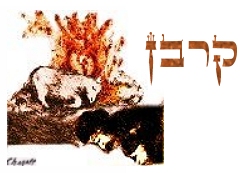
04.12.24 (Nisan 4, 5784) The goal of the great Sinai revelation was not to simply impart a set of moral or social laws, but rather to "accommodate" the Divine Presence in the midst of the people. This is not to suggest that the various laws and decrees given to Israel were unimportant, of course, since they reflect the holy character and moral will of God. Nonetheless, the climax of the revelation of the Torah - its goal or purpose or "end" - was the revelation of the altar which prefigured the sacrificial work of the Lamb of God. Indeed, the central sacrifice upon this altar was the daily sacrifice (i.e., korban tamid: קָרְבַּן תָּמִיד) of a defect-free male lamb with unleavened bread and wine, one lamb offered in the morning, and another offered in the evening, so that at all times the lamb would be offered up to God. The LORD calls this "My offering, My bread..." (see Num. 28:1-8). In other words, the service and ministry of the Tabernacle constantly proclaimed the Passover Lamb of God that was offered up to deliver the faithful of Israel from the plague of death, and who would later be offered upon the cross to secure our eternal redemption (Heb. 9:11-12; 1 Cor. 5:7). The sacrifice of the lamb of God is therefore central to the meaning and purpose of the Torah.
The Talmud says "All the world was created for the Messiah" (Sanhedrin 98b). The Apostle Paul had earlier said the same thing: "All things were created by Him (i.e., Yeshua), and for Him" and in Him all things consist (συνεστηκεν, lit. "stick together") (Col. 1:16-17). Indeed, all of creation is being constantly upheld by the word of the Messiah's power (Heb. 1:3). Creation begins and ends with the redemptive love of God as manifested in the Person of Yeshua our LORD... The Messiah is the Center of Creation - its beginning and end. As it is written: אָנכִי אָלֶף וְתָו רִאשׁוֹן וְאַחֲרוֹן ראשׁ וָסוֹף / "I am the 'Aleph' and the 'Tav,' the First and the Last, the Beginning and the End" (Rev. 22:13). "For from him and through him and to him are all things. To him be glory forever. Amen" (Rom. 11:36). In everything Yeshua has the preeminence (Col. 1:18), and his "work" is of first importance (1 Cor. 2:2, 1 Cor. 15:3-4). Yeshua our Messiah is called מֶלֶךְ מַלְכֵי הַמְּלָכִים / Melech Malchei Hamelachim: The "King of kings of kings." He is LORD of all possible worlds -- from the highest celestial glory to the dust of death upon a cross. Yehi shem Adonai mevorakh: "Let the Name of the LORD be blessed" forever and ever (Psalm 113:2). So while we can agree with the Talmud's general statement that the world was created for the Messiah, we would insist that the Messiah is none other than Yeshua, God's Son, and indeed, the Messiah could be no other...
Shabbat shalom, chaverim!
Hebrew Lesson:
Exodus 29:38 Hebrew reading:
Rest for your Soul...
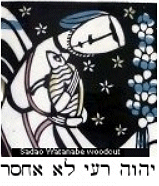
04.12.24 (Nisan 4, 5784) Yeshua says, "Come to me, all who labor and are heavy laden, and I will give you rest. Take my yoke upon you, and learn from me, for I am gentle and lowly in heart, and you will find rest for your souls" (Matt. 11:28-29). When he said, "Live in me, and I will live in you" (John 15:4), he didn't insist you first be found worthy or good; no, he set no other condition than that of trust: "Now are you clean through the word which I speak" (John 15:3). The separation is gone; God has made the way past your shame. You are invited to come, so come just as you are, come without delay, but come trusting that you are entirely welcome because of who Yeshua is and what he has done for you...
O Lord, help us to live the newness of life that you so graciously offer to us.... help us to come to you and receive your rest. Amen.
Hebrew Lesson
Isa. 30:15b reading (click):
Accepting True Freedom...
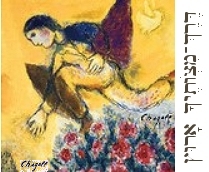
04.12.24 (Nisan 4, 5784) "If the Son shall set you free, you shall be free indeed" (John 8:36). The sages say, "Being free means that I am in the place I am supposed to be." In other words, freedom means surrendering, accepting, and yielding to God's path of blessing for you. This a place of great spiritual contentment where you are liberated from the slavery of fear and disappointment. Yeshua lived in this freedom, since He completely yielded Himself to His father's daily care (John 5:19; 8:29; 14:10).
Surrendering yourself to God's care is also the means of finding self-acceptance. God knows all your sins and has paid for them upon the cross, and therefore His love for you is the basis for which you can properly forgive and accept yourself... A Yiddish proverb reads, "If I try to be someone else, who then will be like me?" When you die, God won't ask why you weren't more like Moses, Elijah, etc., but rather, why you weren't more like the person He created you to be.
No one else can do the things you are called to do, and therefore God created you as a distinct individual who reflects His glory in a unique way... "To the one who conquers I will give a white stone, with a new name written on the stone that no one knows except the one who receives it" (Rev. 2:17). Those who follow Yeshua can intellectually understand and emotionally trust that God is working all things together for good in their lives (Rom. 8:28).
Hebrew Lesson
Psalm 103:13-14 reading (click):
Passover Shalom....
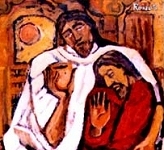
[ "Peace I leave with you, my peace I give unto you: not as the world giveth, give I unto you. Let not your heart be troubled, neither let it be afraid." - John 14:27 ]
04.11.24 (Nisan 3, 5784) We don't have to needlessly complicate the Passover Seder... After all, it is the foundation for what Christian tradition calls "communion" or "the Lord's Supper." In other words, don't "over think" how to do it correctly, but focus instead on its significance in terms of Yeshua and his suffering, death, and resurrection. If you have any guests over for the evening, focus on the people present rather than following any sort of script. Yes, the traditional Seder has 15 steps that we perform, but these are simply a guide to the greater end of retelling the story of our redemption. Reviewing the great story of God's deliverance in Messiah "sets the table" for the rest of the year, and re-frames our understanding of the meaning of the gospel message itself.
There are some questions about how Yeshua actually observed the (early) Passover Seder with his disciples, and it is a bit difficult reconstructing the order of his service because we are unsure of the exact customs of that time. It is likely, however, that as a Torah-true Jew he would have performed Kiddush for the holiday (i.e., the First Cup), which recalls how God set apart his people by delivering them from bondage in Egypt, and it is also likely that he would have begun the seder with dipping karpas into salt water, followed by the breaking of the matzah (yachatz). After this, he would have retold the story of the Exodus, though he would have explained its ultimate significance in his sacrificial role as the Lamb of God. It is therefore likely he would have blessed the "Cup of Deliverance" (i.e., the Second Cup) and then ate matzah with his disciples in accordance with the Torah's instruction (Exod. 12:15). The Passover meal itself would then be eaten.
After the meal, Yeshua would have taken the matzah that was broken during the "breaking" (or yachatz) step of the service and blessed it, giving it to the disciples as a symbol of his body that would be broken for them. He then would have taken up the third cup, called the "Cup of Redemption," and sanctified it as a memorial of his blood shed for the disciples' forgiveness. This is called the barech ("blessing") step of the traditional Seder.
Since the New Testament explicitly says that Yeshua took the bread and wine "after (the Passover) supper" (Luke 22:20, 1 Cor. 11:25) it is clear that third cup, the "Cup of Redemption," is the one He raised when He said, "This cup is the New Covenant in my blood, which is shed for you" (Matt. 26:27-39). The Cup of Redemption recalls both the shed blood of the innocent lamb offered as redemption from Egypt, but it more fully commemorates the greater redemption provided by the shed blood of Yeshua our Savior, the Lamb of God and the greater Exodus from slavery to sin (Luke 9:30-31). "Unless you eat the flesh of the Son of Man and drink His blood, you have no life in you" (John 6:53).
Finally, Yeshua's seder with his disciples would have ended with the "Hallel" (ההלל לפסח), a time of singing psalms and offering thanks to God. Note that it was directly after singing Hallel that Yeshua went out to the Mount of Olives where his passionate intercession took place and where he was later betrayed by Judas Iscariot and arrested (see Matt. 26:30-50).
There are additional details about doing a Seder given in the H4C Passover Seder Guide, but I hope this entry may suffice as a succinct overview. And it should be evident that anyone can joyfully celebrate the Passover with just a few basic items such as some cups, grape juice, some matzah, a plate to hold food, a simple water basin, a Bible, and so on (there is a simple list found in the Seder Guide). God loves the humble of heart.
Hebrew Lesson
Revelation 5:12 reading (click for audio):
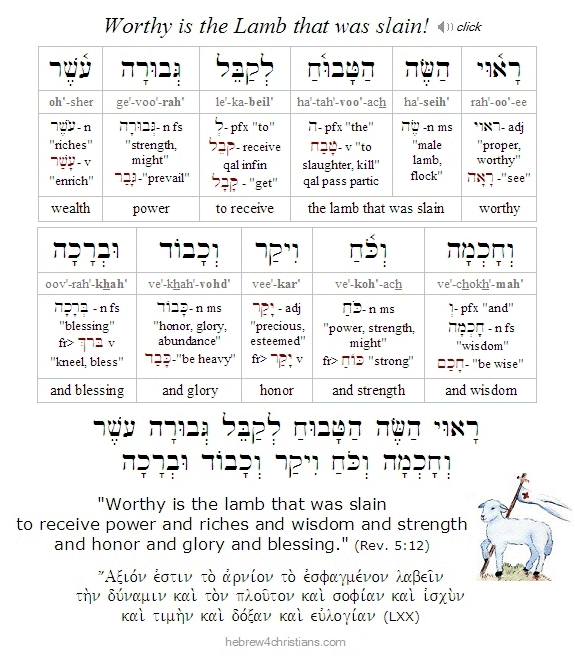 |
Note: I was hoping to make a revision of the Hebrew for Christians Seder Guide this year, focused on the Last Supper, but I simply ran out of time... Did you know that the largest portion of the Gospel of John is found in the "Upper Room" discourse of Yeshua with his disciples, on the night before he was betrayed? (John 14-18)? Yeshua's Seder was performed as the final expression of His mission as the Lamb of God, and it was observed a day earlier because Yeshua would offer Himself up as our Passover Lamb, sacrificed on the cross, at the very time the korban pesach (i.e., Passover sacrifice) was being made at the Temple.
The Appointed Time of Passover...
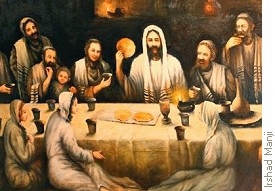
[ Shalom chaverim. You can download a free pdf of this post by clicking here... ]
04.11.24 (Nisan 3, 5784) The LORD is a God of order, and the appointed times (מוֹעֲדִים), or holidays, were designed and intended to reveal prophetic truth about him.
The first of all of the Biblical holidays (חגי תורה) is the appointed time of Passover (חג הפסח). On the first day of Nisan, two weeks before the Exodus, God showed Moses the new moon and commenced the divine calendar (Exod. 12:1-2). Two weeks later, the Israelites kept the Passover by daubing the blood of the lamb on their door posts (Exod. 12:6-7). At the stroke of midnight of Nisan 15 God sent the last of the ten plagues on the Egyptians, killing all their firstborn (Exod. 12:12). Israel then left Egypt and crossed the sea seven days later to begin their trek through the desert.
On the 6th of Sivan, exactly seven weeks after the Exodus, Moses ascended Sinai to receive the Torah (Shavuot). Forty days later, on the 17th of Tammuz, the tablets were broken. Moses then interceded for Israel for another forty days until he was called back up to Sinai on Elul 1 to receive the revelation of the Name (YHVH). After this, he was given the second tablets and returned to the camp on Tishri 10, a date that later was commemorated as Yom Kippur, or the "Day of Atonement." Later the holiday of Sukkot ("Tabernacles") was instituted to recall God's care for the people as they trekked through the desert en route to the promised land.
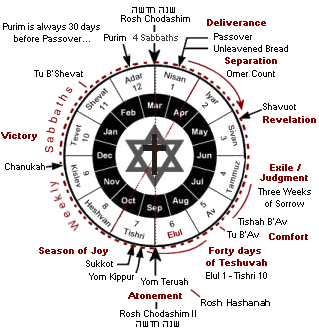 |
Beside the foretold visitation of the Messiah Yeshua to redeem Israel (Luke 2:25-32), the Exodus from Egypt (סיפור יציאת מצרים) is the most fundamental event of Jewish history. In addition to being commemorated every year during the appointed time of Passover (Exod. 12:24-27; Num. 9:2-3; Deut. 16:1), it is explicitly mentioned in the very first of the Ten Commandments (Exod. 20:2), and it is recalled during Kiddush every Sabbath day (Deut. 5:12-15). The festivals of Shavuot ("Pentecost") and Sukkot ("Tabernacles") derive from it (the former recalling the giving of the Torah at Sinai and the latter recalling God's care as the Exodus generation journeyed from Egypt to the Promised Land). Indeed, nearly every commandment of the Torah (including the laws of the Mishkan (i.e., "Tabernacle") and the sacrificial system) may be traced back to the story of the Exodus. Most importantly, the Exodus prefigures and exemplifies the work of redemption given through the sacrificial life of Yeshua the Messiah, the true King of the Jews and the great Lamb of God (שׂה האלהים).
In this connection note that the very first occurrence of the word "Torah" (תורה) in the Scriptures refers to the obedient faith of Abraham (Gen. 26:5), and the second occurrence refers to the law of Passover: "There shall be one law (תורה אחת) for the native and for the stranger who sojourns among you" (Exod. 12:49). There is a link between these two occurrences. Abraham lived before the time of the Exodus, of course, and therefore he obeyed the law of Passover by means of the Akedah (the sacrifice of his "only begotten" son Isaac). Despite offering his son up upon the altar at Moriah, Abraham believed in the LORD and it was credited to him as tzedakah (righteousness). Abraham's obedience revealed that the inner meaning of Torah is that the "righteous shall live by faith" (Hab. 2:4, Rom. 1:17). The Torah of Passover (תורת הפסח) likewise teaches that redemption from death is possible through the exchange of an innocent sacrificial victim. The blood of the Passover was "a sign" of imputed righteousness that was obtained entirely by faith. This is the "korban" principle of "life-for-life" that underlies the Torah of the sacrificial system of the Tabernacle as well.
Observing Passover is crucial for God's people. In the Torah we read: "And the LORD spoke to Moses in the desert of Sinai, in the first month (בַּחֹדֶשׁ הָרִאשׁוֹן) of the second year after they had come out of the land of Egypt, saying, 'Let the people of Israel keep the Passover at its appointed time. On the fourteenth day of this month, at twilight, you shall keep it at its appointed time; according to all its statutes and all its rules you shall keep it' (Num. 9:1-3).
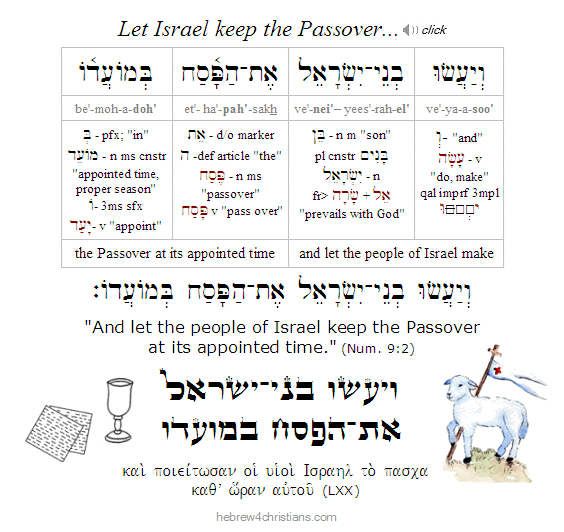 |
Ultimately all true Torah points to Yeshua, who is the divinely appointed Redeemer and the beginning and goal of all of creation... "When the fullness of time (τὸ πλήρωμα τοῦ χρόνου) had come, God sent forth his Son, born of woman, born under the Torah, to redeem those who were under the Torah, so that we might receive adoption as sons" (Gal. 4:4-5). As the psalmist later declared: "He made the moon for the appointed times" (Psalm 104:19). And since Yeshua came to perfectly fulfill the meaning of these appointed times, it is clear that he observed this calendar as well (Gal. 4:4-5).
Therefore, friends, let us keep the feast of Passover according to the appointed time of the LORD, namely, on the 14th day of the month of Nisan, the first month of the Biblical calendar, at twilight, as a time to be remembered and guarded for all generations (Exod. 12:42). As the Apostle Paul wrote: "Cleanse out the old leaven that you may be a new lump, as you really are unleavened. For Messiah our Passover Lamb has been sacrificed" (1 Cor. 5:7-8). Amen! Worthy is the Lamb who was slain!
Hebrew Lesson:
Psalm 104:19 reading (click):
Leprosy of Ingratitude...
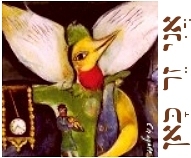
[ The following is related to our Torah reading this week, parashat Tazria... ]
04.10.24 (Nisan 2, 5784) Tazria, or "leprosy," is a spiritual sickness brought about by sinful thinking and faithlessness... In this connection Kierkegaard notes: "The gospel about the Ten Lepers (Luke 17:11-19) is about how the nine were healed of their leprosy – and then caught, so to speak, an even worse leprosy: their ingratitude and unthankfulness. Herein lies the difference between sickness of the body and sickness of the spirit." Ten metzorot (lepers) were healed in body, but only one was healed both in body and soul -- the "stranger" who recognized God's kindness and who made an effort to offer his thanks...
Hebrew Lesson:
Psalm 41:4 reading (click):
Purification and Healing...
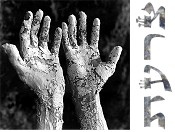
[ The following is related to our Torah reading for this week, parashat Tazria... ]
04.10.24 (Nisan 2, 5784) Our Torah portion for this week, parashat Tazria, continues the discussion of the laws of "purity" and "impurity" that began earlier with parashat Tzav. Of particular interest are certain afflictions, collectively called tzara'at (צארעת), that caused the affected person (or a thing) to be both ritually impure (tamei) and in a state of uncleanness (i.e., tumah: טומאה). Tzara'at was an a spiritual affliction (i.e., yisur: יסור) that could only be diagnosed by a kohen (priest) and not by a doctor... If someone was diagnosed with tzara'at, they were called a "metzora" (מצרע) and forced to live in a state of exile where they were instructed to do teshuvah (repentance) and seek spiritual healing.
The cleansing of a metzora (i.e., "leper") corresponded with other significant sacrificial rituals given in the Torah. The sprinkling of the hyssop by the priest recalled the blood of Passover; the offering made of the two birds - one which was sacrificed and the other set free - recalled the scapegoat of the Yom Kippur ritual. The washing of garments, the shaving of all hair, and the immersion in a mikveh (a pool of fresh water) recalled the birth of the Jewish people at the Sea of Reeds. Finally, the blood of the guilt offering sprinkled on the earlobe, thumb and foot, recalled the dedication of Aaron and his sons as the priests of Israel (Lev. 14:14). In other words, the individual purification process mirrored the purification of the community of Israel, and healing ultimately meant being re-identified as a redeemed child of God. In a very literal sense, then, we see how the metzora was "reborn" by water and by the blood (see John 3:5; 19:34; Heb. 9:19).
Of the Messiah it is written: "He is despised and rejected of men, a man of pains (אִישׁ מַכְאבוֹת) and acquainted with sickness (וִידוּעַ חלִי), and we hid as it were our faces from him. He was despised and we esteemed him not. Surely he has carried our sicknesses (חֳלָיֵנוּ) and borne our pains (מַכְאבֵינוּ), yet we esteemed him as plagued (נָגַע), smitten of God (מֻכֵּה אֱלהִים) and oppressed. But he was pierced (מְחלָל) for our transgressions (פְּשָׁעֵנוּ), he was crushed for our iniquities (עֲוֹנתֵינוּ): the discipline for our peace was upon him (מוּסַר שְׁלוֹמֵנוּ עָלָיו); and in his blows we are healed. All we like sheep have gone astray; we have turned every one to his own way, but the LORD has attacked in him (הִפְגִּיעַ בּוֹ) the iniquity of us all" (Isa. 53:3-6). Through the substitutionary sacrifice of the righteous Suffering Servant, Yeshua, we are both forgiven and made free from the power of sin and death. Because of Him we are no longer "lepers" or outcasts from the community of God but are made clean through His loving touch.
Notice that the word translated "blow" (i.e., חַבּוּרָה, "wound" or "stripe") comes from the same root as the word "friend" (חָבֵר), and therefore we can read this as "in His friendship we are healed." Yeshua gave up His life for us so that we could become his friends... As He later told us regarding his sacrifice: "Greater love has no one than this, that one lay down his life for his friends" (John 15:13). Indeed of Yeshua it may truly be said, Yesh ohev davek me'ach – "there is a friend who sticks (davek) closer than a brother" (Prov. 18:24).
Hebrew Lesson
Psalm 51:7 reading (click):
Note: For more on this subject, see the article: "Thoughts on Holiness."
Finding your Greatest Good...
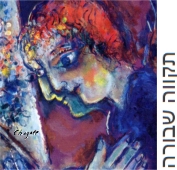
04.10.24 (Nisan 2, 5784) The heart (הלב) is the center of the will - the locus of desire, affection, and love... However, the heart itself must be constrained by wisdom (חוכמה), since unbridled desire is slavery to the lower nature (יצר הרע), as it says: "The righteousness of the upright will deliver them, but the faithless will be ensnared by their own desires" (Prov. 11:6).
The problem for many of us is having "disordered loves," that is, serving various idols of the heart that demand our attention yet divert us from what we really need. The difficultly is not so much that we indulge in lesser loves as much as we do not know the love of God that heals us and sets us free. As C.S. Lewis once said, "God cannot give us a happiness and peace apart from Himself, because it is not there. There is no such thing" (Mere Christianity). The righteous have found the most precious secret: "I shall behold your face in righteousness; when I awake, I shall be satisfied with your likeness" (Psalm 17:15).
It has been said that "there is nothing so whole as a broken heart." We become whole when we discover that the idols of our hearts do not truly satisfy us. Usually this involves "severe mercy" as we learn that what we thought we "needed" proved to be just another illusion... Then and only then can we begin to believe in and to accept God's love as our highest good. Such "perfect love" casts out the fear induced by the idols of the heart.
When we seek first the kingdom of God and His righteousness, the passions of our heart are ordered correctly. As it is also written in our Scriptures: "Delight yourself in the LORD, and he shall give you the desires of your heart. Commit your way to the LORD; trust also in him, and he will bring it to pass. And He shall bring forth your righteousness as the light, and your judgment as the noonday" (Psalm 37:4-6).
The Lord is near to the shavur lev (שבור לב), the one with a broken heart. The Hebrew word "lev" (לב) metaphorically refers to our inner life, that is, our affections, mind, and will. This is revealed in the letters of the Hebrew word itself: the Lamed (ל) depicts a "staff" used to direct something (i.e., the will), and the Bet (בּ) depicts the "house" of the physical body. Lev then represents our inner life of thought and feeling expressed in our actions. Those who are broken in heart – the nishberei lev (נִשְׁבְּרֵי־לֵב) – have discovered that they cannot control their own lives, that they are inwardly "shattered," and therefore they need divine help. Contrary to conventional wisdom, God helps those who cannot help themselves; He prefers to use broken vessels in His service (Psalm 51:19). As A.W. Tozer observed: "Beware of any Christian leader who does not walk with a limp."
Yeshua taught, "Blessed are the pure in heart, for they shall see God" (Matt. 5:8). As I've mentioned before, the Greek word translated "pure" is katharos (καθαρός), sometimes used describe the cleansing of a wound (catharsis), or to describe the unalloyed quality of a substance revealed through refining fire. Metaphorically, then, purity of heart refers to separation from the profane - singleness of vision, wholeheartedness, passion, and focused desire for the sacred.
Faith is a great trembling of love: "With this ring I do worship thee..." As we center our affections on Yeshua, we become pure in heart -- i.e., unified, made whole, and healed of our inner fragmentation. We see the Lord both in this world, through his effects, and then panim el panim (פָּנִים אֶל־פָּנִים), "face to face," in the world to come. Our hope purifies us for that coming great day of full disclosure (1 John 3:2-3; Heb. 12:14). That day is surely drawing near, friends.
Hebrew Lesson
Psalm 37:4 reading (click):
Passover Soul Searching...

[ The following is related to the theme of repentance before the holiday of Passover... ]
04.10.24 (Nisan 2, 5784) The search for chametz (חפש חמץ) before Passover may be likened to the soul searching we do before the High Holidays in the fall, when we take an inventory of our spiritual condition (חשבון נפש) and do teshuvah. The Torah instructs us to carefully search and remove sources of inner impurity so that we might experience the truth that we are a "new lump" - that is, a new substance that is purged from the sour and rotting influences of our past lives... And since Yeshua has been sacrificed as your Passover Lamb, you are indeed a new creation (בּריה חדשׁה) made "unleavened" (pure) by the power of the Holy Spirit (2 Cor. 5:17). Therefore you are likewise commanded put away the "old nature" (יצר הרע) and purge from your life the old influences that inwardly canker you and make you sick (Eph. 4:22; Col. 3:9). Walk without hypocrisy in the truth of the love of God for your soul.
חָקְרֵנִי אֵל וְדַע לְבָבִי
בְּחָנֵנִי וְדַע שַׂרְעַפָּי
וּרְאֵה אִם־דֶּרֶךְ־עֹצֶב בִּי
וּנְחֵנִי בְּדֶרֶךְ עוֹלָם
chohk·rei'·nee · el · ve·da · le·vah·vee
be·chah·nei'·nee · ve'da · sar·ah·pai
oor·eih · eem-de'·rekh-oh'·tzev · bee
oo·ne·chei'·nee · be·de'·rekh · oh·lam

"Search me, O God, and know my heart!
Test me and know my anxious thoughts!
And see if there be any idolatrous way in me,
and lead me in the way of eternity."
(Psalm 139:23-24)

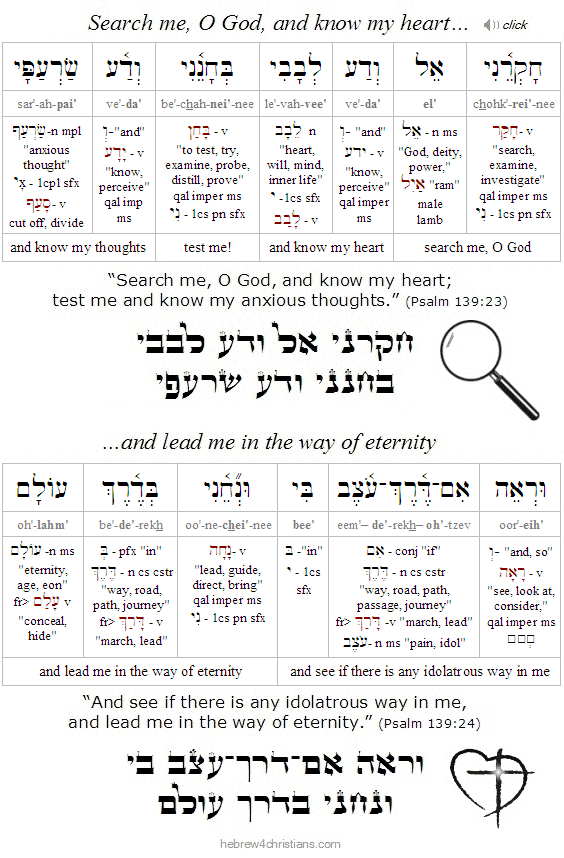
"Teshuvah" for a New Year...
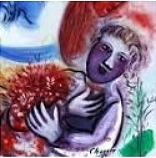
04.09.24 (Nisan 1, 5784) The central message of the Scriptures is to turn to God for life. Rabbi Sussya once said: "There are five verses in the bible that constitute the essence of the Torah. These verses begin in Hebrew with one of these letters: Tav (תּ), Shin (שׁ), Vav (ו), Bet (בּ), and Hey (ה), which form the word for repentance, "teshuvah" (תְּשׁובָה). The five verses are 1) Tamim tiheyeh (תָּמִים תִּהְיֶה): "Be wholehearted before God" (Deut. 18:13); 2) Shiviti Adonai (שִׁוִּיתִי יְהוָה): "I have set the LORD always before me" (Psalm 16:8); 3) Va'ahavta lere'akha (וְאָהַבְתָּ לְרֵעֲךָ): "Love your neighbor as yourself" (Lev. 19:18); 4) Bekhol derakekha (בְּכָל־דְּרָכֶיךָ): "In all your ways know Him" (Prov. 3:6); and 5) Higgid lekha (הִגִּיד לְךָ): "Walk humbly with your God" (Micah 6:8).
In other words, the way of teshuvah, of answering God's call for you to return to Him, is to wholeheartedly "set" the LORD before you (i.e., to believe), to respect others, and to know God's Presence as you walk in humility with Him....
Aren't you grateful that the Lord asks this of us -- and not some long litany of commandments to juggle? Do justice, love mercy, and walk humbly with God (Micah 6:8).
Hebrew Lesson
Micah 6:8 reading (click for audio):
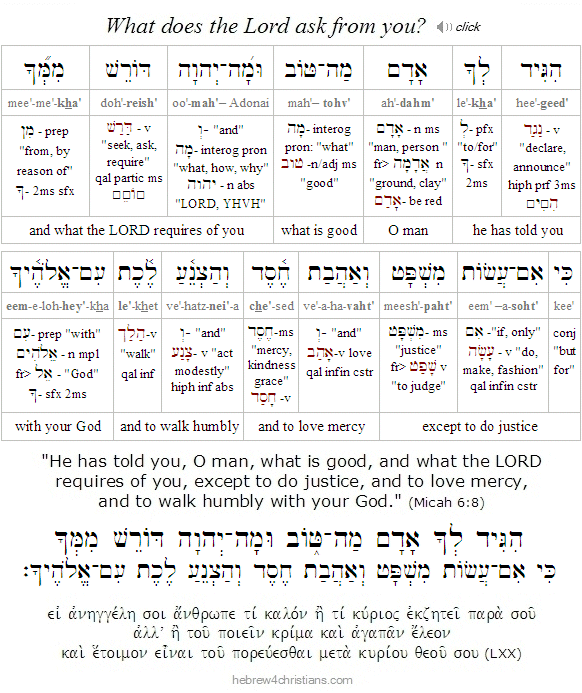 |
The Month of Deliverance...
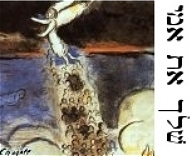
04.09.24 (Nisan 1, 5784) Are you discouraged by this evil world, chaverim? Do you sometimes utter the plaintive prayer: "O Lord, I know that you will help us; but will you help us before you will help us?" When things are dark and seemingly hopeless, it is tempting to yield to passivity and even to despair, but it is precisely then that our faith must rise up and become all the more emboldened. Faith in God's love is the victory (i.e., netzach: נֶצַח) that overcomes the world and its illusions (1 John 5:4). We must remember that the LORD is our Deliverer and Kinsman Redeemer (הַגּוֹאֵל), a "very present help" in our troubles.
The great Passover (חג הפסח הגדול במצרים) is all about the victory of God over the powers of darkness for the sake of our deliverance (יְשׁוּעָה). "Let my people go!" Indeed, the month of Nisan is called Chodesh ha-yeshuah (חדֶשׁ הַיְשׁוּעָה), the "month of the salvation," both in terms of remembering the physical deliverance from the political powers of Egypt, but more profoundly in terms of our spiritual deliverance given at Zion/Moriah through the Messiah. Chodesh ha-yeshuah can also be read as chadash ha-yeshuah, "the new (חָדָשׁ) salvation," suggesting the new covenant power we are given in the Messiah. We wrestle not against flesh and blood, chaverim, but against hidden powers of darkness that seek to enslave us as Pharaoh did of old (Eph. 6:12). But thanks be to God who gives us the victory (netzach, salvation) through our Lord Yeshua the Messiah (1 Cor. 15:57).
Passover is really a month-long celebration. Over and over it is referred to as the "month of spring" (חדֶשׁ הָאָבִיב), the "month of redemption," the month of Nisan, and so on. The word Nisan (נִיסָן) itself might come from either the word nitzan (נִצָּן), meaning "bud" (Song 2:12), or the word nissim (נִסִּים) meaning "miracles," both of which suggest physical and spiritual resurrection in our lives. Others think the word comes from the verb nus (נוּס), meaning "to flee," both in relation to Israel's flight from Egypt and Egypt's flight from Israel (i.e., when the pursuing Egyptian cavalry fled (נָסִים) before the sea closed upon them (Exod. 14:25, 27). We also see this usage in the verse: "The wicked flee (נָסוּ) when no one pursues, but the righteous are bold as a lion" (Prov. 28:1). The devil's power is found in the lie. If he can make you afraid, you will not think clearly. Establishing your faith in the truth will embolden you to deal with the lies and distortions that are intended to enslave you in fear. As Yeshua said, the truth will set you free (John 8:32).
Yeshua is called the "Lion of the tribe of Judah" (הָאַרְיֵה מִשֵּׁבֶט יְהוּדָה) and the "Root of David" (שׁרֶשׁ דָּוִד). Notice that the name Judah (יְהוּדָה) includes the Name YHVH (יהוה) with the insertion of the letter Dalet (ד), suggesting that this shevet (tribe) would be the "door" or "gate" into the presence of God. Yeshua the Messiah was from the tribe of Judah who described Himself as ha-sha'ar (הַשַּׁעַר) "the gate" (John 10:9). Putting our faith in Yeshua gives us bold access to the throne of God's grace so that we can find help (deliverance) in time of our need (Heb. 4:16).
In light of the conditions of this present evil world, we cry out for the Messiah to return now! We want His deliverance, just as He delivered the Jews from ancient Egypt with great signs and wonders. Most politicians, by definition, exhibit the Pharaoh-like lust to control and exploit people. They are called "the lords of the darkness of this world" / τοὺς κοσμοκράτορας τοῦ σκότους τούτου (Eph. 6:12). This is the nature of the corruption of those who crave power over others... Today, so many people live in fear because they believe the propaganda of the "princes of this age." We must always keep in mind that reality centers on the LORD God of Israel, not in appearances and the rhetoric of political or media figures. Melo khol ha'aretz kevodo: מְלא כָל־הָאָרֶץ כְּבוֹדו, "the whole earth is filled with His glory (Isa. 6:3). And the LORD God of Israel cares about people's liberation from deception and tyranny. The story of the Exodus is His everlasting rebuke to all the world's dictators and should cause every politician to soberly assess their fate... The time is coming when His judgment will fall upon all the "kings of the earth who take counsel against the LORD and against His Mashiach" (Psalm 2:2).
The world runs on a different "clock" and operates under its own set of philosophical assumptions. The "wisdom of this world" (σοφία τοῦ κόσμου τούτου) is the prevailing cultural spirit that suppresses the reality of God's Presence and truth. Such "wisdom" is regarded as foolishness before God, and God has promised to "seize the so-called wise in their own craftiness" (1 Cor. 3:19). The life of faith, on the other hand, sees what is invisible. Faith (emunah) apprehends "the substance (ὑπόστασις) of things hoped for, the assurance (ἔλεγχος, conviction, "correction," "argument," i.e., tokhachat: תוֹכַחַת) of things not seen" (Heb 11:1). Faith "looks not to the things that are seen but to the things that are unseen. For the things that are seen are transient, but the things that are unseen are eternal" (2 Cor. 4:18).
Ultimately Passover is about experiencing the deliverance of God from our fears, despite the appearance of rampant wickedness in this world. During this season - and always - may He help us walk by faith (בָּאֱמוּנָה), not by sight (2 Cor. 5:7). May He give you comfort and reassure you of His strong arm of deliverance at this time... Remember the great promise: "God is our refuge and strength, a very present help in trouble. Therefore we will not fear though the earth gives way and the mountains be moved into the heart of the sea." Amen.
Hebrew Lesson
Psalm 46:1-2 reading (click):
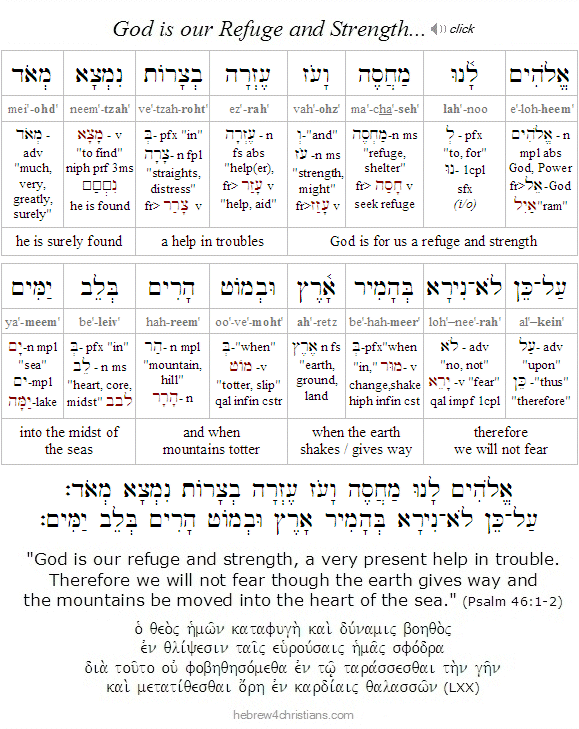 |
Teshuvah of Love...
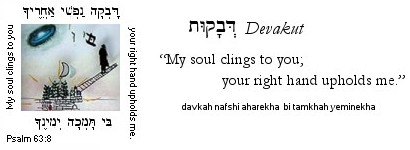
[ Shanah Tovah b'Yeshua, chaverim. At this time may we renew our hearts before the LORD. ]
04.08.24 (II Adar 29, 5784) When considering the matter of "teshuvah" (i.e., returning to God), it is vital to understand that God does not love you based on your obedience, though his love for you will lead you to obedience... It is only after accepting that you are accepted despite yourself – despite your inherent inability to please God, despite your incurably sick heart, despite your disobedience, sin, and so on – it is only then that earnest, Spirit-enabled obedience may arise spontaneously within your heart (Rom. 2:4). In that sense "obedience" is like falling in love with someone. It is your love that moves you to act and to express your heart, and were you prevented from doing so, you would undoubtedly grieve over your loss... Therefore the "law of the Spirit of Life in Messiah" is first of all empowered by God's grace and love. We walk by faith, hope, and love – these three. And this explains why the first step of teshuvah is to love God: Ve'ahavta et Adonai (Deut. 6:5). The work of faith is to believe in the miracle that God's love is "for-you-love..." (John 6:29).
If you find yourself operating from a sense of God's conditional acceptance, you will undoubtedly need to repeat the same sins over and over until your heart is finally convinced of its incurably wretched state. You must first be utterly sick of yourself to believe in the miracle of God's deliverance. You have to be "sick of your sickness" and be willing to give it up. Only then will the message of find opportunity to speak...
It needs to be added, however, that genuine repentance implies an understanding that sin is dreaded because it separates us from God's love. Some seem to think Yeshua died on the cross for their sins so that could live their lives without regard for sin, but that is of course a perversion of the truth. Yeshua did not suffer, bleed out, and agonize upon the cross for our sins so that we'd be given license to disregard the God's great cost to remedy our hearts... Indeed, by treating sin lightly we disparage the sacrificial work of Yeshua given on our behalf – we "crucify the Son of God afresh" and thereby deny God's wrath for sin as well as his severe mercy given to those who trust in him (Heb. 6:4-9). There is no Torah apart from the cross, just as there is no cross apart from the Torah... Most of all, the cross of Yeshua reveals that God is willing to sacrifice everything for your blessing...
Hebrew Lesson
Psalm 145:8 reading (click):
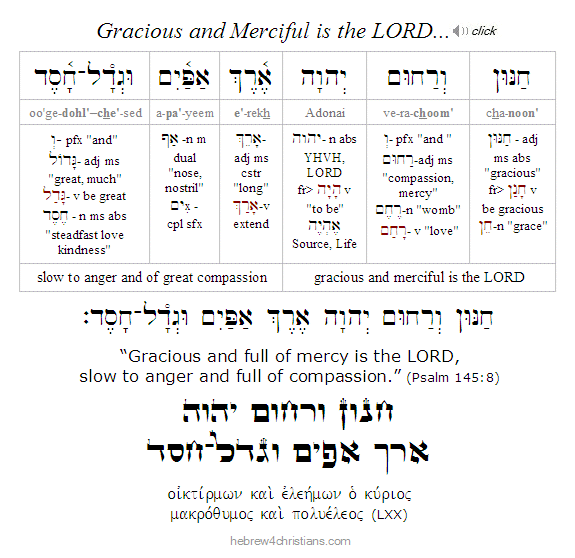 |
"Blessed is the man who walks not in the counsel of the wicked, nor stands in the way of sinners, nor sits in the seat of scoffers, but his delight is in the Torah of the LORD, and in His Torah he meditates day and night" (Psalm 1:1-2). Again, it is a severe mercy, a weighty grace, that is bestowed to us, friends...
God of Wonders Blessing...
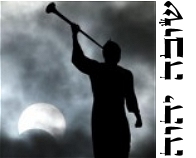
04.08.24 (II Adar 29, 5784) Shalom chaverim, and shanah tovah! The following blessing is traditionally recited whenever you want to praise the LORD for the works of His creation, for example upon seeing lightning, an eclipse (solar or lunar), or a comet, or when first seeing a mountain, a river, an ocean or other natural wonder:
"Blessed are You, Lord our God, King of the universe,
who makes the works of creation."
We must always keep firmly in mind that all of reality centers on the LORD God of Israel, and cerrtainly not in vain appearances and the deceptive rhetoric of political or media figures of the false world (i.e., עולם השקר). Melo khol ha'aretz kevodo: מְלא כָל־הָאָרֶץ כְּבוֹדו, "the whole earth is filled with His glory (Isa. 6:3). The "signs and wonders" of the LORD are all around us, if we are willing to see!
Hebrew Lesson
Psalm 72:18 reading (click):
Getting Ready for Passover...
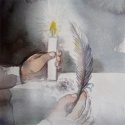
[ Passover begins Monday, April 22 this year. Chag Pesach Sameach, chaverim! ]
04.08.24 (II Adar 29, 5784) Preparing for Passover usually begins a full month before the holiday arrives, just after the festival of Purim (or at the latest around the time of the New Year of spring, i.e., Nisan 1). Since no leavened bread may be eaten during all seven days of Passover, we make a special effort to remove leaven entirely from our homes, in obedience to the Torah's command (see Exod. 12:15). Spiritually understood, we remove leaven (called "chametz") to symbolize that we are making a radical break from the past by becoming a new "substance," as Paul instructed: "Cleanse out the old leaven that you may be a new lump, as you really are unleavened: for Messiah our Passover Lamb has been sacrificed for us. Let us therefore celebrate the festival, not with the old leaven, the leaven of malice and evil, but with the unleavened bread of sincerity and truth" (1 Cor. 5:7-8). Note that the Greek text uses an imperative verb here (ἐκκαθάρατε): "You cleanse out (i.e., purge, as in catharsis) the old leaven so that you become a new lump (ἵνα ἦτε νέον φύραμα)" since you have been made new because of what Messiah has done for you." This is a matter of faith, friends, as you "become who you are" by trusting in the Salvation of the God of Israel.
 |
"A little leaven leavens the whole lump..." Chametz (i.e., leaven) is considered a corrupting influence, a hidden uncleanness that manipulates purer elements. Like the influence of a lump of leaven in a batch of dough, "spiritual" leaven functions as an evil impulse within us (i.e., yetzer ha'ra: יֵצֶר הַרָע) that corrupts and "sours" our soul. You cannot include a little sin in your life without it affecting your whole spiritual life. This "yeast in the soul" is essentially pride that manifests itself in idolatrous desires and lusts (the "puffed up" rise of the flesh in opposition to God). A practical way to observe the commandment to purge out the old leaven is not only to physically remove leaven from your home, but to look within you heart to see what corrupts and enslaves you in the physical, emotional, and intellectual realms of your life. Are you addicted to pleasure? power? approval from others? Are you enslaved to pride or fear? What holds your attention? What moves your behavior? This is part of the "search for chametz" in your life. Take a few moments to write down all the things that have enslaved you and then tear the list into small pieces. Before Passover arrives, take the torn pieces and burn them in a fire, symbolizing the end of your former life and the making of all things new. "Therefore if any person is in Messiah, he is a new creation: old things are passed away; behold, all things become new" (2 Cor. 5:17).
Hebrew Lesson
Exod. 12:19a reading (click):
Related Topics:
Audio Discussions:
Hebrew Lesson
Psalm 79:9 reading (click):
The Time is Now...

04.08.24 (II Adar 29, 5784) At the advent of a new Biblical year, it is traditional to confess your sin and turn to the Lord with a renewed passion. Therefore the sages admonish: "Repent one day before you die" (Mishna Avot 2:15b). But who knows the day of one's death in advance? Therefore live each day as if it were to be your last, and may God help you make the wholehearted decision to "seek the LORD while He may be found; call out to Him while He is near" (Isa. 55:6). Amen. But many people live in a state of hesitation and uncertainty... The Spirit asks: "How long will you go limping between two different opinions?" (1 Kings 18:21).
This question is meant for us to hear today. We are being called to make up our minds and turn (shuv) to the LORD. After all, what is more important to you than your relationship with God? Is there anything more important than this? As C.S. Lewis once said, "Christianity, if false, is of no importance and, if true, is of infinite importance. The one thing it cannot be is moderately important" (God in the Dock). "For he is our God, and we are the people of his pasture and the sheep of his hand today -- if you hear his voice" (Psalm 95:7). Today, if you hear his voice, do not harden your heart (Heb. 3:15). "Take care, brothers, lest there be in any of you an evil, unbelieving heart, leading you to fall away from the living God, but encourage one another every day, as long as it is called "today," so that none of you may be hardened by the deceitfulness of sin" (Heb. 3:12-13). Wake up! The time is now...
Hebrew Lesson
Psalm 39:4 Hebrew reading (click):
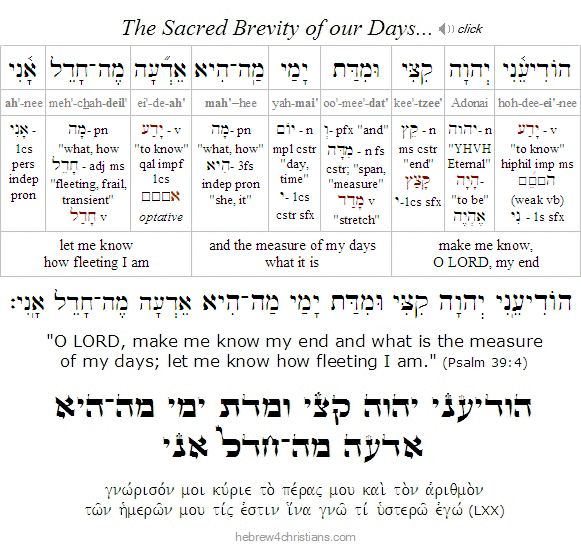 |
This week's Torah:
Parashat Tazria - תזריע

04.07.24 (II Adar 28, 5784) Shanah tovah chaverim! Our Torah reading for this week, parashat Tazria (תזריע), continues the discussion of the laws of "purity" and "impurity" that began earlier with parashat Tzav. A new mother is regarded as a niddah (a menstruent woman) and is considered "impure" (tamei) regarding the sanctuary for 40 days (if a boy) or 80 days (if a girl). On the eighth day of life a boy must be circumcised. After the mother's "period of impurity" had ended, she was required to bring a yearling sheep as a burnt offering and a dove for a sin offering (if she is poor, two doves sufficed for both offerings).
The portion next describes certain afflictions, collectively called tzara'at, that caused the affected person (or thing) to be both ritually impure (tamei) and in a state of uncleanness (tumah). Note that tzara'at is not to be identified with "leprosy" (as some English translations claim), since the symptoms of tzara'at included not just the afflicted person's skin, but sometimes his clothes, pottery vessels, and house.
When applied to people, tzara'at was a sort of a spiritual affliction (i.e., yisur: יסור) that could only be diagnosed by a kohen (priest), not a doctor. If white or pink patches appeared on a person's skin, the afflicted person was required to contact a kohen for an examination. If the priest detected 1) two hairs that had turned white within the spot, or 2) a piece of healthy skin in the middle of the spot, he was declared tamei (unclean), and then had to follow the prescribed laws for the metzora (person affected with tzara'at); otherwise he was declared tahor (clean). On the other hand, if the priest suspected tzara'at but was unsure, the afflicted person was quarantined and required to perform teshuvah (repentance). If a second evaluation indicated that the spot(s) had grown larger in size, the person was declared tamei and was subject to the laws for the metzora (i.e., dwelling "outside the camp" until the person was completely healed).
If someone was diagnosed with tzara'at, they were forced to leave the community and live in a state of exile. He had to tear his clothes like a mourner, put a shroud over his face (descending to his upper lip) and remain alone. If anyone came near, the metzora was required to cry out: "Unclean! Stay away! Do not become impure because of me!" (no one was permitted to come within eight feet of him). While so isolated, the person would have opportunity to perform teshuvah and seek spiritual "rebirth" (as described in the following Torah portion, parashat Metzora).
Turning to God's Heart...
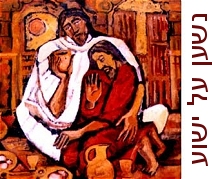
[ Shabbat Chodesh Shalom, chaverim... the last Sabbath before the Biblical New Year! ]
04.05.24 (II Adar 26, 5784) Turning to God in teshuvah, or "conversion," is not something you accomplish in your own strength or will. No, it is an act of grace wherein God touches you to make you alive (John 1:11-12). After all, how could it really be otherwise? From our perspective, teshuvah is a matter of trust - first trusting that God loves you and redeems you from the curse of your life, and second, that he will guide you by means of his spirit to know him. Sanctification, then, is the practice of attending to God's presence, seeking him in your heartache and in your hope, walking with him in your sorrows and in your joys....
Doubts may sometimes arise, however. You may hear questions within your soul asking where you are really going, or questions about the choices you have made. You may feel anxious or uncertain about your relationship to "God, the universe, and everything." When this occurs, you must again remember who you truly are. You must recall and reaffirm God's personal and covenantal love for you, even when you feel afraid or lost inside. God's everlasting love in Yeshua is the foundation, the solid rock, and the place where you will find shelter. It is the very "ground of your being." God's heart is the place where you are never left nor forsaken, even if you have wandered into painful byways of regret, sinfulness, and loneliness. Like the prodigal, when we "come to ourselves," when we remember where we really belong, we will rediscover our Father's outstretched arms welcoming us back home (Luke 15:17-24).
Hebrew Lesson
Isaiah 41:13 Hebrew reading (click):
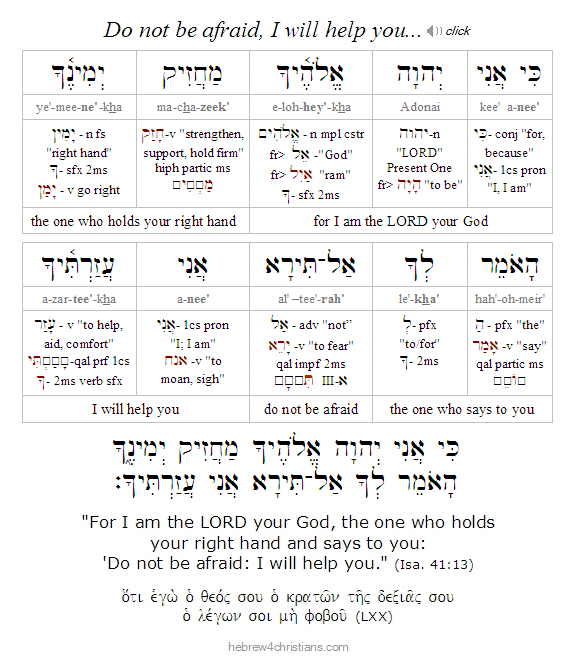 |
Endurance and Healing...
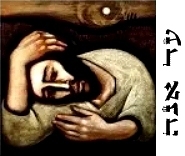
04.05.24 (II Adar 26, 5784) Our promised healing assuredly will come to us, though it remains the prerogative of God to allow trials in our lives that will work for our ultimate good. Therefore faith is the key here: Steadfastly affirm your healing even in the midst of your anguish, because your suffering is a test designed to teach you to trust God and to receive the blessing apart from any empirical evidence (2 Cor. 4:18). As the Torah declares of our father Abraham: והאמן בּיהוה ויּחשׁבה לו צדקה -- "And he believed in the LORD, and He counted it to him for righteousness" (Gen. 15:6); and also of Job's faith in the midst of his agonizing struggle: הֵן יִקְטְלֵנִי לוֹ אֲיַחֵל -- "Though he slay me, I will hope in him" (Job 13:15).
Sometimes all we can do is cry out to the LORD for deliverance... Our heart's cry does not question God's goodness to us, though we may silently wonder about the extent to which affliction may be required to mend our hearts. As C.S. Lewis once said, "We are not necessarily doubting that God will do the best for us; we are wondering how painful the best will turn out to be" (Letters of C.S. Lewis, 1964). There is a trust issue in suffering, and an "intimacy" that comes through its fires. Do not jump to conclusions; resist any insinuation that the Lord is being unjust! As Kierkegaard reminds us, "It is one thing to conquer in the hardship, to overcome the hardship as one overcomes an enemy, while continuing in the idea that the hardship is one's enemy; but it is more than conquering to believe that the hardship is one's friend, that it is not the opposition but the road, is not what obstructs but what develops, is not what disheartens but ennobles" (Four Upbuilding Discourses, 1844). Now that is a godward mindet that will endure all things to God's glory...
When Yeshua victoriously proclaimed, "It is finished" just before he died on the cross, he foreknew that his followers would experience a "purging process," a "refining fire," and time on the "potter's wheel" to perfect their sanctification. At the cross of Yeshua death itself was overcome – and all that it implies – and yet it is nevertheless true that we will suffer and die ourselves and that death persists an enemy (see 1 Cor. 15:26). While we celebrate the reality of the final redemption, the "instrumentality of our sanctification" needs to be willingly accepted and endured. I say "endured" here because I don't think we will ever have a complete answer to the question of "why" we undergo the various tests we face in this life. Our disposition in the midst of seemingly unanswered prayers is where our faith is disclosed: will we despair of all temporal hope or not? Will we console ourselves with the vision of a future without tears and loss - a heaven prepared for us -- or will we resist the present darkness and seek to find deliverance in this hour? Do we trust God with our pain and submit to his will, or will we "die" inside – losing hope and despairing of all remedy?
As King David once wrote, "At an acceptable time, O God, in the abundance of your steadfast love answer me in your saving faithfulness. Deliver me from sinking in the mire; let me be delivered from my enemies and from the deep waters. Let not the flood sweep over me, or the deep swallow me up, or the pit close its mouth over me. Answer me, O LORD, for your compassion is life; in the abundance of your mercies turn to me" (Psalm 69:13-16).
ענני יהוה כי־טוב חסדך
כרב רחמיך פנה אלי
a·nei'·nee · Adonai · kee-tohv · chas·de'·kha
ke·rohv · ra·cha·mey'·kha · pe·neih · ei·lai

"Answer me, O LORD, for your compassion is life;
in the abundance of your mercy turn to me."
(Psalm 69:16)

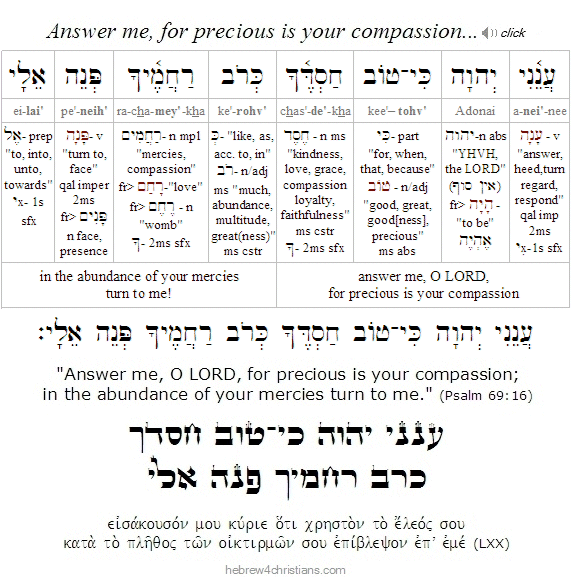
"But You, O GOD my Lord, do Thou for me for your own Name's sake; because your steadfast love is good, deliver me" (Psalm 109:21). "Do thou for me" is the confession that God alone has the power to help. Asking God to bring glory to His own Name -- to honor and magnify His Name -- is the theme of all true intercession.
Suffering has a way of focusing the heart and mind, reminding us that "today is the tomorrow of yesterday." Life is short, and our need is great to turn to the LORD and take hold His promises. We take comfort that God is for us the God of salvation: "Blessed be the Lord, who daily bears us up; God is for us our salvation. Selah. Our God is a God of salvation (יְשׁוּעָה), and to GOD, the Lord, belong deliverances from death" (Psalm 68:19-20).
Be encouraged, brothers and sisters in the Lord. All those who are "fathered by God" conquer the world, since God imparts to us the victory of faith by means of His powerful Spirit (1 John 5:4). Therefore the heart of faith steadfastly affirms, "In all these things [afflictions, tribulations, etc.] we are 'more than conquerors' (lit., "hyper-conquerors," i.e., ὑπερνικῶμενfromὑπέρ, "hyper" + νικάω, "to overcome") through Him that loved us (Rom. 8:37).
 |
Essential Healing...

04.04.24 (II Adar 25, 5784) The Hebrew word for "healing" is refuah (רְפוּאָה), from rapha (רָפָא), meaning to repair, restore, or make whole. Some of the sages have said that the root letters indicate the meaning or essence of healing itself, namely, confessing the truth of the LORD. This can be seen when we consider that the letter Resh (ר) refers to the head (i.e., rosh: ראשׁ), or that which is first -- suggesting that thinking and exercising the will to do teshuvah is primary (Psalm 90:2-3); the letter Pey (פּ) refers to the mouth (i.e., peh: פֶּה), that is, to speech, confession, and therefore to prayer; and the letter Aleph (א) refers to faith in the LORD (i.e., ehyeh: אֶהְיֶה), the One and only true God, the Master of the universe (Exod. 3:14).
So the Hebrew word for healing is connected first with changing our thinking by turning to God, confessing our sin, and trusting the LORD for life, as it says, "confess your sins to one another and pray for one another, that you may be healed" (James 5:16), and "I considered my ways, and turned my feet unto Thy testimonies" (Psalm 119:56). Refuah shleimah (רְפוּאָה שְׁלֵמָה), or a complete healing, is ultimately found when we turn to God with all our hearts and find shalom (שָׁלוֹם), as it says, "the Torah of the LORD is perfect, returning the soul" (Psalm 19:7). The Hebrew word for sickness (i.e., choleh: חוֹלֶה), on the other hand, comes from a root (חלה) that stands for blocked (חָסום) or profane (חל) learning (לִמוּד) regarding matters of the Holy Spirit (ה). The LORD comes to seek and to save those who are lost, saying "I am your Healer" (אֲנִי יְהוָה רפְאֶךָ). Therefore confess your confidence that the LORD forgives all your iniquities and heals everything that blocks you from his blessing. Amen.
Note further the connection between forgiveness and healing, as it says in James 5:16, "Confess your sins to one another and pray for one another, that you may be healed (i.e., ἰαθῆτε, you will be made whole)," and 1 John 1:9, "If we confess our sins, he is faithful and just to forgive us our sins and to cleanse us from all unrighteousness."
Hebrew Lesson
Psalm 103:3 reading (click):
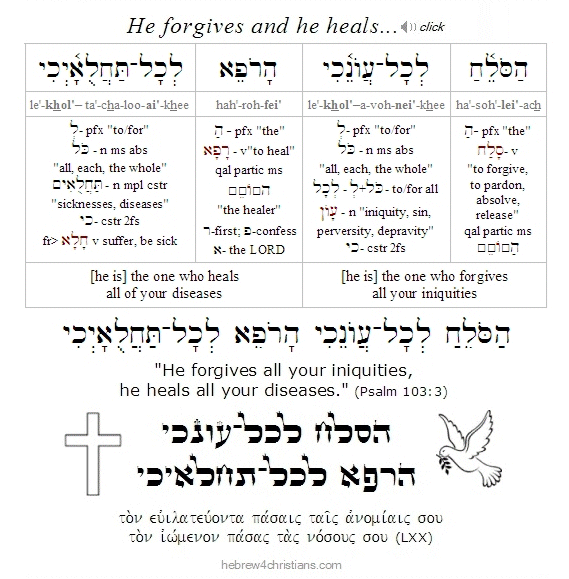 |
Healing from hidden faults...
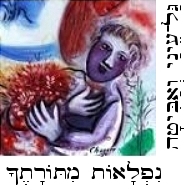
04.04.24 (II Adar 25, 5784) All of us have unhealed parts, "hidden faults" (נסתרות) of which we are not fully aware. "Blind spots." Therefore king David prayed, "Who can discern his errors? cleanse me from secret faults" (Psalm 19:12). We are cleansed by confession (וִדוּי), that is, by looking within our hearts to uncover deeper motivations... If we are honest with ourselves we may discover, for example, that we are angry or fearful people, despite how we otherwise wish to regard ourselves. If you find yourself unable to let something go, for instance, some pain or failure of the past, remind yourself that you must do so if you want to move on with your life. Focusing on how things could have been different is to be enslaved to the past. The goal of teshuvah (repentance) is to turn us back to God for life, but to do this, we must be be willing to let go of what makes us sick.
Note that the Hebrew word translated "errors" (i.e., שְׁגִיאוֹת) comes from a root word (שָׁגָה) that means to wander, stray, or transgress. The question raised by David is rhetorical: "Who can discern his errors?" No one – apart from divine intervention... David asked to be cleansed from his "secret faults," which are not those that were performed by him "in secret," but rather those that were unknown, unseen, and unconscious to his own sense of awareness. These are "mindless" sins, unthinking offenses, hidden dispositions, character defects and actions that a person unwittingly performs, perhaps because of deep forces of which he was oblivious. These are the "secret sins" set in the light of God's face (Psalm 90:8); the "sluggish darkness" of the human heart that leads to death and ruin: "The heart is deceitful above all things, and incurably sick; who can understand it?" (Jer. 17:9). How many of us, after all, are fully aware of what we are doing when we are doing something? How many of us are completely transparent both to ourselves and before God, with no unclear motives, etc.? We must always be vigilant... There is always the force of habit, or the subconscious desires or conflicts of the inner life, that work on us, not to mention the trauma of our past and the present devices from the enemy of our souls. And may the LORD give us the willingness to be healed, even if there are parts of ourselves that seem to resist that healing. Amen.
Hebrew Lesson
Psalm 19:12 reading (click):
nivchan le'ahavah
Testing of the Reins...
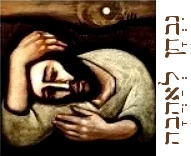
04.04.24 (II Adar 25, 5784) The phrase "mitzvah haba'ah ba'aveirah (מִצְוָה הַבָּאָה בַּעֲבֵירָה) means a mitzvah that (indirectly) comes about by means of a transgression of another mitzvah. The sages cite the example of working on the Mishkan during the Sabbath day because even though working on the Sanctuary is indeed a blessing, it is not truly so if it violates God's will (Exod. 35:1-2). The sages liken this to making bread from stolen wheat -- and then reciting the "ha'motzi" blessing over the bread! (Bava Kamma 94). Likewise, giving tzedakah that has been gained through illicit means (such as stealing) is forbidden, as is the offering of any sacrifice that is defective or unwanted (Deut. 15:21).
Such considerations reveal that there are "weightier matters" of Torah, and therefore Yeshua warned against making a pretense of obedience at the expense of what is more important to God's heart. For example, tithing "mint and cummin" should not preempt the duty to care for the welfare of parents who are in need (Luke 11:42; Mark 7:9-13). Nor should "religious" activities be regarded as a substitute for surrender of the heart. On the other hand, working to pull a sheep that has fallen into a well on the Sabbath is more important than disregarding the suffering of the animal and the loss to the owner (Matt. 12:11). After all, what good is keeping a commandment in a selfish or self-serving way? Holiness is not about self-preservation as much as surrender. We must always remember that God looks upon the heart and "tests the reigns" (Psalm 7:9; Jer. 17:10).
The attitude of the heart (יַחַס לֵב) is essential. In ancient Hebrew, the "kidneys" (i.e., keliyot: כְּלָיוֹת) were thought to produce the "gut feelings" or "inner life" of a person, perhaps because they filtered the blood. Indeed your attitude and affections are foundational to the Torah of life. John Calvin wrote: "The Law is kept only when men are just and kind and true toward each other, for thus they testify that they love and fear God." In Jewish thinking, the basic respect for others is sometimes called "derekh eretz" (דֶּרֶך אֶרֶץְ).
We have to be careful not to miss the goal of our redemption, which is to become sanctified by embracing the heart, vision, and character of our Lord (Lev. 11:44). Yeshua is the pattern, and his life was unquestionably marked by qualities of mercy, forgiveness, and love. He overlooked our sins and transgressions by focusing on the weightier matters of our need for healing and reconciliation with God. On the other hand, he receives us as his children and therefore we will undergo "scourging" or testing of our "kishkas" (Deut. 8:5; Heb. 12:6). Indeed the Lord will allow "scorching" experiences by which our character defects are exposed and through which we may be refined by teshuvah. In the furnace of trials, God will separate us from our bad qualities, lifting off the dross to reveal the clear brilliance of his heart within us. As C.S. Lewis once said, "God does not love us because we are good, but God will make us good because He loves us." Amen.
Hebrew Lesson
Jeremiah 17:10 reading (click):
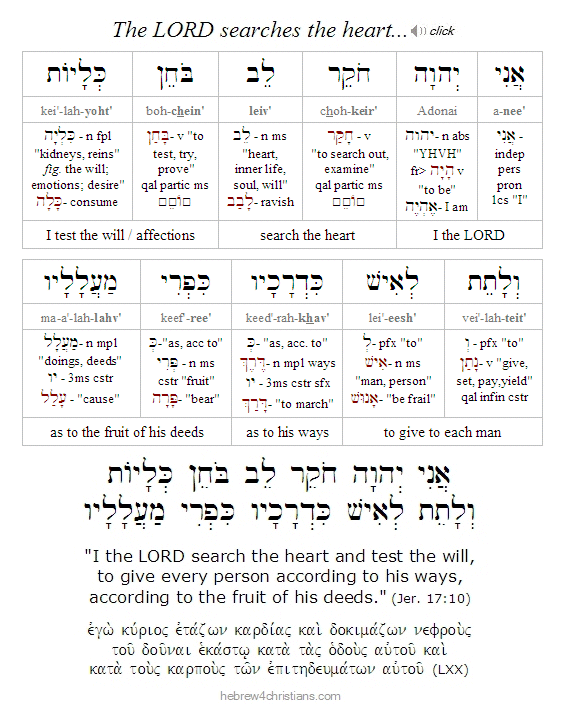 |
Hearing the Unsaid...
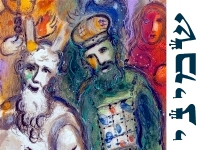
[ The following is related to our Torah reading for this week, parashat Shemini... ]
04.04.24 (II Adar 25, 5784) From our Torah portion this week we read: "Now Nadab and Abihu, the sons of Aaron, each took his censer and put fire in it and laid incense on it and offered strange fire (אֵשׁ זָרָה) before the LORD, that He had not commanded them" (Lev. 10:1). The sages note that while Aaron's sons Nadab and Abihu were godly people, they did not understand the phrase, "that He had not commanded them" (אֲשֶׁר לא צִוָּה אתָם), because they had assumed that since God did not explicitly tell them not to do something (i.e., not to burn incense in the Holy Place), then it was permissible to go ahead and do that thing. However, just because God does not say that we should not to do something does not mean that we are therefore at liberty to do it. All we can infer from silence is silence, not that the silence somehow communicates agreement with our desires.... Remember that it is not what God has not said that should be our concern, but rather what he has said (Deut. 29:29).
"A great many people think they are thinking when they are merely rearranging their prejudices." - William James
This sort of presumption is common today, where many make a pretense of ignorance, suppressing what they don't want to hear to justify their own religious perspectives and ideologies... It takes a genuine humility to confess that we often don't know why we are doing what we are doing, and then to back up and ask for God's help and direction.
Eclipses and Prophetic Signs...
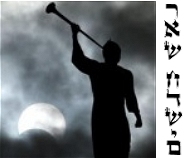
04.03.24 (II Adar 24, 5784) As many of you likely know, on April 8th there will be a total eclipse of the Sun that can be seen in certain areas of the United States, and some people are making the claim that this eclipse is (or may be) a sign of a prophetically significant event. Now while it's true that April 8th does indeed mark a prophetically significant date this year, this is not because of a solar eclipse but rather because it marks the new moon of the first month of the Biblical calendar, called "Rosh Chodashim," and that date is significant because it signals the start of Chodesh ha'yeshuah (חודש הישועה), or the Month of Salvation, with Passover occurring exactly 14 days later under the full moon of the month...
A solar eclipse is an amazing event, of course, and it reveals God's glory in the heavens, but it is not to be used to foretell the prophetic calendar of Scripture, nor is to be confused with signaling the Great Tribulation or the End of Days prophecies. Indeed we are told in the Torah not to worship the sun or the moon or any of the heavenly host (Deut. 4:19; 17:3; Acts 7:42). The sun will be "turned into darkness" and the moon will appear as blood before the great and awesome Day of the Lord (יום יהוה הגדול), but that will occur later, after the Sixth Seal is broken as we stated in the Book of Revelation (Rev. 6:12-13, Matt. 24:29-31; Joel 2:30-31).
In all things we are to seek the Lord, but we must use discernment in our seeking. There are various general signs that the prophesied "end of days" draws near (Matt. 24:3-33), including the great sign of the return of the Jewish people to Israel (Ezek. 36:24; Hos. 3:5), the rise of militant Islam and the persecution of the Jewish people (Psalm 83), the apostasy or "falling away," of the institutional church and its flagrant disregard of the truth of Scripture (Matt. 24:4-5; 2 Thess. 2:3; 2 Tim. 3:1-9; Ezek. 13:6-9), the worldwide rise of skepticism, paganism, occultism, and "woke" ideological evils (Lev. 19:31), the increasing barbarity and lawless character of people (2 Tim. 3:1-5; Matt. 24:10-12). The world will experience increasing political and financial instability, there will be numerous wars and rumors of war; seismic activity will intensify in the earth, as will famines and worldwide diseases (man-made or otherwise). There also will be an upsuirge of persecution of sincere followers of Yeshua throughout the world.
In the midst of the moral and spiritual chaos, the "man of sin" (or anti-Christ) will arise who will at first appear to be a man of peace, allowing Israel to rebuild the Temple while somehow resolving the political unrest surrounding Jerusalem, but he will betray Israel and then openly persecute the Jewish people. The great tribulation will then befall the world in judgment from God (Matt. 24:21-22; Zech. 12:2-3) as a precursor to the second coming of Yeshua. The second half of Daniel's 70th week of years prophecy will be a time of surreal catastrophe for the world, with repeated judgments resulting in massive death and worldwide destruction. Thankfully, the followers of the Lord will be spared the wrath to come by being "taken away" to join the Lord for the heavenly wedding ceremony!
So let us be vigilant and look for the blessed hope, and the glorious appearance of our great God and Savior Yeshua the Messiah (Titus 2:13). If you set the LORD always before you and know Him in all your ways you will not be deceived by false teachers. Shalom chaverim.
Hebrew Lesson
Psalm 104:19 reading (click for audio):
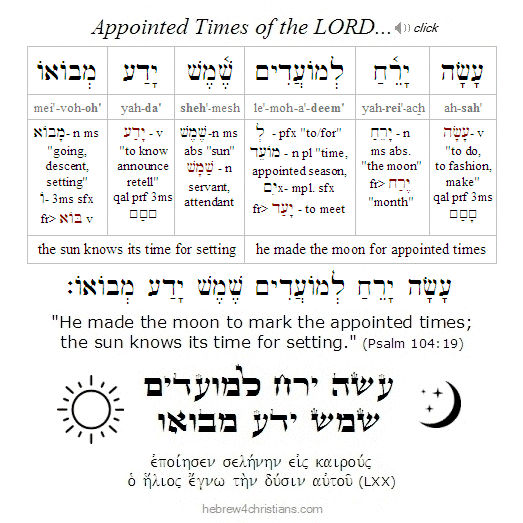 |
Note: In order to understand the "rapture" of the people of God, you have to do a careful study comparing statements about the "Day of the LORD" and the Second Coming with what Yeshua said to his disciples about preparing a place for them and then coming to take them away unexpectedly, as a groom who suddenly calls for the presence of his bride...
His Power to Heal...
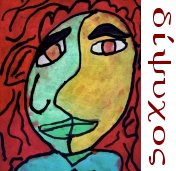
04.03.24 (II Adar 24, 5784) There's an old story of the ancient philosopher Thales of Miletus who fell into a well while he was contemplating the heavenly bodies. All his grand intellectual aspirations resulted in a pratfall of humility. Kierkegaard likewise tells the tale of notable professor who, in the pontification of grand ideas of the cosmos, was oblivious to a drop of sweat that dangled from his nose. And there have been times in my life when I have meticulously studied Scripture and was so engrossed in theological matters that I somehow forgot that God was really present! In such moments, if I were suddenly interrupted, I would likely fall into a moment of peevishness and irritation. It would be comical if it weren't so sad and disappointing, and yet there is a message in the pain that should not be missed....
What do we do with our inconsistencies, those "lapses" of faith that expose what we are actually believing at the time? These are gaps or incongruities between what we might say is true and what our behavior otherwise reveals. For instance, we may say that we trust God with our lives, and aver that we believe that the Almighty works all things "together for our good," but inwardly we are filled with impatience, anxiety, and even dread. We are vaguely conscious of our dissimulation at times; we feel the tension that something is not right about us; we sense that we are not who we want to think we are. We may even suspect that we are inwardly divided, unstable, and afraid of what is hidden within our deepest hearts. But we tolerate our pretenses. We may ask ourselves "what would Jesus do?" and then find reasons to excuse ourselves; we may affirm: "When I am weak, then I am strong," and then "think twice" in fear over circumstances that we do not understand...
So how do we deal with this contradiction between what we are and what we ought to be? How do we reconcile what "is" with what "ought" to be? In other words, how do we "practice what we preach?" We all experience the "gap" between the real and the ideal not only in the social and political world around us, but also - and more profoundly - as duplicity within our own hearts. Alas, how can we no longer be "two-souled' or double minded? How can we be set free from the influence of the "shadow self"?
These are not questions about theology or doctrine, but about emotional and spiritual maturity, that is, they are matters of personal character. When Yeshua said that the truth would set you free, he didn't mean that you would find freedom by studying theology as much as by undergoing transformation of the heart. He was talking about reality - namely the reality of God's righteousness healing your sick life... Theology is important, of course, but primarily as a means to the greater end of knowing God "bekhol levavkah," with all your heart, "bekhol nafshekha," with all your soul, and "bekhol me'odekha," with all your might. The essential reason for learning about God is be in heartfelt relationship with him, after all, and that will lead to transformation of the way we live - that is, how we think, talk, and make decisions. Spiritual truth is "existential." How we live life reveals what we truly believe. But all of it comes from the miracle of God's truth that declares and makes us who we really are...
When we are born from above, we are given a new nature, and the "seed" of eternal life is implanted within the soul. Heart transformation, experientially speaking, comes through time, as a matter of undergoing "reproof" and "correction." This is sometimes called the process of "sanctification," which means walking uprightly in the way of holiness. The Lord is likened to a potter and we are as clay in his hand (Isa. 64:8). Life on the "potter's wheel" can be messy, unsettling, and sometimes excruciatingly hard, but it is God's sovereign work to form your life according to his design and purposes. From our perspective it seems so tedious and difficult, but from God's perspective it is "already done," it is the finished work of Christ that he sees.
God gives us the Scriptures to help us know his heart, as it is written: "All Scripture is inspired by God and profitable for doctrine, for reproof, for correction, and for training in righteousness" (2 Tim. 3:16). Here we note that the Hebrew word for "reproof" is tochechah (תּוֹכֵחָה), from a root (יכח) that means to test or judge the quality of something. God's reproof reveals the gap between our behavior and his standard of moral and spiritual truth, and when we are reproved by God, we understand how we fall short of his will. The Hebrew word for "correction" is mussar (מוּסָר), from a root (יָסַר) that means to chasten or punish, though always with the aim of developing godly character. God will sometimes allow us to undergo affliction, for instance, to teach us patience or humility. "Training in righteousness" means being instructed, as a child, in what is upright, true, and honorable. The life of faith is "education for eternity" where we "catch up" with the reality of God's power within us.
Narrowing the gap between what we say that we believe and how we actually live is therefore an ongoing process for us in this life. The world, the flesh, and the devil are forces that weigh us down to keep us profane and fallen, but God provides his Spirit and he instructs us to walk in the victory of faith. If we ignore or rationalize the gap, however, that is, if we allow the inner conflict and dissonance to become deeply rooted within our souls, we run the risk of becoming either self-deceived or embittered over the struggle. Bitterness is especially dangerous because it can result in abandoning the life of faith altogether (Heb. 12:15). We can fight against these temptations by affirming that what is "really real" about who you are is what God says and does on your behalf in Yeshua. We look to Him, not to ourselves...
The test of faith is a matter of the heart more than the head. Things such as fear, pride, or ungodly desire can overrule our profession of faith, and we "forget" our calling before the Lord. The battle is found within the heart. Courage and moral allegiance is more powerful than intellectual conviction regarding matters of temptation.
The inner conflicts are real. The battle is for our souls. Many of us have truly felt or experienced the glories of God's love, and we want to believe and to walk in the light of that love... So we try various things to know God or recapture our hope. We study, read, think hard, pray, attend services, and so on. But as we try again to be spiritual or religious or self-assured, we may become bound, weary, and feel like a failure... We suspect that we have failed God, failed ourselves, and failed others. We go dark, ashamed, and anxious, but we try yet again, and again, until we are distraught and in agony of heart.
Yet this cycle or undulation is part of the test of faith, this agony of trying and failing, encountering our shadowy duplicity of heart, descrying yet again what we really are on the inside, and crying out for deliverance from our faithlessness, our hypocrisy, our fecklessness, and our despair... Paradoxically, because we cannot help ourselves, we continue trying, lamenting, confessing, and persevering - despite ourselves - and in the lament of the struggle to be who God says we are, we begin to surrender to a deeper heart or way of being - broken, humbled, brought face to face with our powerlessness and need - and it is then that we discover the healing hand of God is at work... God alone saves us, not we ourselves.
"You do not know what spirit you are of..." (Luke 9:55). Yeshua's words imply that each of us has the responsibility to know ourselves (γνῶθι σεαυτόν), and to learn to endure (and overcome) the natural motives and focus of our hearts. We collide with the truth of our spiritual condition in the midst of our daily frustrations, as we experience conflict, opposition, and the inner groan that arises from pressures and disappointments. Spiritual growth means learning to transcend our negative reactions, to stop cursing our conflicts, and to awaken to the blessings that surround and pervade our way. It requires a miracle. It demands faith.
If we are able to find the courage, our failures and brokenness may be used by God to purify the intentions of the heart by helping us to be more honest with ourselves. We begin to realize that we are more vulnerable than at first we thought; that our faith is not as strong as we imagined, and that our motives are often mixed and unconscious. Illusions are striped away; idols crumble; deeper levels of selfishness are uncovered; and the gap between our words and our deeds is exposed yet again... It is one thing, after all, to intellectually think about faith or to idealize spirituality, but it is quite another to walk out faith in darkness. Yet it is only there, in the rawness of heart, that we discover what we really believe and how our faith makes traction with reality... And there we will discover, if we persevere, the truth that Paul affirmed: "I have been crucified with the Messiah. It is no longer I who live, but Messiah who lives in me. And the life I now live in the flesh I live by the faith in God the Son, who loved me and gave himself for me. I do not nullify the grace of God, for if righteousness (i.e., salvation) were through the law, then Yeshua died for no purpose" (Gal. 2:20-21).
There is a "hidden blessing" (ברכת סוד) that comes from our troubles. When we learn to accept that we are accepted despite ourselves, we find God's Presence and can breathe in his peace and love, despite the sorrows and grief of our lives. When we come to the light, and do not deny the truth about our condition, we can honestly confess the Lord is our healing (Heb. 4:16). When we seek the good - and even bless the struggle - we express our trust that God is using our trials to help us grow and to bring beauty from our ashes (2 Cor. 7:10). "O Lord, I need you for everything, every last thing. Please meet my great need for You, for without you I am nothing." Amen, "turn us back to you, O LORD, so shall we be turned..." (Lam. 5:21).
Contrary to the assumption that the life of faith should always be triumphant, we all will experience various setbacks, pratfalls, troubles and various challenges in our lives. This does not mean that God does not care for us however, because on the contrary, this is by his design; a plan supervised by God's love and blessing, and the afflictions we therefore encounter are part of his work for our good (Rom. 8:28; Heb. 12:6). We "descend in order to ascend"; we go down to go up (לרדת כדי לעלות). It seems counterintuitive to the flesh, but the heart of faith gives thanks for all things - the good as well as the evil (see Job 2:10). We affirm: "This too is for the good," yea, even in the midst of our struggle, no, even more -- precisely in the midst of our struggle -- for this, too, is for our good. Faith is the resolution to trust in the reality of God's goodness even during hard times when we feel abandoned or lost (see Isa. 50:10). The Lord uses the "troubles of love" (יִסּוּרֵי אַהֲבָה) for our good - to wake us up and cling to him all the more, since this is what is most essential, after all...
God forbid we should give up now, friends. Faith "sees the unseen" and believes that the day of our ultimate healing draws near. You are in good hands as the Lord forms your soul for the glory of his purposes... Stay strong and keep your hope alive. !מחיל אל חיל
Hebrew Lesson
Psalm 86:11 reading (click for audio):
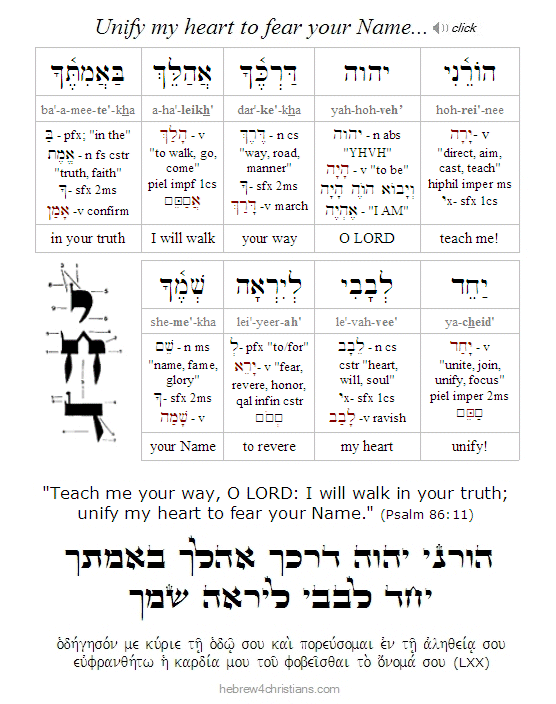 |
A Consuming Fire...
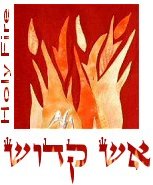
[ The following is related to our Torah reading for this week, parashat Shemini... ]
04.03.24 (II Adar 24, 5784) From our Torah portion for this week (i.e., Shemini) we read: "Now Nadab and Abihu, the sons of Aaron, each took his censer and put fire in it and laid incense on it and offered strange fire (אֵשׁ זָרָה) before the LORD, that He had not commanded them" (Lev. 10:1). The sages interpret "strange fire" (i.e., esh zarah: אֵשׁ זָרָה) as alien passion or illicit zeal stimulated by artificial means (in this case, drinking wine before their service). The experience of intoxication may seem to elevate the soul, but in reality it muddles the ability to discern spiritual realities: "Drink no wine or strong drink ... when you go into the tent of meeting, lest you die. You are to distinguish between the holy and the common, and between the unclean and the clean" (Lev. 10:9-10). Nadab and Abihu were highly honored in Israel, the first priests of God, and if they drank wine before entering the sanctuary it was surely not for crass purposes, but rather to "sanctify" their experience, or so they thought... They were severely judged, however, because they presumptuously sought to sanctify themselves by means of an artificial influence, and this made them "strange" before God. Likewise many people today seek "spiritual highs" and "signs" without undergoing the discipline of Torah study, prayer, meditation, and so on. God wants our hearts in service, but our hearts must soberly reverent before Him (1 Pet. 5:8; Eph. 5:15-18).
"Nadab and Abihu, the sons of Aaron ... brought strange fire ... and they died before the LORD" (Lev. 10:1-2). It is a fearful thing to fall into the hands of the Living God who is called esh okhlah, El kanna (אֵשׁ אכְלָה אֵל קַנָּא) - "a Consuming Fire, a jealous God (Deut. 4:24). Indeed, though atonement was provided under the law for every kind of sin and transgression, there was one exception: "But the soul that sins presumptuously (בְּיָד רָמָה) shall be out off from the midst of my people" (Num. 15:30). We must be careful not to casually regard God's truth with undue familiarity, lest we find ourselves under the influence of strange passions that lead to presumption....
Hebrew Lesson
Deut. 4:24 Hebrew reading (click):
Let us be sober and vigilant, friends. "Now these things happened to them as an example, but they were written down for our instruction, on whom the end of the ages has come" (1 Cor. 10:11). It is prophetically astounding that during the very time that the Tabernacle was inaugurated, tragedy struck and Aaron's two sons were killed. This should warn those teachers who speak casually of God from the pulpit, since they act profanely and encroach upon the Divine Presence. Let us be admonished, friends and honor the Living God. As the sages have wisely said: Da lifne mi attah omed: "Know before Whom you stand!"
Seeing the Sacred...
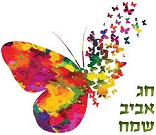
04.02.24 (II Adar 23, 5784) From our Torah reading for this week (i.e, parashat Shemini) we read: "This is the thing that the LORD commanded you to do, so that the glory of the LORD may appear to you" (Lev. 9:6). The sages here comment that if you wish to know if your action is something God wills, then see if leads to the revelation of the glory of God... In other words, "the thing" (זֶה הַדָּבָר) that God wants for us is to behold the Sacred Presence that pervades and upholds all things. Indeed the Hebrew word for seeing, ra'ah (רָאָה) is connected with the word "awe," yarah (יִרְאָה). When we really see life as it is, we will be filled with wonder over the glory of it all. Every bush will be aflame with the Presence of God and the ground we walk upon shall suddenly be perceived as holy (Exod. 3:2-5). Nothing will seem small, trivial, or insignificant. May it please you, O LORD, to so open our eyes... Amen.
Hebrew Lesson
Isaiah 6:3b Hebrew reading (click):
Readying for that Day...
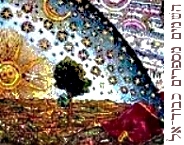
[ Instead of focusing on a solar eclipse on April 8, prophetically we look at Israel and the turmoil that was prophesied to come. There will be celestial events during the time of the Great Tribulation, but we're not at that point yet. Above all, keep focused on Yeshua. ]
04.02.24 (II Adar 23, 5784) The last promise of Scripture is "I come quickly" (אֲנִי בָא מַהֵר) and the last prayer is, "Amen, come, Lord Yeshua" (אָמֵן בּאָה־נָּא הָאָדוֹן יֵשׁוּעַ) [Rev. 22:20]. Meanwhile we "inwardly groan" for the fulfillment of our redemption, since presently we are suspended between worlds, walking in hope yet subject to the vanities that befall all flesh... And though God may tarry, He declares, "I am the LORD; in its time I will hasten it" (Isa. 60:22). So we are made captives to hope, clinging to the promise of our ultimate healing and redemption. Our hearts therefore affirm that God is faithful "to keep you from falling, and to present you faultless before the presence of his glory with exceeding joy" (Jude 1:24). Amen. God will help us before He will help us, and may He come speedily, and in our day....
Hebrew Lesson
Isaiah 45:22 Hebrew reading (click):
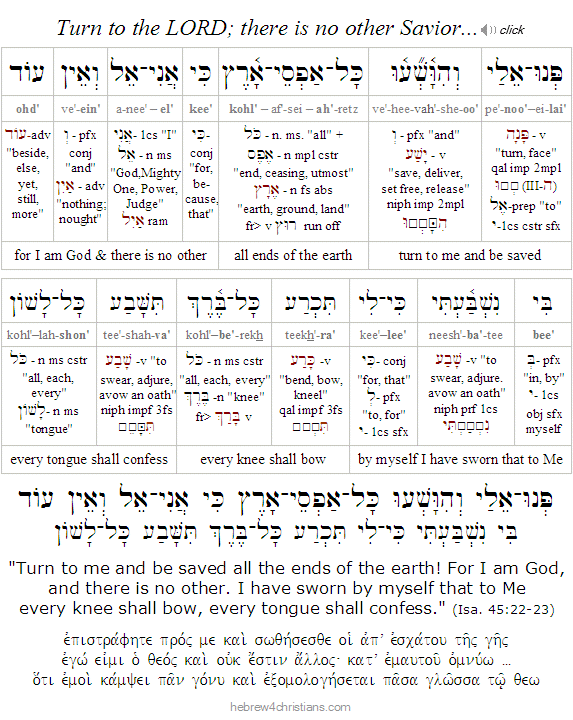 |
Brokenness and Service...
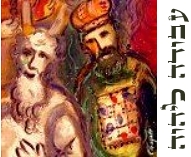
[ Consider that the very first High Priest of Israel was marked with the blood of sacrifice on his ear, hands, and feet and was anointed with oil in the sign of a cross upon his forehead... a clear picture of Yeshua as our ultimate High Priest... ]
04.01.24 (II Adar 22, 5784) Shalom friends. In this week's Torah (i.e., parashat Shemini), we read how Moses' brother Aaron was installed as Israel's first High Priest (Kohen ha-Gadol). Aaron was a great prophet of Israel. "Before I arose," said Moses, "my brother Aaron prophesied to Israel for eighty years" (Shemot Rabbah 3:16). While the Jews were enslaved in Egypt, he went about the people proclaiming that "the Holy One, blessed be He, would soon redeem Israel from bondage" (ibid. 5:10).
When the LORD's anger was kindled against Moses for his reluctance to lead Israel out of Egypt (Exod. 4:14), God told him, "I had said you would be priest and he [Aaron] a Levite; now, however, Aaron will be a priest and you a Levite" (Zevachim 102a). When the LORD later spoke to Moses in Midian, "Go, return to Egypt, for those who seek your life are dead" (Exod. 4:19) the utterance split into two voices. Moses heard "Go, return to Egypt" while Aaron heard, "Go into the wilderness to meet your brother Moses" (Exod. 4:27).
In Pirke Avot 1:12, Aaron is said to "have loved peace and pursed it; he loved people and drew them close to the Torah." Aaron was said never to interrupt his friend's words nor to accuse others of sin. He greeted all men with love and dan l'kaf zechut (דָן לְכַּף זְכוּת) - with the benefit of the doubt. He was a peacemaker, a humble teacher, and healer. Some of the sages have even gone so far as to say that Aaron was greater than Moses himself (Avot d'Rabbi Nosson). Rashi says that Aaron's attribute of being ohev shalom - a lover of peace - therefore qualified him to become Israel's first High Priest.
Aaron's middot ha-lev (qualities of heart) sometimes made him subject to abuse from others. Aaron's pursuit of peace (אוֹהֵב שָׁלוֹם וְרוֹדֵף שָׁלוֹם) caused him to conciliate the unruly mob's demand for an idol to lead them back to Egypt. Aaron had hoped to "buy some time," since he prophetically knew that Moses was returning later that very day from the summit of Sinai. Even though he had at his disposal the army of the Levites to deal with the mob using force, he turned away from the path of violence and temporized instead. Later, after Moses returned and smashed the luchot (tablets), Aaron realized that a terrible thing had come to Israel through his action, and he therefore underwent a period of teshuvah (repentance). "He tied a rope of iron around his waist and circulated throughout the camps of Israel teaching the people. To whoever did not know prayer he taught prayer, to whoever did not know keriat Shema, he taught Keriat Shema, to whoever did not understand the essence of Torah, he taught the essence of Torah" (Yalkut Shimoni).
As mentioned in the parashah summary for Shemini, on each of the seven days of inauguration Moses anointed Aaron with holy oil. "He [Moses] disrobed him, washed him, anointed him between the eyes in the shape of a cross (the Greek letter Chi) with the oil of anointment, and then dressed him again. Moses repeated this for seven days, until the eighth day" (Midrash HaGadol, BaMidbar 7:1). After Aaron offered the sacrifices, the Divine Presence did not appear immediately, and Aaron was frightened that his sins were haunting him. According to the Sifra (midrash on Leviticus), Aaron thought the altar resembled the shape of an ox and he was afraid of it because it reminded him of the Golden Calf. His fear was preventing the revelation of God's love.
The great commentator Rashi notes that Moses' commandment to his brother Aaron, "Draw near to the altar" (קְרַב אֶל־הַמִּזְבֵּחַ) on the eighth day (Lev. 9:7), suggests that Aaron was still deeply ashamed over the Sin of the Calf. Though Aaron did not feel worthy to be the High Priest of Israel, Rashi states that Aaron was chosen precisely because of his shame. His reluctance and sense of utter unworthiness was the very reason why he was granted the role of Israel's High Priest. The service of God requires the death of the ego....
In similar measure, some of you might feel utterly unworthy of your high calling in the Messiah Yeshua. After all, you -- no less than Aaron -- are called to come before the Divine Presence and function as God's holy priests. But in similar measure, you -- no less than Aaron -- are unworthy for the role. Nonetheless you are chosen in your weakness; you are beloved because of your lowly standing; you are made "pure in heart" because you realize your own inner nothingness and need before the Savior.... Your brokenness is a gift that magnifies God's unending love and grace:
For consider your calling, brothers: not many of you were wise according to worldly standards, not many were powerful, not many were of noble birth. But God chose what is foolish in the world to shame the wise; God chose what is weak in the world to shame the strong; God chose what is low and despised in the world, even things that are not, to bring to nothing things that are, so that no human being might boast in the presence of God. (1 Cor. 1:26-29)
Your avodah (service to the LORD) is one of the sacrifice of praise for the salvation God has bestowed upon you. "Through him [Yeshua] then let us continually offer up a sacrifice of praise to God, that is, the fruit of lips that acknowledge his name" (Heb. 13:15).
Of course, such praise is often offered while in a state of suffering, but "though our outer self is wasting away, our inner self is being renewed day by day. For our light and transient troubles are achieving for us an everlasting glory whose weight is beyond description. We concentrate not on what is seen but on what is not seen, since things seen are temporary, but things not seen are eternal" (2 Cor. 4:16-18).
טוֹב־לִי כִי־עֻנֵּיתִי לְמַעַן אֶלְמַד חֻקֶּיךָ - "It is for my good that I have been afflicted; so that I would learn your decrees" (Psalm 119:71).
Rabbi Moshe of Kobrin used to say, "When a person suffers, he shouldn't say that things are bad. Rather, he should say that the situation is bitter. The Almighty does nothing bad. Just as medicine is beneficial, although it might be bitter, so too events are always beneficial even if they are bitter."
The sages sometimes say that God is closer to sinners than to "saints." God in heaven holds each person by a string. When you sin, you cut the string; but then God ties it up again, making a knot - and thereby you are brought a little closer to him. Again and again your sins cut the string - and with each further knot God keeps drawing you closer and closer." (De Mello)
"God punishes the ungodly simply by ignoring them. This is why they have success in the world – the most frightful punishment, because in God's view this world is immersed in evil. But God sends suffering to those whom he loves, as assistance to enable them to become happy by loving him." (Soren Kierkegaard)
Hebrew Lesson
Psalm 34:18 Hebrew reading (click):
March 2024 Site Updates
Anticipating Passover:
Shabbat HaChodesh...
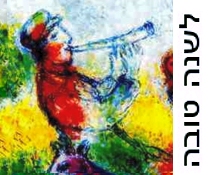
03.31.24 (II Adar 21, 5784) The Biblical New Year begins Mon. April 8th at sundown this year, or Nisan 1 on the Torah's calendar. The LORD set apart Nisan 1 as the "head of the months" of the calendar, called "Rosh Chodashim," which begins the yearly calendar itself (see Exod. 12:1-2). This may seem a bit odd to you since most people regard January 1st as "New Year's Day," though remember that the world runs on a "clock" that operates under assumptions that are different than those revealed in the Scriptures....
The "wisdom of this world" (σοφία τοῦ κόσμου τούτου) is the prevailing cultural spirit that suppresses the reality of God's Presence and truth. Such "wisdom" is regarded as foolishness before God, and God has promised to "seize the so-called wise in their own craftiness" (1 Cor. 3:19). The life of faith, on the other hand, sees what is invisible. Faith (emunah) apprehends "the substance (ὑπόστασις) of things hoped for, the assurance (ἔλεγχος, conviction, "correction," i.e., hokhachah: הוכחה) of things not seen" (Heb 11:1). As the Scripture says, the heart of faith "looks not to the things seen but to the things unseen; for the things that are seen are transient, but the things that are unseen are eternal" (2 Cor. 4:18).
The Sabbath that immediately precedes (and sometimes falls on) the Biblical New Year is called Shabbat HaChodesh (שבת החודש), the "Sabbath of the Month" (of Nisan). This Sabbath is significant because it marks the start of the month of Redemption (i.e., the first month called Nisan) which God called "the beginning of months" (i.e., Rosh Chodashim). We honor this event by reading an additional passage from the Torah concerning the sanctification of the new moon (Exod. 12:1-20), and we spiritually prepare for this month by studying about Passover and the coming spring holidays:
 |
The commandment to sanctify the first new moon of the year (i.e., Rosh Chodashim) reveals that it is our responsibility to sanctify (i.e., observe) Biblical time in general. In other words, when we observe "the beginning of months," we are acknowledging that time itself is rooted in the Biblical calendar with its divinely inspired cycle of festivals (see Psalm 104:19).
Passover in two weeks!
Note that this year the Biblical New Year begins on Mon. April 8th at sundown, and therefore Passover begins exactly TWO weeks later, Mon. April 22nd at sundown:
 |
Originally Rosh Chodashim was simply called the "first month" because it marked the month of the Exodus and the other months were named in relation to it, similar to the days of the week in the Hebrew calendar (i.e., the first day, the second day...). Later it was called Chodesh Ha-Aviv (חודש חביב) - "the springtime month" (because the calendar is reset in the spring) and later still as Nisan (ניסן), to recall God's faithfulness after the Babylonian Exile (Neh. 2:1; Esther 3:7). So important is this month that the Jewish sage Rabbi Moshe ben Nachman (Ramban) wrote regarding the commandment to observe Rosh Chodashim:
"The verses (Exod. 12:1-2) mean that this month should be counted first, and beginning with it, the count should proceed to the second, the third, and so on, till the end of the sequence with the twelfth month. In this way, this month should be a commemoration of the Great Miracle (i.e., our Redemption), and every time we mention the months, the Miracle will be alluded to. It is for that reason that the months do not have names in the Torah, but rather they are identified by number."
The word Nisan might come from either the word nitzan (ניצן), meaning "bud" (Song 2:12), or the word nissim (ניסים) meaning "miracles," both of which suggest physical and spiritual resurrection in our lives. Others think the word comes from the verb nus (נוּס), meaning "to flee," both in relation to Israel's flight from Egypt and Egypt's flight from Israel (i.e., when the pursuing Egyptian cavalry fled (נָסִים) before the sea closed upon them (Exod. 14:25, 27). We also see this usage in the verse: "The wicked flee (נָסוּ) when no one pursues, but the righteous are bold as a lion" (Prov. 28:1). The devil's power is found in the lie. If he can make you afraid, you will not think clearly. Establishing your faith in the truth will embolden you to deal with the lies and distortions that are intended to enslave you in fear. As Yeshua said, the truth will set you free (John 8:32).
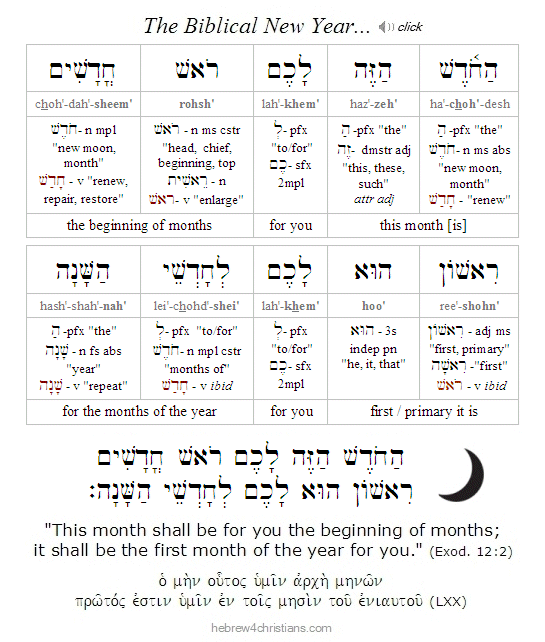 |
The new moon of Nisan is the most significant of the "new moons" of the Jewish calendar since it initiates the first month of the Biblical Calendar - and therefore represents the Biblical "New Year's Day." Of all the various Rosh Chodesh celebrations, then, Rosh Chodesh Nisan is foundational, since it presents the starting point for the cycle of the yearly festivals (mo'edim) that reveal prophetic truths about the LORD God of Israel and His beloved Son, Yeshua the Messiah, blessed be He.
יְהִי רָצוֹן מִלְּפָנֶיךָ יהוה אֱלהֵינוּ
וֵאלהֵי אֲבוֹתֵינוּ
שֶׁתְּחַדֵּשׁ עָלֵינוּ שָׁנָה טוֹבָה וּמְתוּקָה
בַּאֲדנֵינוּ יֵשׁוּעַ הַמָּשִׁיחַ אמן
ye·hee · rah·tzon · meel'·fah·ne'·kha · Adonai · E·loh·hey'·noo
ve·loh·hei · a·voh·tey'·noo
she'·te·cha·desh · ah·leiy'·noo · shah·nah · toh·vah · oo·me·too·kah
ba·a·doh·ney'·noo · Ye·shoo'·a · ha'·mah·shee'·ach [ah·mein]

"May it be your will, LORD our God
and God of our fathers,
that you renew for us a good and sweet year
in our Lord Yeshua the Messiah." [Amen]

Download Study Card
Addendum:
Again, there are two main new years: one in Spring, called Rosh Chodashim, and one in the Fall, called Teruah, or "Rosh hashanah." Both dates, Nisan 1 (spring) and Tishri 1 (fall) divide the calendar into two mirroring halves of each other.
God is prophetically working with the Jewish people and Israel, and therefore we follow the worldwide Jewish calendar because all prophetic events regarding eschatology have to do with Israel and the Jewish people. The LORD has unfinished business with the Jewish people, and he is returning to Jerusalem to establish Zion and fulfill the promises given to the Hebrew prophets of Israel. Amen!
This week's Torah:
Parashat Shemini - פרשת שמיני
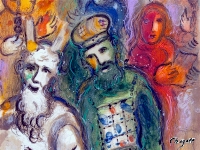
03.31.24 (II Adar 21, 5784) Shavuah tov, chaverim! This week's Torah reading, called parashat Shemini ("eighth"), continues the account of the seven-day ordination ceremony for the priests (as described earlier in Parashat Tzav). During each of these "seven days of consecration" Moses served as the first High Priest of Israel by offering sacrifices and training Aaron and his sons (i.e., the kohanim or priests) regarding their duties at the mishkan (i.e., "Tabernacle"). On the eighth day however, (i.e., Nisan 1), and just before the anniversary of the Passover, Aaron and his sons began their official responsibilities as Israel's priests. In the midst of the dedication, however, tragedy struck as Aaron's sons Nadav and Abihu took it upon themselves to make their own offering before the Holy of Holies of the tent. Since this was not the prescribed means of offering sacrifice, God considered the incense offered to be "strange fire" (esh zarah) and both sons were tragically consumed by fire before the LORD (Heb. 10:29,31). Aaron was required to remaine silent as his sons' bodies were removed by his cousins, and Moses then warned Aaron's two remaining sons, Eleazar and Ithamar, not to mourn during this sacred occasion.
The portion ends with a list of which animals, birds, fish and insects are permitted or forbidden as food, which subsequently provided the framework for Jewish dietary law (i.e., kosher law). The Israelites were permitted to eat any mammal that has both a split hoof and chews its cud (Lev. 11:3). Likewise, only fish that have both scales and fins were to be regarded as kosher. A list of acceptable (i.e., non-predatory) birds was given, along with the commandment not to eat any insects unless they have a pair of jointed legs used for leaping. The dietary laws were intended to sanctify the Israelites by separating them for holiness: "For I am the LORD your God. Consecrate yourselves therefore, and be holy, for I am holy."
Providentially considered, it is no coincidence that the inauguration of the Sanctuary is directly connected to the Passover, since the daily sacrifice of the Lamb (i.e., korban tamid: קָרְבָּן תָּמִיד) served as an ongoing memorial of the Exodus from Egypt (יציאת מצרים) -- and indeed all the laws of sacrifice (תורת קרבנות) form the central teaching of the Torah itself. Reflect upon the fact that the central sacrifice of the Mishkan (i.e., "Tabernacle") was that of a defect-free lamb offered every evening and morning upon the altar in the outer court, along with matzah and a wine offering, signifying the Passover Lamb of God given sacrifice for us. This is called "God's Food" in the Torah (Exod. 29:38-42; Num. 28:4-10; John 1:29).
The Life is in His Blood...
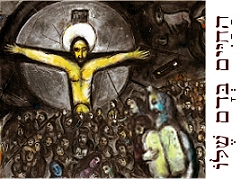
[ The following is related to our Torah reading this week, parashat Tzav... ]
03.29.24 (II Adar 19, 5784) Our Torah portion this week, parashat Tzav, describes various types of sacrifices (korbanot) that were to be offered at the Mishkan. These include the olah (עֹלָה), or whole burnt offering, the minchah (מִנְחָה), or grain offering, the chatat (חַטָּאת), or sin offering, the asham (אָשָׁם), or guilt offering, the shelamim (שְׁלָמִים), or peace offerings, and the todah (תּוֹדָה), or the thank offering (Lev. 7:37-38). In addition, prohibitions regarding eating fat (חֶלֶב) and consuming blood (דָּם) are also given.
Sacrificial blood was to be meticulously controlled, only to be shed through ritual slaughter or "shechitah" (שְׁחִיטָה) at the Mishkan, and carefully collected and sprinkled upon the altar according to prescribed rituals (Lev. 17:1-7). It was forbidden to offer sacrifices in any other place or using any other methods, such as upon a hilltop under the night sky or through pagan mystery rites. Moreover, the consumption of both fat and blood was strictly prohibited: "Whoever eats of the fat of an animal (חֵלֶב מִן־הַבְּהֵמָה) of which a food offering may be made to the LORD shall be cut off from his people. Moreover, you shall eat no blood whatever, whether of fowl or of animal, in any of your dwelling places. Whoever eats any blood, that person shall be cut off from his people" (Lev. 7:25-27).
Since "soul of the flesh" (i.e., nefesh ha'basar: נֶפֶשׁ הַבָּשָׂר) is in its blood, it is regarded as sacred, and the one that eats it is regarded as a "soul eater" who shall be cut off from his people" (נִכְרְתָה הַנֶּפֶשׁ הָאֹכֶלֶת מֵעַמֶּיהָ) The Hebrew word "karet" (כָּרַת) means to be "cut off" from the people of God, a form of "excision" or social ostracism, though some of the sages have said that it literally meant invocation of the judgment of death. For example, Rashi said being "cut off" meant that the person's days would be shortened and that his offspring would die off. A crime that is undetected and never prosecuted also invokes karet judgment, which is a form of punishment meted out by God.
The sages said that while the fat that covers the liver, the kidneys, and the stomach -- called "chelev" (חֶלֶב) -- is prohibited, other animal fat, called "shuman" (שׁוּמָן), may be eaten or used for other purposes (Lev. 3:3; Exod. 29:13). Chelev was sacrificially offered to God from the beginning, when Abel offered the firstlings of his flock and their "fat portions" (Gen. 4:4). Some of the sages have suggested that the prohibition against eating fat was given because it represents the pride, indulgence, and haughtiness of the wicked, as it says in Psalm 17:10, "They are enclosed in their own fat; with their mouth they speak arrogance," and therefore it must be placed on the altar because glory only belongs to the LORD (Psalm 93:1; Jer. 9:24).
The blood, on the other hand, is understood to be the carrier of the soul of the animal (נִשְׁמַת החיה), and therefore it was forbidden to consume or "incorporate" it into the body made in the image of God. This is to "eat the soul," as mentioned above. The law against consuming blood was given from the beginning, before the Sinai revelation, as God judged Cain for shedding the blood of his brother (Gen. 4:10), and God Noah was later instructed about the sanctity of blood as the instrumentality of life and was therefore forbidden from eating it (Gen. 9:4). The blood is the vital principle of the soul, the means of life itself, and therefore it is sacred. It belongs to God alone. Therefore manslaughter is one of the fundamental commandments God gave to Noah as well (Gen. 9:5-6). These earlier prohibitions were repeated in the Mishkan's sacrificial system, and they were later ratified by the disciples of Yeshua at the time of the First Council in Jerusalem regarding Gentile observance of the law (Acts 15:13-21).
The sanctity of blood is at the heart of the idea of "sacrifice" (i.e., zevach: זֶבַח), and therefore it is never to be regarded as "profane" or common. It is the divine "elixir" of life, the soul of the flesh. "I will set my face against that person who eats blood and will cut him off from among his people. For the life of the flesh (נֶפֶשׁ הַבָּשָׂר) is in the blood, and I have given it for you on the altar to make atonement (i.e, kapparah: כַּפָּרָה) for your souls, for it is the blood that makes atonement by the life" (Lev. 17:10-11). Blood is the vital essence of life, and its separation from the flesh results in death. In matters of sacrificial atonement (כָּפָרָת זֶבַח), or korban (כָּפָרָת קָרְבָּן), however, the blood is sacred and reserved for use exclusively upon God's altar. This is an essential point that ultimately points to Yeshua's vicarious death on behalf of the sinner. It is the essence of the "life-for-life" gospel message itself.
In light of the foregoing discussion, however, we may wonder what Yeshua meant when he said, "Truly, truly, I say to you, unless you eat the flesh of the Son of Man and drink his blood, you have no life in you. Whoever feeds on my flesh and drinks my blood has eternal life, and I will raise him up on the last day" (John 6:53-54). Was Yeshua being deliberately provocative by saying something shocking, or was he pointing to a deeper truth about the meaning of his mission? Let's take some time to walk through this...
Remember the basic interpretative principle that "a text without a context is a pretext," which implies that the meaning of a particular passage must be understood from the larger literary environment that determines its sense. When and in what circumstances Yeshua had said these words, then, will help us to better understand what he was saying. And since these words are found in the sixth chapter of the Gospel of John, to get a sense of the context for this particular passage we need to back up and quickly review the five preceding chapters.
The first chapter of John is a prologue that declares the miracle of the incarnation of Messiah, and declares that Yeshua is none other than the eternal God in the flesh (John 1:1-3). He is the "True Light" that has come into the world, the only begotten son ("ben yachid") of the Father (John 1:14, 18), the promised Savior of Israel and indeed of the whole world. He is prophetically attested to be the appointed Lamb of God who takes away the sins of the world.
Following this majestic prologue, testimony is given of the miracles and words of Yeshua. In chapter 2 we read about a wedding party in Cana where Yeshua turned water into wine, revealing His glory. Afterward he began his public ministry by going to Jerusalem and driving out merchants from the Temple, declaring that his body was the true Temple of God (John 2:21). The fame of Yeshua grew as performed various miracles and many believed in him.
In chapter 3, a prominent leader of the Pharisees named Nicodemus heard of the miracles of Yeshua and ventured to visit him at night. Yeshua wasted no time by explaining to him that he needed to "born again" in order to see the Kingdom of God. He explained to Nicodemus that he needed to get past his "natural biases" and to think in spiritual terms. "That which is born of the flesh is flesh, and that which is born of the Spirit is spirit, so do not marvel that I said that you must be born again" (John 3:6-7). He further explained that just as Moses lifted up the serpent in the desert to save those plagued with death, so the Son of Man would be lifted up, so that all who believe in Him would not perish but have everlasting life. Everyone who looks to the Son and believes in him shall find eternal life (John 3:14-16).
In Chapter 4 Yeshua encountered a "Samaritan" woman at the well of Jacob and revealed himself as the source of "Living Water" (i.e., mayim chaim: מַיִם חַיִּים) and the Messiah of Israel (משיח ישראל). After disabusing her cultural beliefs, Yeshua told her that salvation comes from the Jews, and he reminded her that those who worship God must do so "in spirit and truth." The woman was so impressed she went back to her town, testifying about Yeshua, and many Samaritans came to believe in him. The chapter concludes with Yeshua performing a second miracle in Galilee, healing a royal official's son, which resulted in his household coming to faith.
In chapter 5 Yeshua healed a paralytic man at the Bethesda mikveh pool on the Sabbath day, resulting in a "religious" conflict with the Jewish leaders who then conspired that he should be put to death (John 5:16-18). Yeshua defended his action by declaring his unity with the Father as therefore was exercising his authority to give life and to make divine judgment. He then proclaimed that whoever hears his message and believes that God sent him has eternal life; that he will not come into judgment, but has passed from death to life (John 5:24). He rebuked the spurious religious leaders: "You search the Scriptures, for in them you think you have eternal life; but it is these very Scriptures that testify of me," and he further said "if you believed Moses, you would believe me; for he wrote of me" (John 5:39, 47).
Now after reviewing some of the general context, we come to chapter 6, where Yeshua taught that he is the "Bread of Life" (לֶחֶם הַחַיִּים) and made the astounding claim that "unless you eat the flesh of the Son of Man and drink his blood, you have no life in you" (John 6:53). Note that the chapter begins with Yeshua crossing over from Galilee to the eastern side of the lake as a great multitude of people followed after him, hoping to be healed or perhaps to witness a miracle. Yeshua then went into the high country there and sat with his disciples. The text says it was near the time of the Passover so perhaps many of the crowd were pilgrims for the festival (John 6:4). When Yeshua saw the gathering crowd, however, he rhetorically asked Philip, one of his disciples, where they could buy bread to feed all the people. After saying that he could only find five barley loaves and two fish, Yeshua instructed his disciples to have the people sit down, and after reciting the blessing, he distributed the loaves and fish to the disciples who then gave them to the people, and the food supply miraculously multiplied until everyone had eaten their full.
Once the crowd realized that a great miracle had happened, they clamored to take Yeshua by force to make him king, but Yeshua departed to the mountain alone, and the disciples later left by boat to return to Capernaum without him. A storm arose, however, and the disciples were in jeopardy. Suddenly they saw Yeshua walking on the water approaching them. When they received him into the ship, the vessel immediately came to the land where they had been heading. The following day the crowd caught up with Yeshua and they asked why he had left. Yeshua replied saying "you seek me, not because you saw signs, but because you ate your fill of the loaves. Do not work for food that spoils, but for food that endures to eternal life, which the Son of Man will give you" (John 6:26-27). This is the spiritual food (אוכל רוחני) that comes from believing in Yeshua; this food is given through the work of faith (John 6:28-29).
As we read this it becomes apparent that the crowd could not fathom what Yeshua was saying, despite having previously witnessed his miracle of feeding 5,000 people, so they brazenly asked for yet another sign to validate his message. After all, Moses gave the people manna from heaven, so why shouldn't Yeshua do so as well?
Yeshua replied by first correcting their thinking. Moses had not given the bread from heaven, but God did, and that is meant by "the bread from heaven," and then he identified himself as the true bread from heaven (הַלֶּחֶם הָאֲמִתִּי מִן הַשָּׁמַיִם), "Living Bread" (לֶחֶם הַחַיִּים) that imparts spiritual and eternal life (John 6:35-36). Note also that when Yeshua said "I am the bread of life" he was using the "ehyeh" Name of God (אֶהְיֶה), the "I AM" utterance of God's revelation to Moses (Exod. 3:14). For Yeshua, true bread from heaven is his flesh (לֶחֶם מִבְּשָׂרוֹ) which he gives for the life of the world (John 6:51), which restates the famous message of the crucifixion given earlier in the gospel: "For God so loved the world that He gave his only Son, that whoever believes in him would not perish but have everlasting life" (John 3:16).
Yeshua's message to the crowd was an earnest appeal to have faith. The one who believes in Him has eternal life, and this corresponds to "eating the Bread of Life," that is, partaking of the spiritual food (i.e., truth) that Yeshua gives. As St. Augustine of Hippo once said: "For to believe in Him is to eat the living bread; he that believes eats; he is sated invisibly."
"I am the living bread which came down from heaven. If anyone eats of this bread, he will live forever; and the bread that I shall give is My flesh, which I shall give for the life of the world" (John 6:51). It may be wondered why Yeshua switched the metaphor from eating manna to eating his flesh, and why he (more shockingly) spoke of drinking his blood, which was utterly forbidden in the Torah (Lev. 7:25-27). Yeshua continued: "Most assuredly, I say to you, unless you eat the flesh of the Son of Man and drink His blood, you have no life in you. Whoever eats my flesh and drinks my blood has eternal life (חַיֵּי עוֹלָם), and I will raise him up at the last day. For my flesh is real food (מַאֲכָל אֲמִתִּי), and my blood is read drink" (מַשְׁקֶה אֲמִתִּי). Now are these words of hyperbole meant to shock the people into engaging his message, or was Yeshua using a deeper symbolism to make his point? The language here is indeed figurative, as we have seen, and therefore we need to find a spiritual application to Yeshua's teaching.
At this point a few things seem clear. First, we find eternal life by being in a faith-relationship with Yeshua. Because he took on human flesh and shed (i.e., gave) his blood for us, we are given divine life as we partake of his gift. Based on this (and numerous other Scriptures), the result of believing in him is the same as "eating his flesh and drinking his blood," that is, participating in or joining his life. Second, Yeshua was clearly using metaphorical and spiritual language, and forgetting this will bring confusion. Regarding those who were offended at his teaching, he said: "It is the spirit that gives life (הָרוּחַ הִיא הַמְחַיָּה); the flesh is of no help at all. The words that I have spoken to you are spirit and life" (John 6:63). Upon hearing this, some who seemed to be Yeshua's disciples could not make the step of faith to see beyond the offence here and they therefore decided to no longer follow him. Yeshua then asked his twelve disciples whether they too wanted to go away. Peter then confessed: "Lord, to whom can we go? You have the words of eternal life. We have come to believe and know that you are the Holy One of God" (John 6:67-69).
If you will not eat the flesh and drink the blood of Yeshua, you have no life in you, or, using the "logical contrapositive" we can validly rephrase this by saying, if you have life, then you will eat and drink the life of the Lord. To eat Yeshua's flesh and blood means to utterly depend upon him; it means trusting him for your life and destiny itself. Remembering the Lord's sacrifice for us - whether through weekly kiddush (communion) or during the Passover Seder - is to "feed on him" through the heart of faith. Amen. Yeshua is the answer for our hunger for life. As he promised: "I am the bread of life. Whoever comes to me shall never hunger; and whoever believes in me shall never thirst" (John 6:35).
During his last Passover Seder with his disciples before his death, Yeshua identified the broken matzah (i.e., yachatz bread) with his body, and the Cup of Redemption (i.e., kos ha'geulah) with his shed blood to signify the new covenant with God (Matt. 26:26-28). This is the basis of our "communion" with the Lord, and this is perhaps the key to understanding the distinction between the Torah's prohibition of consuming blood and Yeshua's commandment to do so. For the Mishkan and its ordinances were a "pattern" or "shadow" of something yet to come, namely, the incarnation of Yeshua as Immanuel (עִמָּנוּ אֵל), "God with us," who would substantiate the true meaning of the sacrifices through his avodah (priestly service). The physical "tent of meeting" became his flesh and blood to dwell among us.
The very first time the word "blood" (דָם) occurs in the Scriptures concerns the death of Abel, the son of Adam and Eve who was murdered by his brother Cain. After Abel's blood was shed, the LORD confronted Cain and said, "What have you done? The voice of your brother's blood is crying to me from the ground" (Gen. 4:10). Since blood is the carrier of life, it bears the energy and vitality of life: it has its own spiritual "voice." Likewise, the blood of Yeshua (דַּם ישׁוע), the true Lamb of God who died upon the cross, "speaks" on our behalf in intercession, and reverses the power of death by creating a barrier that death can no longer cross, since the death of the sacrificial victim "exchanges" the merit and power of life.
Unlike the blood of Abel that "cries out" for justice, the blood of Yeshua cries out for mercy (Heb. 12:24). Putting our trust in the provision of God's sacrifice causes His wrath (or righteous judgment) to pass over while simultaneously extending love to the sinner.... This is the essential message of the gospel itself, that we have atonement through the sacrificial death, burial, and resurrection of Yeshua our Savior, the great Lamb of God (שׂה האלהים). As Yeshua said, "I tell you the solemn truth, the one who hears my message and believes the One who sent me has eternal life (חַיֵּי עוֹלָם) and will not be condemned, but has passed over (i.e., μετά + βαίνω, lit., "crossed over" [עָבַר]) from death to life" (John 5:24). Just as God's judgment passes over from life to death on my behalf; so His love passes over from death to life on my behalf... The medium for this exchange is the body and blood of Yeshua, and this is the deeper meaning of eating his flesh and drinking his blood. The life of God is in His blood.
The metaphor of eating his flesh and drinking his blood is paradigmatic of Yeshua's entire ministry and message. It is a climactic summary. His words will seem paradoxical and even blasphemous to those who regard him as a merely human teacher, but they force the issue of faith regarding the efficacy of his atoning sacrifice for us. Yeshua pointed to his flesh and blood sacrifice on the cross to be the means of life - a message anathema to human pride.
Whenever you eat or drink something, you take it in, you receive it, and in a sense it becomes a part of you. Eating Yeshua's flesh means receiving his presence as being "for you," that is, given on your behalf. It is to partake of his presence as the source of your life. Drinking Yeshua's blood means sharing the power of his life, receiving it as life-giving spiritual energy. "For the life of the flesh (נֶפֶשׁ הַבָּשָׂר) is in the blood, and I have given it for you on the altar to make atonement (כַּפָּרָה) for your souls, for it is the blood that makes atonement by the life" (Lev. 17:10-11). We have life because of the blood of Yeshua was given on our behalf. Hallelujah! Let us rejoice in our Savior Yeshua! The life of God is in His blood...
Hebrew Lesson
Psalm 34:8 reading (click for audio):
Note: I wrote this post in a bit of a rush. It seems like there is never enough time to cover everything in the weekly Torah portion, especially during holiday season! If you detect any typos, etc., -- thank you for your patience. Shabbat shalom. - John
Word Became Flesh...

[ The following is related to our Torah reading this week, parashat Tzav.... ]
03.29.24 (II Adar 19, 5784) Our Torah portion this week (i.e., Tzav) begins, "The Eternal (יהוה) spoke to Moses" (Lev. 6:8), which paradoxically refers to God as if He is a man... Theologians sometimes call this sort of language "anthropomorphism," though it clearly anticipates the great Incarnation itself, when the Timeless and Infinite One became embodied in time and space in the person of Yeshua. Indeed Yeshua is called the "Word of God" who became flesh and "tabernacled" in our midst (John 1:1,14). "All things were made by Him and without Him was not anything made that was made" (John 1:3). And just as the Angel of the LORD (מַלְאַךְ יְהוָה) mediates the Divine Presence to the heavenly host, so Yeshua mediates the Divine Presence to humanity as the "Son of Man" (בֶּן־הָאָדָם). "For the Eternal One who said, 'Let light shine out of darkness,' has shone in our hearts to give the light of the knowledge of His glory in the face of Yeshua the Messiah" (2 Cor. 4:6).
In the Book of Hebrews we read that "in these last days God has spoken to us ἡμῖν ἐν υἱῷ," which literally means God speaks in the language "of Son" (Heb. 1:2). The Eternal speaks as the One who emptied Himself to become one of us, who clothed himself in our humanity, so that he could touch us, empathize with us, and to ultimately die for our atonement as the "Lamb of God."
Hebrew Lesson
Psalm 33:6 Hebrew reading (click):
Passion's Inner Fire...

[ The following is related to our Torah reading this week, parashat Tzav. Please read the Torah portion to find your place here... ]
03.29.24 (II Adar 19, 5784) "This is the law for the burnt offering (olah): it is what ascends on the hearth of the altar all night long, until morning..." (Lev. 6:9). In a Sefer Torah (i.e., handwritten Torah scroll), the Hebrew word for "hearth," or the floor of the altar's fireplace, is mokdah (מוֹקְדָה), traditionally written by the scribes using a miniature letter Mem (מ). The Kotzker Rebbe comments that since the altar symbolizes inner life, the smaller Mem teaches that the fire in one's soul should be understated - that it should burn within as an steady inner passion - not with flash, ostentation, or flamboyance. People sometimes get confused and think that passion for God means hype, loud music, ostentatious rituals, and so on, though it was steady "inner fire" that moved Yeshua to remain focused to endure the cross.
Hebrew Lesson
Psalm 39:7 Hebrew (click):
Dear friends, the Lord has not taken us this far only to abandon us now... He has solemnly promised never to leave nor forsake us (Deut. 31:8; Isa. 41:10; Heb. 13:5). There is wonderful joy ahead, even though you have to endure many trials for a little while (1 Pet. 1:6). Therefore let your heart of faith give thanks to the LORD, for His love and mercy endure forever. Shalom and every blessing be yours in Yeshua...
The Humility of Truth...

03.28.24 (II Adar 18, 5784) An honest person is invariably a humble person, since honesty compels the heart to confess the truth that it is quite often ignorant, incapable of understanding even the simplest matters of life, and entirely powerless to heal itself... People may argue over words, concepts, and abstractions, inflating their opinions above even the Reality they purport to define, but the humble soul acknowledges that he doesn't really know much about anything... And if "all the efforts of the human mind cannot exhaust the essence of a single fly," then how is it that people get puffed up and proud regarding their supposed knowledge of life itself? It is far better to approach life in deep reverence, wonder, love, and childlike trust than to profess your dogma based on pride and illusions...
To a visitor who described himself as a seeker after Truth the sage said, "If what you seek is Truth, there is one thing you must have above all else." "I know," said the man, "an overwhelming passion for it." "No," the sage replied, "rather an unremitting readiness to admit you may be wrong."
Ours is an age marked by suspicion, arrogance and severely impaired thinking. Gone are the days of respectful dialog and the use of intelligence and logic. The self-styled deconstructionists of today are emotionally incontinent solipsists who are so self-absorbed that they cannot tolerate any dissent from their own narrative and perspective. They are lost to themselves because they lack self-transcendence. In general the so-called "intellectuals" today have nothing to offer other than despair, anger, and veiled threats of violence.
Sadly the postmodern derangement syndrome has affected even established disciplines such as medicine and science, where opinion has been politicized and dogmatized for the sake of economic interests (i.e., worldly power). Be careful of those who think they have all the answers; beware of those who think they know better than others what is best for them! As C.S. Lewis forewarned: "Of all tyrannies, a tyranny sincerely exercised for the good of its victims may be the most oppressive....Those who torment us for our own good will torment us without end for they do so with the approval of their own conscience. To be "cured" against one's will and cured of states which we may not regard as disease is to be put on a level of those who have not yet reached the age of reason or those who never will; to be classed with infants, imbeciles, and domestic animals" (God in the Dock).
It has been wisely said that "education is the process of turning cocksure ignorance into thoughtful uncertainty." Intellectual humility means admitting to the humbling reality that we all have biases and blind spots and therefore we may be mistaken. Such humility is an intellectual mark of grace, since it is willing to allow others their own perspectives while we work through our own convictions and truth claims. The difference between a real scientist and a fraud is that the real scientist will question his or her conclusions and be tentative in declaring the implications of his research, whereas the fraudulent scientist will irrationally demand that his or her ideas be accepted without question.
"Into this pond were flushed the ashes of some four million people. And that was not done by gas. It was done by arrogance, it was done by dogma, it was done by ignorance. When people believe that they have absolute knowledge, with no test in reality, this is how they behave. This is what men do when they aspire to the knowledge of gods." Science is a very human form of knowledge. We are always at the brink of the known; we always feel forward for what is to be hoped. Every judgment in science stands on the edge of error and is personal. Science is a tribute to what we can know although we are fallible. In the end, the words were said by Oliver Cromwell: "I beseech you in the bowels of Christ: Think it possible you may be mistaken." (Jacob Bronowski)
We all walk by faith, but faith (by definition) implies that we do not have all the answers in front of our eyes. "We see through a glass darkly," and that means we should respect the deep complexity that is bound up in all things, and furthermore that we should acknowledge that we are still learning, still growing, still seeking the truth for our lives. Those who refuse to concede their own fundamental ignorance regarding most things in life are fooling themselves. "God opposes the proud, but gives grace to the humble" (James 4:6; Prov. 3:34).
Let me add that regarding matters of faith we cherish the truth of revelation and regard it of utmost concern, but this means knowing from a place of real humility, for what do we truly know of the unseen world and of the heavenly power? You may profess perfect doctrine and yet exist untruthfully, whereas you might not have perfect doctrine, but exist truthfully. The devil knows how to quote Scripture, and often does so, but is a devil still. We must follow the path of peace, even if that requires that we "overlook" some of our doctrinal convictions for the sake of love. I don't mean we should throw away our principles, God forbid, but we rather hold them with an inward passion that is at the same time willing to be overlooked, to suffer, to be misunderstood, and even to be mistreated by others. The key here is not to indulge in self-pity or resentment, which does ud no good. And above all we ask God for divine wisdom. God is faithful and true; if we ask Him for bread, he won't give us a stone (Luke 11:11).
Hebrew Lesson
Proverbs 3:34 reading (click):
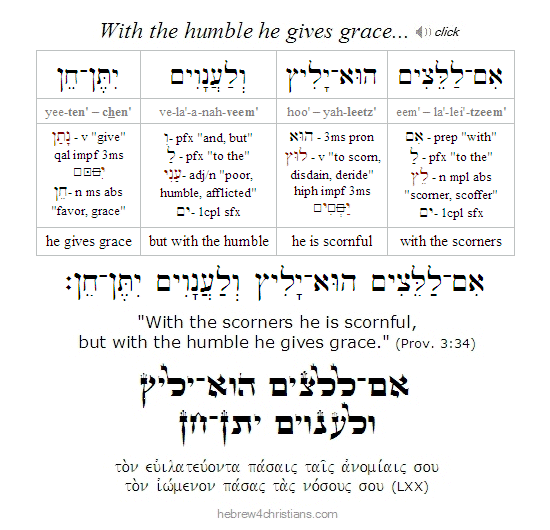 |
Personal note: I have been very distracted by various troubles lately and I humbly ask for your prayers. I am also working on a new article on the parasha that I hope to post sometime later today. Shalom and love to you my dear friends. - John
The Tenth Red Heifer...
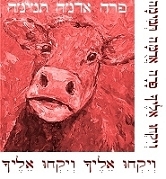
[ This coming Shabbat is called "Shabbat Parah," the Sabbath of the [red] Cow." Besides reading the regular Torah reading (i.e., Tzav), we read about the mysterious red heifer sacrifice.... ]
03.27.24 (II Adar 17, 5784) Longstanding Jewish tradition says there were nine Red Heifers (parot hadumot) offered so far on behalf of the Jewish people. The first was offered by Moses and Eleazar; the second by Ezra the Scribe; two more were offered by Simon the Righteous and another two by Yochanan the High Priest; a seventh was offered by the prophet Elijah; the eighth by Hanamel the Egyptian, and the ninth by Yishmael the son of Piabi (15-16 AD). The tradition says that the tenth (and final) Red Heifer will be burned by the Messiah at the time of the rebuilding of the future Temple (Mishnah, Parah 3:5).
Many well-meaning Christians get excited over occasional reports that a new Red Heifer has been born, understanding this to be a sign from God that the time to rebuild the Jewish Temple is at hand. But should a Red Heifer be found and later sacrificed, how should we regard this -- especially in light of the Brit Chadashah and its clear teaching that Yeshua is the substance of the what the shadow of the Red Heifer represents?
It is important to remember that the red heifer that will be used for the Third Temple (i.e., the "Tribulation Temple") is of prophetic interest but of no real consequence, since Yeshua is the Substance of the Red Heifer who cleanses us from the impurity of death... Yeshua will indeed establish the Temple of Ezekiel's vision during the Millennial Kingdom after His return in glory, but that is not to be confused with the Third Temple of acharit ha'yamim ("end of days").
For more information about the Red Heifer sacrifice, see the "Gospel of the Red Cow" article as well as the "Tenth Red Heifer" page.
Hebrew Lesson
Psalm 51:7 reading (click):
Substance of Hope...
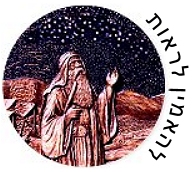
03.27.24 (II Adar 17, 5784) "Faith is the foundation (i.e., ὑπόστασις: the "substance," reality, underlying essence, etc.) of hope, the conviction of the unseen... Without faith it is impossible to please God, for whoever would draw near must believe that God exists and rewards (μισθαποδότης) those who seek him" (Heb. 11:1,6).
Note that God is pleased when we seek his presence, that is, when we when we look past the ephemera and ambiguity of the phenomenal world for the truth about spiritual reality (2 Cor. 4:18). For our part, faith resolves to confession (ὁμολογέω), that is, aligning our perspective and focus to agree with the revelation and message of divine truth and verbally declaring our conviction. We must say that we believe, and affirm it with all our heart (Rom. 10:9). As it says, "I will make Your faithfulness known with my mouth" (Psalm 89:1).
When you encounter tribulation, or experience some crisis of faith, reaffirm aloud: "I believe in God's promise..." Physically expressing your faith is itself an act of faith, and this encourages your soul to trust in God's healing reward even in the present struggle or darkness. "Seek the LORD and His strength; ask for His Presence at all times" (Psalm 105:4).
Hebrew Lesson
Psalm 105:4 Hebrew reading (click):
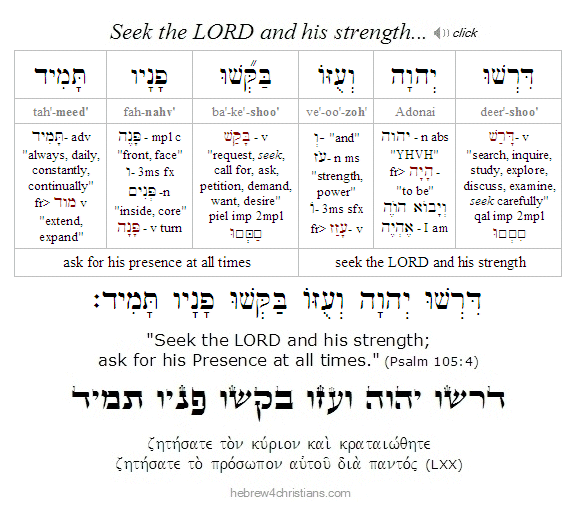 |
Your Reason for Being...
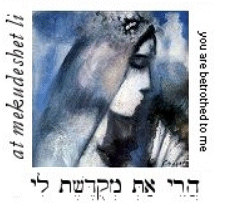
03.27.24 (II Adar 17, 5784) From our Torah reading for this week (i.e., parashat Tzav) we read: "This is the thing that the LORD commanded you to do, so that the glory of the LORD may appear to you: Draw near to the altar and offer your sin offering and your burnt offering and make atonement for yourself" (Lev. 9:6-7).
In this connection, have you considered why you were born into this world? What is your purpose, destiny, and end? The Torah states that you were personally created by Almighty God, who breathed out the breath of life (נִשְׁמַת חַיִּים) into you, and then redeemed your life so you could know the glory of God and spiritual reality. As it is written: "Worthy are you, our Lord and God, to receive glory and honor and power, for you created all things, and by your desire they existed and were created" (Rev. 4:11).
God creates all things for his glory and purposes, which indeed is the first blessing recited over the bride and groom in a traditional Jewish wedding: בָּרוּךְ אַתָּה יְהוָה אֱלהֵינוּ מֶלֶךְ הָעוֹלם שֶׁהַכּל בָּרָא לִכְבוֹדו / "Blessed are you Lord our God king of the universe, who has created all things for his glory." The purpose of life is to know and love God, to walk in His light and truth, and to glorify his compassion and grace forever...
At a traditional Jewish wedding the groom places the ring on his bride's finger and says: Harei, at mekudeshet li: "Behold, you are betrothed to me." Love and holiness are interconnected, since the beloved is set apart as sacred and treasured. May God help us see the wonder of His love for our lives: "Do not be conformed to the passions of your former ignorance, but as he who called you is holy, you also be holy in all your conduct, since it is written, "You shall be holy, for I am holy" (1 Pet. 1:14-16). Amen, the essence of holiness is God's love...
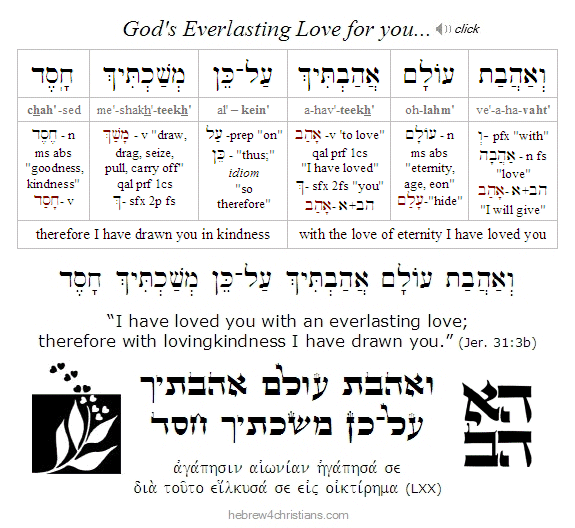 |
Expelling the Darkness...
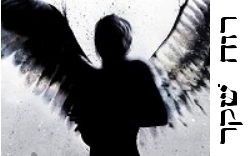
[ "For our struggle is against spiritual forces of evil..." Eph. 6:12 ]
03.26.24 (II Adar 16, 5784) Human life is a battleground of forces, and each person is engaged in a spiritual war for the healing of their soul. Often we are not willing to enter the battle until we have been sufficiently wounded by our own sins: many of us have to become "sick of being sick" until we are ready to seriously engage the underlying issues...
The battle is not optional and there is no place of neutrality or indifference. We must learn to deal with our own inner struggle against evil. Before we can help others to be free, however, we must be free ourselves, and that means learning how to expel the darkness hidden within our own hearts and to walk in God's light. Deliverance means being set free from that which "possesses" us, and that includes the demonic strongholds of fear, anger, envy, lust, and so on. Overmastering impulses can lead the soul to dark thoughts, self-alienation, shame -- a tenuous existence of subjugation and pain. The way of deliverance is to "name the demon," that is, to challenge the ground it claims and to exercise divine authority over our hearts. Above all this means being honest about our struggle and taking a decisive stand against our own oppression... Fighting the "good fight of faith" means caring enough to be healed...
We can only face the demonic if we are willing to be honest with ourselves, for without genuine honesty we cannot see our condition. "A little leaven leavens the whole lump" (Gal. 5:9). We must be willing to confess that there is much within us that remains unhealed, and that we are often unmindful of what really motivates our behavior. Even those things we might suppose as good - our religion or our self-control, for example - can possess us in ways that bring harm to ourselves and others....
When Yeshua expelled the demonic, the afflicted soul was given inner peace and put into their "right mind" (Mark 5:15). In other words, deliverance from madness is linked to God's healing influence in our lives: "For God has not given us a spirit of fear, but of power, and of love, and of a sound (safe) mind" (2 Tim. 1:7). Note that the word translated "safe" comes from the verb sodzo (σῴζω), meaning to be healed from destructive inner conflict. A delivered person has "inner balance" and is not easily overthrown by his conscious (or unconscious) passions. Such a person is grounded in reality: he knows who he is, what he needs, and is realistic about what he can and can't do. His soul is not divided but rather unified, centered, and focused. He is consciously present and accepts life without resistance.
Yeshua gives us "authority" over the demonic to heal (Luke 9:1). The Greek word translated authority is "eksousia" (ἐξουσία), a compound formed from the preposition ek- (ἐκ), meaning "out of," and the noun ousia (ουσία), meaning "being" or substance, thereby suggesting power over physical and spiritual reality. Another way to understand the word, however, is to see it as the ability to see beyond the realm of the transient abide within the realm of the Eternal. The Father represents the unseen, the infinite, the supreme providential and transcendental aspects of the One true God, just as the Son represents the seen, the finite, the suffering and immanent aspects of God... They are One (similarly the Holy Spirit is the Spirit of God, and therefore is One with God). Yeshua was entirely submitted to the will of the Father, which means he was able to let go and trust in the all-encompassing Divine Presence. His life was grounded in his relationship with the Eternal: "He that has seen me has seen the Father" (John 14:9). Since Yeshua lived in complete unity or "oneness" with God, he was completely centered and fully conscious of his identity as God's Son. His authority came from being properly aligned or related to God the Father, that is, ultimate reality, which enabled him to be a vessel or conduit for the expression of God in the world.
The Scriptures state: "Yield yourselves to God; take a stand against the devil and he will flee from you" (James 4:7). We first ground ourselves in what is real - surrendering and accepting the given moment - and then we decisively refuse to be taken captive by our imagination, fear, lust, etc. When we turn to the light the darkness will be expelled (John 1:5). Let's choose life and therefore live (Deut. 30:19); let's take our stand against the powers of hell; let's repudiate our fears and "spiritually slay" whatever seeks to drive and control us. May our hearts grow quiet before the Divine Presence and abide in peace...
Hebrew Lesson
Joel 2:32a Hebrew reading (click):
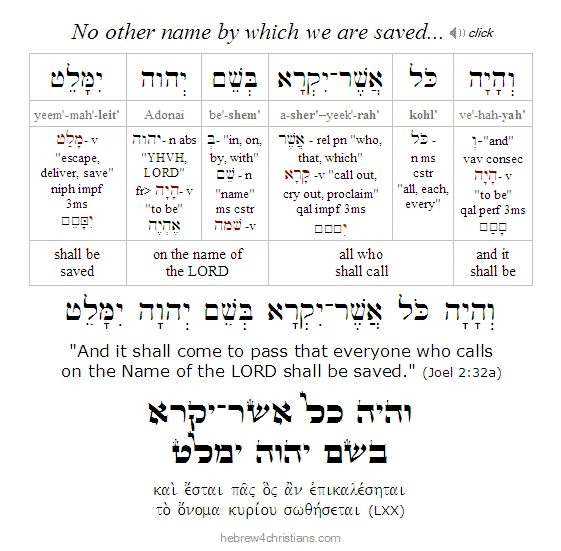 |
The Torah of Faith...
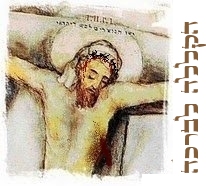
03.25.24 (II Adar 15, 5784) Regarding the intensely existential question of living by faith, Soren Kierkegaard once wrote, "The easiness of Christianity is distinguished by one thing only: by the difficulty. Thus the Master's yoke it easy and its burden light -- for the person who has cast off all his burdens, all of them, the burdens of hope and of fear and of despondency and of despair -- yet it is difficult." Soren here undoubtedly speaks in ironic understatement. Casting off all your burdens - categorically every last one of them - is more than difficult, but simply impossible apart from the miracle of God's intervention within your heart. Ultimately the miracle that changes you is that you come to truly believe (John 16:31).
Sins can be like great possessions that are difficult to give up. Among other things, we must forgive ("give away") our sins (both our own and those against us), and that means trusting God enough to bear our wounds for us. Forgiveness allows us to move on with our lives by letting go of the pain of the past (2 Cor. 5:16). It is seemingly "easy" to understand this, but it is difficult, nay it is impossible, to truly live it.
The message of the cross is scandalous to human pride because it reveals that it is impossible to save ourselves. This is the great stumbling block: to meaningfully confess the truth of our inner loss. We trust Yeshua's finished work performed on our behalf -- the miracle -- and have no confidence in our own supposed works of righteousness (John 6:29).
Nevertheless, because with God all things are possible, and in light of the miracle of salvation, the Torah of Yeshua (תּוֹרַת יֵשׁוּעַ), does include some commandments, including the following:
- "Thou shalt believe thou are my beloved - entirely accepted and entirely forgiven."
- "Thou shalt forget the shame of thy past."
- "Thou shalt stop thinking of your sin but rather of My great remedy for you."
- "Thou shalt let me carry your woundedness far away, yea, to the bottom of the sea."
- "Thou shalt live in My love and be filled with its spirit."
- "Thou shalt believe your end will be good, and that love is stronger than justice."
- "Thou shalt fear nothing but that which causes you to lose hope in My love."
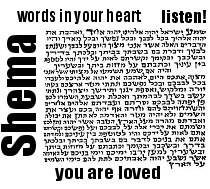 |
The difficulty, I repeat, is to genuinely believe that the love's miracle is for you - and that therefore you really are a "new creation" in the Messiah (2 Cor. 5:17). The reason this is difficult is because we are still living in an "already-not-yet" place of exile, the "two-souled" state of being that only is able to "see through a glass darkly." We are trusting in God, yet we must "work out" our own salvation with fear and trembling (Phil. 2:12). But notice that we "work out" what God has already "worked in," since it is "God who works in you both to will and to do His good pleasure" (Phil. 2:13). Please do not miss this - God first works His love into our hearts, and then we are able to express that in works of love... From start to finish, only genuine faith in Yeshua performs the "work of God" (John 6:28-29), and never our own ludicrous efforts of affecting self-righteousness (Titus 3:5). If you are lacking in the fruit of the Spirit (i.e., the works of God), then the right approach is to turn around and confess your faithlessness: "Lord, I believe; help Thou my unbelief..." (Mark 9:24). Our LORD is near to the brokenhearted and saves the crushed in spirit (Psalm 34:18).
Some people might argue that you must "deny yourself" and "die to yourself" to exercise genuine faith, and while it is indeed true that "unless a seed falls to the ground and dies, it abides alone" (John 12:24), we must remember that the Seed is Yeshua and the power of His Spirit sown in the heart of faith. "Taking up the cross" therefore means so identifying with Yeshua that you are "in union" with his sacrificial death offered up on your behalf. God imparts a new spiritual nature (i.e., heart and spirit) to the one that trusts in Him, an operation of the Spirit that is more manifest than the sun that shines in the clear noonday sky... Taking up the cross is therefore the confession that Yeshua's sacrifice is all-sufficient and therefore all that remains is to continue to trust in his finished work (John 6:29). We are sanctified in exactly the same way we are justified -- by trusting in the miracle of God. Remember, all the imperatives of Scripture are addressed to the "new man" that has been brought to life by God's grace. We are able to obey when we yield to the Torah of the Spirit of Life (תוֹרַת רוּחַ הַחַיִּים) in the Messiah, which is to say, when we are trusting in Yeshua to do and to be all that we will ever need. We do not "die to ourselves" by means of our own efforts, but instead rest in the peace of Yeshua's sacrificial death (and resurrection) for us.
Hebrew Lesson
Psalm 55:22 reading (click):
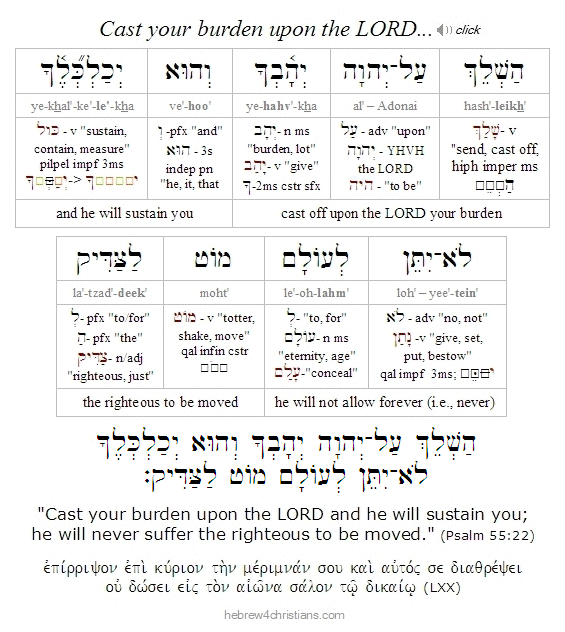 |
Note that the seven (inferred) commandments above are derived from various Scriptures. See Isa. 54:8; Jer. 31:3; Isa 54:4; Jer. 31:34; Heb. 8:12; Isa. 41:10; 45:22; Rom. 4:25; Psalm 103:10-14; John 14:1,27; Mic. 7:19; Isa. 38:17; John 14:21; 15:5,10; Gal. 5:22-23; 1 Cor. 13; 1 John 3:1; Rom. 8:28-39; Psalm 89:14; 85:10; Luke 11:42; 1 John 4:18, etc.).
Affirming the Light...
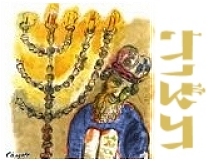
[ "O house of Jacob, come and let us walk In the light of the LORD" - Isaiah 2:5 ]
03.25.24 (II Adar 15, 5784) From our Torah for this week (i.e., Tzav) we read: "The fire on the altar shall be kept burning on it; it shall not be extinguished" (Lev. 6:12). The sages say do not read "burning on it" but rather "burning in him" (בּוֹ), referring to the heart of the priest. And where the Hebrew text says "it (i.e., the fire) shall not be extinguished" (i.e., לא תכבה), read instead "extinguish (תִכְבֶּה) the negative (לא)" by trusting in God's promise for our good, despite any temporary setbacks or apparent failures.
The Holy Spirit imparts the fire of faith that fills our hearts with hope, affirming with "tongues of fire" words of life and light that vanquish darkness. As it is written: "Light dawns in the darkness for the upright; He is gracious, full of compassion, and righteous." (Psalm 112:4).
זָרַח בַּחשֶׁךְ אוֹר לַיְשָׁרִים
חַנּוּן וְרַחוּם וְצַדִּיק
zah·rach · ba·choh'·shekh · ohr · lai·shah·reem
cha·noon · ve·ra·choom · ve·tza·deek

"Light dawns in the darkness for the upright;
He is gracious, full of compassion, and righteous."
(Psalm 112:4)
Download Study Card

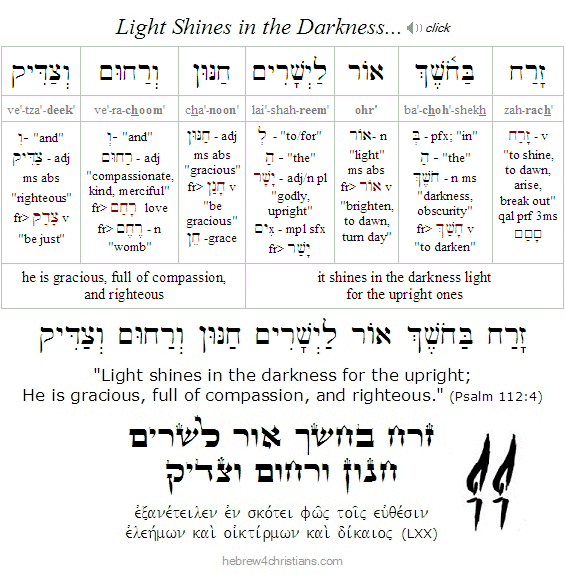
Spiritually speaking, the first step is to find hope... The Divine Light is seen by means of the eye of faith (עין האמונה), and therefore we find strength by trusting in God's Presence, even though we cannot presently see Him (2 Cor. 4:18; 5:7). "Trust in the LORD with all your heart, and do not lean on your own understanding. Know Him in all your ways, and He will straighten your paths. Be not wise in your own eyes; fear the LORD, and turn away from evil" (Prov. 3:5-7). Wait on the LORD and He will strengthen your heart....
We must keep courage, remain steady as we fight the good fight of faith. As it is written, "The LORD is my light and my salvation; whom shall I fear? The LORD is the stronghold of my life; of whom shall I be afraid? When evil men attack me to devour my flesh, when my adversaries and enemies attack me, they totter and fall. Even if an army is deployed against me, I do not fear; even if war is rises against me, I remain full of trust" (Psalm 27:1-3).
The Midrash says, "The Holy One Himself, as it were, made light for the upright. Thus it says, "The LORD is my light and my salvation" (Psalm 27:1) and "When I sit in darkness, the LORD will be a light to me" (Micah 7:8). While I sit in darkness in this world, during these latter days before the promised return of Yeshua, when troubles may afflict me and lawlessness may abound – then God's light will shine brighter still, for the LORD is gracious to all who put their hope in Him, and this favor and love will be manifest for me.
Let us affirm our confidence: The darkness of this world forever is swept back before the overmastering radiance and power of Yeshua, the King of Glory, the Root and Descendant of David, and the Bright Morning Star (Rev. 22:16). Those who believe in Him are given the "light of life" that overcomes the darkness of this world (John 8:12).
 |
Sabbath of the "Red Cow"

[ This coming Shabbat is called "Shabbat Parah," the Sabbath of the [red] Cow." Besides reading the regular Torah reading (i.e., Tzav), we read about the mysterious red heifer sacrifice.... ]
03.25.24 (II Adar 15, 5784) The Sabbath that immediately follows Purim is called Shabbat Parah - the "Sabbath of the [red] Cow." In traditional synagogue services, two Torah scrolls will be removed from the ark, and from the first scroll will be read the Torah portion for the week (e.g., Ki Tisa), and from the second will be read the chapter regarding the laws of the sacrifice of the "Red Heifer" (Num. 19:1-22). The early sages decided to recite the laws of the Red Heifer at this time to recall the remedy of the sin of the Golden Calf, and to remind the people to purify themselves before coming to Jerusalem for the pilgrimage festival of Passover. It is thought that since the sprinkling of the "waters of separation" cleanses from the uncleanness of death, reading this portion will help prepare our hearts for the time of Passover when we celebrate deliverance from death.
The Red Heifer offering is considered a paradox to most Jewish thinkers, though it can be seen as a revelation of the Yeshua our Messiah. The paradox is that the one who offers this sacrifice becomes ritually impure, while the sprinkling of the ashes is used to make people clean... The ritual is considered chok within the Jewish tradition, meaning that it makes no rational sense. The Talmud states that of all the 613 commandments given in the Torah, even King Solomon with all his wisdom could not fathom this decee. However, the sacrifice of Yeshua the Messiah can be understood as the fulfillment of the symbolism of the parah adumah. Both were entirely rare and without defect (sin); both were sacrificed "outside the camp"; both made the one who offered the sacrifice unclean but made the one who was sprinkled by it clean; and finally, both sacrifices cleanse people for priestly service.
The parah adumah had to be a perfect specimen that was completely red, "without blemish, in which there is no defect (mum)." The rabbis interpreted "without blemish" as referring to the color, that is, without having so much as a single white or black hair. This is the only sacrifice in the Torah where the color of the animal is explicitly required. Moreover, the parah adumah was never to have had a yoke upon it, meaning that it must never have been used for any profane purposes.
Unlike all other sacrifices offered at the altar, the parah adumah was taken outside the camp and there slaughtered before the priest, who then took some of its blood and sprinkled it seven times before the Mishkan (thereby designating it as a purification offering). [During the Second Temple period, the High Priest performed this ceremony facing the Temple while atop the Mount of Olives.] Then the red heifer would be burned in its entirety: its hide, flesh, blood, and even dung were to be burned (unlike other Levitical korbanot). Unlike other offerings, all the blood of the sacrifice was to be burned in the fire.
Hyssop, scarlet yarn, and a cedar stick would then be thrown upon the burning parah adumah (these same items were used to cleanse from tzara'at, skin disease). In other words, the blood was assimilated into the ashes of the sacrifice, which were then gathered and mixed with water to create the "water of separation" (mei niddah) for the Israelite community. Note that the word "separation" (niddah) refers to menstrual impurity and harkens to Zech. 13:1: "On that day there shall be a fountain opened for the house of David and the inhabitants of Jerusalem, to cleanse them from sin and from niddah."
Anyone (or anything) that came into contact with a corpse (the embodiment of sin and death) was required to be purified using the mei niddah. The purification procedure took seven days, using stalks of hyssop dipped into the water and shaken over the ritually defiled person on the third day and then again on the seventh day. After the second sprinkling, the person undergoing the purification process would be immersed in a mikvah and then be unclean until the following evening.
According to Jewish tradition, the Red Heifer sacrifice was to atone for the sin of the Golden Calf, though the Torah itself does not make this association. The LORD Yeshua, our High Priest of the New Covenant, is the perfect fulfillment of the Parah Adumah, since he was completely without sin or defect (2 Cor 5:21; John 8:46); he was sacrificed outside the camp (Heb 13:13); he made himself sin for us (2 Cor 5:21); his sprinkling makes us clean (1 Pet 1:2; Heb 12:24; Rev 1:5); and the "water of separation" that his sacrifice created is the means by which we are made clean from the impurity of sin (Eph 5:25-6; Heb 10:22).
Hebrew Lesson
Num. 19:2a Hebrew (click):
Note: The red heifer to be used for the Third Temple (i.e., the false "Tribulation Temple") is of prophetic interest but of no real consequence... Yeshua will establish the Fourth Temple of Ezekiel's vision during the Millennial Kingdom after His return in glory.
For more information about the Red Heifer sacrifice, see the "Gospel of the Red Cow" article as well as the "Tenth Red Heifer" page.
Ordained by the Lamb:
Parashat Tzav - פרשת צו
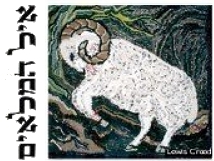
03.24.24 (II Adar 14, 5784) Shavuah tov, chaverim! Our Torah reading for the Sabbath immediately following the holiday of Purim is called parashat Tzav, where we learn how the first priests of Israel were consecrated for service by the blood of the lamb. First Aaron and his sons were washed with water, arrayed in priestly garments, and anointed with holy oil. During this ordination ceremony, a sin offering and burnt offering were offered on their behalf, and then a special "ram of ordination" (i.e., eil hamilu'im: איל המלאים, lit. "ram of abundance [מָלֵא]") was slaughtered. Some of this ram's blood was applied to the right ear, right thumb, and big toe of the Aaron and his sons (a picture of Yeshua as our suffering High Priest), and the rest of the blood was dashed upon the sides of the altar. After its slaughter, Moses took some unleavened bread and put it in the hands of the priests to perform tenufah (a wave offering) before the altar (a picture of the resurrection).
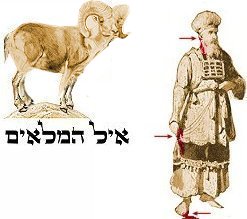 |
As followers of Yeshua, we too have been anointed with the blood from the "Ordained Lamb" -- Yeshua as our Kohen Gadol of the better covenant (Heb. 8:6). And we too have been anointed with the sacred shemen (oil) that symbolizes the presence and aroma of the LORD in our lives. As followers of Yeshua we are therefore truly "...a chosen race, a royal priesthood, a holy nation, a people for his own possession, that you may proclaim the excellencies of him who called you out of darkness into his marvelous light" (1 Peter 2:9). As Yeshua said: "You did not choose me, but I chose you and appointed you that you should go and bear fruit and that your fruit should abide, so that whatever you ask the Father in my name, he may give it to you" (John 15:16). May the God of Israel be pleased to help you serve Him in the truth...
Our Refuge in all Generations...
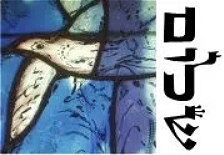
03.22.24 (II Adar 12, 5784) Don't let worry blind you to God's ongoing care; don't live as those without faith. You have a place in your Father's heart; you have a share in his house above. See the Lord as your Dwelling Place "in all generations"; behold his unchanging glory despite the fleeting shadows of this world.
We must first look to the Eternal to rightly see the finite; we must look upward before we look downward. As we contemplate God's Eternality and power, we realize the wonder and sanctity of our short time here. The Eternal is our refuge, our "dwelling place," in all generations, and that means in the present generation as well, on the other side of fleeting appearances of this world. When we pray to God as Avinu She-bashamayim, "Our Father in Heaven," we are calling to the One who (ש) is in the midst of the waters (מים) of Life.
The psalmist says (Psalm 118:17): "I shall not die but live." In order to live you must give yourself to death, but when you have done so, you discover that you are not to die, but live. "Giving yourself to death" means surrendering to God's will, accepting the yoke of heaven, and trusting in His governing "flow" over all of creation. This is the deeper meaning of "baptism" as we are immersed into God's care for us. Yeshua gives us abundant life.
The bloom of every flower is by eternal purpose, and not one common sparrow is forgotten by your Heavenly Father (Luke 12:6). God's irresistible providence comprehends and orders all things, from the realm of the subatomic to the cosmic motions of the heavenly bodies. The Lord is the Center of reality: "All things were created by Him, and for Him, and in Him all things hold together" (Col. 1:16-17). In light of this, Blaise Pascal asked, "What is left for us but to unite our will to that of God himself, to will in him, with him, and for him the thing that he has eternally willed in us and for us." In other words, what else can we do but learn to trust, accept, and to say "yes" to life – even if at times we may feel like strangers in exile... All our days are ordained; recorded in God's scroll. Therefore may God "teach us to number our days to get a heart of wisdom" (Psalm 90:12). So don't lose heart, friend; He who cares for you is a Good Shepherd, and you shall dwell in the house of the LORD forever.
Shabbat shalom, Purim Sameach, and love to you all...
Hebrew Lesson
Psalm 90:1 reading (click):
The Gospel of Leviticus...
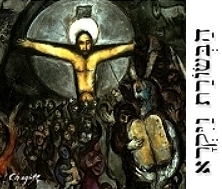
[ The following is related our Torah reading for this week, parashat Vayikra... ]
03.22.24 (II Adar 12, 5784) From a "macro" or high-level view, we can understand the book of Leviticus to provide a spiritual map that points the way to connect with God. It was written to speak to our need and desire to enter into the holy space of his reconciliation...
Recall that the book of Genesis explains our origin, the fall of our souls into sin and our subsequent alienation from God. It also foretold of the coming Redeemer who would heal us from our fallen estate and establish the kingdom of God upon the earth.
The book of Exodus further reveals the LORD as our Deliverer who saves us from bondage to olam hashkerim (עוֹלָם הַשְׁקְרִים), the false world, and who then graciously leads us to freedom by awakening our souls to divine truth.
The Exodus from Egypt (יציאת מצרים) serves as a parable of the salvation experience (Rom. 15:4; 1 Cor. 10:11). First, faith in God's promise is expressed by sheltering under the blood of the lamb of God as a "passover" sacrifice (as it was with Abel's offering), and through it we are delivered from the plague and curse of death. We are then graciously led by the Spirit of God through the waters into newness of life when we begin our journey to our true homeland. We begin to understand the covenant promise to be God's people. The revelation at Sinai pulls back the curtain of the phenomenal world to disclose the underlying and overarching spiritual reality. Hearing the divine voice imprints us with God-consciousness. We are awed and overwhelmed with the divine presence and desire to enshrine it within our hearts forever.
The building of the Mishkan (Tabernacle) "reifies" the vision to create a habitation of the divine Presence. It embodies our gratitude to God. As Solomon later said as he dedicated the Temple in Jerusalem, however: "Will God indeed dwell on the earth? Behold, heaven and the heaven of heavens cannot contain You. How much less this Temple which I have built! Yet regard the prayer of Your servant and his supplication, O Lord my God, and listen to the cry and the prayer which Your servant is praying before You today" (1 Kings 8:27-28). Nevertheless, the desire to know God to be present calls for a sacred place to be made within the heart...
And this is what the book of Leviticus, or Vayikra, is really about: hearing the call of God to draw near to Him. Therefore the Mishkan was structured with inner chambers or "gateways" that led ever closer to the throne of God himself. We come to the first gate by faith: the Curtain of the courtyard is opened and we enter. We see the outer altar where the Lamb of God was continually offered, reminding us of the original sacrifice and promise given at Eden. We wash ourselves at the basin and enter the Holy Place where we behold the divine light of the Menorah. We eat of the "bread of Presence" (לֶחֶם פָּנִים) and offer prayer at the golden Altar of Incense. At the appointed time, we reverently open the veil to enter the Holy of Holies, appealing to the blood offered on our behalf to make atonement for breaking God's heart. In a cloud of smoke we descry the blood sprinkled seven times over the broken tablets stored in the sacred Ark. We confess the Name of the LORD and sense His blessing and acceptance...
The great lesson of Vayikra is that God delivers us so that we can know his heart. And this is the message of the Cross of Messiah as well -- the great Altar of God, the Tabernacle "made without hands," where Yeshua entered the Holy of Holies to offer up his blood in intercession for our brokenness (Heb. 9:11-12). Amen, and may His Name forever be praised.
Hebrew Lesson
Psalm 26:8 reading (click):
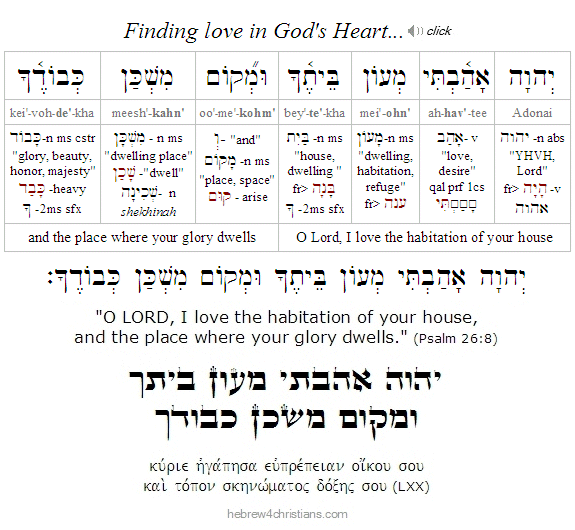 |
Purim and Deliverance...
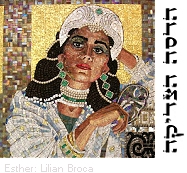
03.21.24 (II Adar 11, 5784) Do you remember this scene from the Fiddler on the Roof? A young man named Labish approaches the dear and wise old Rabbi and asks him, "Is there a proper blessing for the Czar?" Everyone is astounded at the idea. A blessing for the czar? The gentle Rabbi responds that indeed there is indeed a proper blessing for the czar: "May God bless and keep the Czar -- far away from us!" (Amen!)
The holiday of Purim is one of the most joyful of the Jewish year. We remember that long ago, in the city of Shushan (in ancient Persia), a wicked political sycophant named Haman attempted to blame the Jews for being different and to initiate a pogram for their extermination. The Jews were saved through the intervention of a queen named Esther (Hadassah) and her cousin Mordechai, both of whom were providentially enabled by God to overturn the evil decree of the King of Persia (the story is told in the Book of Esther). Throughout the centuries, in various places, many others have likewise tried to destroy the Jewish people, but none has succeeded. עַם יִשְׂרָאֵל חַי / am Yisrael chai: "The people of Israel live!" God's sovereign hand works all things together for good, even if at times things appear bleak and desperate (Rom. 8:28).
Hebrew Lesson
Psalm 31:4 reading (click for audio):
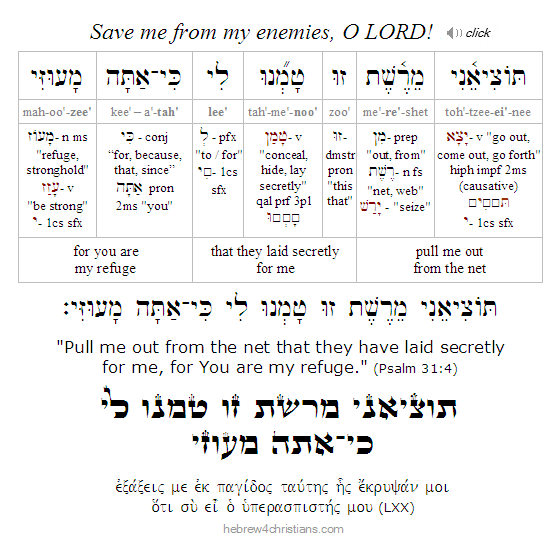 |
The name Purim (פּוּרִים) refers to the "lots" (i.e., dice) that Haman used to determine the "best day" to carry out their nefarious plan (there is irony regarding the word, however, since the word "pur" (פּוּר) also can refer to being "crushed" or "brought to nothing"). Haman's dice rolled "Adar 13," but since the Jews were delivered on the following day, the holiday is celebrated on the 14th of Adar. In other words, Adar 14 was ironically transformed from a day of potential tragedy and grief into a time of great rejoicing! (In Israel, Purim is observed a day later still (i.e., on Adar 15th) and is called Shushan Purim, since the deliverance of the Jews of Shushan did not occur until the 15th.) Among other things, the delicious irony of the Book of Esther reveals that there is no "chance" in God's universe, since He is the Master of the universe and supervises all it outcomes - even the "roll of the dice" (Prov. 16:33).
During the festive holiday of Purim it has become customary to dress up in costume and listen to the Book of Esther (i.e., megillat Esther, מְגִלָּת אֶסְתֵּר, or "the megillah") recited from the Hebrew scroll (before we hear the Megillah read, we recite three Purim blessings). Some people will dress as the noble Mordechai, others as the foolish king Ahashuerus, others as Esther, and so on. Part of the fun is that we are told that it's very important that we hear every word recited clearly, so we must keep very quiet as the story is being read. However, whenever we hear the name "Haman," we whirl groggers (ra'ashanim), blow whistles, stamp our feet, and make such a commotion that we can't hear his name. This is the only time we are encouraged to be boisterous when the Scriptures are being read.
After reading the Megillah, many communities put on their own "purimspiel" (Purim play) to reenact the dramatic story, with children dressed up as the characters of the play... Others put on "Purim puppet shows" at this time. It is a time of merrymaking and fun. Later we eat a festive meal (called a seudah, סְעֻדָּה) and enjoy three-cornered pastries called oznei Haman (אָזְנֵי הָמָן), or "Haman's Ears," for dessert (legend says that Haman's ears were twisted and triangular in shape). In Yiddish, these are called a hamantaschen (המן־טאַשן) and are often filled with prunes, chopped nuts, apricots, apples, cherries, chocolate, and so on. Eating Haman's Ears fit the delicious irony recounted in the Book of Esther....
 |
Purim Haggadol Prophecy...
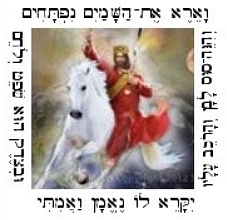
[ The holiday of Purim occurs Saturday, March 23rd at sundown this year... ]
03.21.24 (II Adar 11, 5784) Both Chanukah and Purim are holidays that celebrate God's victory over the forces of darkness... Just as the prophet Daniel foresaw the events of Chanukah, that is, the rise of "Epihpanes," the "Messiah of Evil" who will one day attempt to "assimilate" all of humanity into a "New World Order" (Dan. 9:27, 2 Thess. 2:3; Rev. 13:7-9, etc.), so Purim foretells how this wicked one will attempt to destroy the Jewish people during the End of Days (אַחֲרִית הַיָּמִים), though he will be destroyed by his own wicked devices. The Midrash Esther says that Purim, unlike many of the other holidays, will be celebrated even after the final redemption after the End of Days. This is because the story of Purim -- i.e., God's covenantal faithfulness and defense of His people -- will be magnified in the deliverance that leads to the establishment of the Messianic Kingdom upon the earth. Indeed, the Second Coming of the Messiah will be regarded as the final fulfillment of Purim! So while it is a often seen as time of unbridled celebration in Israel (ad lo yoda), the holiday of Purim has a very sober prophetic message that foretells the glorious end of this age.
Here is a vision of the coming "Purim haGadol," the great deliverance to come:
"Then I saw heaven opened, and behold, a white horse! The one sitting on it is called Faithful and True (נֶאֱמָן וְיָשָׁר), and in righteousness he judges and makes war. His eyes are like a flame of fire, and on his head are many diadems, and he has a Name written that no one knows but himself. He is clothed in a robe dipped in blood, and the Name by which he is called is the Word of God (דְּבַר הָאֱלהִים). And the armies of heaven, arrayed in fine linen, white and pure, were following him on white horses. From His mouth comes a sharp sword with which to strike down the nations, and He will rule them with a rod of iron. And He will tread the winepress of the fierce fury of the wrath of God, the Ruler over All (παντοκράτωρ), the LORD God Almighty (יְהוָה אֱלהֵי צְבָאוֹת). On his robe and on his thigh he has a Name written, the King of kings (מֶלֶךְ הַמְּלָכִים) and the Lord of lords (אֲדנֵי הָאֲדנִים). And with the breath of his lips He will slay the wicked" (Rev. 19:11-16).
May that day come speedily, and in our time... Amen.
Hebrew Lesson
Zeph. 1:41a reading (click):
HAPPY PURIM CHAVERIM!
During this Purim 5784, let us remember the nation of Israel in our prayers, and let us trust in God's providential hand in our lives -- that He will work all things together for the good of his people -- and that like wicked Haman, the enemy of our souls will likewise meet his fate, and then finally shall all our mourning be turned into dancing! Amen.
Sacrifice and Holiness...
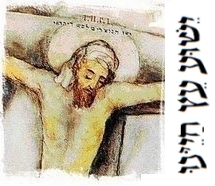
[ The following is related our Torah reading for this week, parashat Vayikra... ]
03.21.24 (II Adar 11, 5784) The book of Vayikra (i.e., Leviticus) presents two "overarching" themes. The first concerns the system of sacrifices (i.e., korbanot: קָרְבָּנוֹת) that were to be arranged in the Mishkan (and later, at the Temple). These include the daily sacrifice of the lamb (קָרְבַּן תָּמִיד), sacrifices for guilt and sin, thanksgiving offerings, and so on. The culmination of the sacrificial system, however, was expressed by the elaborate Yom Kippur service that was performed to obtain "kapparah" (כַּפָּרָה), or atonement on behalf of the people.
The second overarching theme of the book of Vayikra concerns matters of personal holiness (i.e., kedushah: קְּדוּשָׁה), including laws regarding what is "clean" (i.e., tahor: טָהוֹר) and "unclean" (i.e., tamei: טָמֵא) in matters of diet, sexual relations, personal health, and so on. In addition, holiness is connected with social relationships, such as the duty to honor parents, to give tzedakah to the needy, and to refrain from doing any harm to others. Indeed, the Ten Commandments are restated in Vayikra beginning with the words "You shall be holy, for I the LORD your God am holy" (Lev. 19:1-2). Note, incidentally, that the order of the commandments appears differently in Leviticus 19 than what is written in Exodus chapter 20 (and also in Deuteronomy chapter 5), and that additional commandments are listed there as well.
These two major themes - sacrifice and holiness - are connected, though perhaps not in the way you might immediately think. Many people suppose the sacrifices were given as a ritual means of obtaining pardon for sin, but this is an oversimplification. The Hebrew prophets did not add or subtract from the laws given at Sinai, though they sometimes criticized the people for offering sacrifices without the desire to obey God's law. The sacrifices themselves were not the problem, but they were ineffectual apart from genuine teshuvah (see 1 Sam. 15:22-31; Hos. 6:6; Matt. 12:7; Prov. 21:3; Isa. 1:11. Micah 6:6, Jer. 7:22).
The point here is that offering sacrifice apart from a heart of obedience is meaningless mummery and ostentation, since the moral law of God was given first to the people and only afterward were the sacrifices described to Moses in the vision of the altar at Sinai. But it is obedience to God that imparts virtue to sacrifice, as the cross of Yeshua exemplifies.
The idea of sacrifice predates the giving of the law given at Sinai, of course, and goes back to the primordial Garden of Eden itself where God offered up the lamb for Adam and Eve's transgression (Gen. 3:21). This set the pattern, and later Adam brought sacrifice, as did Cain, Abel, Noah, Shem, Abraham, Isaac, Jacob, and Moses.
We can learn from the account of Cain and Abel about righteous sacrifice. First note that Abel presented to God a sacrificed lamb - recalling the sacrifice of God and the promise of the redemption to come given to Adam and Eve (Gen. 3:14-15) - whereas Cain offered fruits of the earth. Their respective sacrifices present a study in contrasts, as God "turned to Abel and his offering" but he did not so regard Cain's offering. In a sense Abel (הֶבֶל), whose name comes from "vanity" or "vapor" (הָבַל) "re-presented" God's offering of the lamb that covered the sin of his parents, having faith in the promise of the Redeemer who was to come, whereas Cain (קַיִן) whose name means "to get" or to "take" (קָנָה), simply returned the gift of the fruits of the garden. Now there is of course nothing wrong with offering "first fruits" to God as minchah (מִנְחָה), or a gift, but God was looking for Cain to have faith in his promise. When God saw that Cain felt dejected, He rhetorically asked: "If you do well, will you not be accepted?" which indicates that being accepted is a matter of earnest faith in God, for that is what "doing well" means in the eyes of heaven. The Lord's words to Cain teach us that the basis for offering sacrifice to God is to express faith in his healing love and salvation...
This principle is essential to all true Torah: Those who trust in God's promises find divine favor and blessing, as the LORD said to aged Abraham when he gazed upon the canopy of stars and believed the "impossible" promise that he would become the father of a multitude of people. Yet Abraham trusted God for the miracle: "And he (Abraham) believed in the LORD; and he (the LORD) counted it to him for righteousness" (Gen. 15:6). Abraham believed in God's righteousness -- his blessing, power, and lovingkindness -- that would fulfill the vision, certainly not in his own merit or strength.... This is the very first commandment, after all, namely to believe in the Lord as your Savior, Healer, Blessing, Life, Destiny, and so on. "I AM the LORD your God" (אָנֹכִי יְהוָה אֱלֹהֶיךָ) is the first word of faith (Exod. 20:2).
We have to be careful about what we believe makes us right with God. Do we trust in ourselves or in God for our righteousness? Abel saw the vanity of human effort to attain righteousness, whereas Cain sought to acquire it through his own effort. The Holy Temple was destroyed because false religion offered sacrifices as a way to excuse their sin and consequently to disregard the call to turn to God and live a life of holiness. Walking by faith means understanding the sanctity of life itself, to accept that we are called by God to be set apart to know Him in all our ways (Prov. 3:5-6). Offering a sacrifice as "payment" for sin misses the point. True holiness means being "separated" from the profane to know and love God, but too often religion can serve as a false god that promotes sin by promising forgiveness apart from the need to walk in the obedience of faith. Therefore God said through the prophet Hosea: "I desire goodness and not sacrifice" (Hos. 6:6). "Sacrifice" from a faithless person is nothing less than an abomination to God (Isa. 1:11; Amos 5:21; Prov. 15:8).
The two great themes of sacrifice and holiness are therefore connected by faith in God's promises, and there can be no true sacrifice apart from heartfelt faith. Indeed, this is the ultimate purpose of the sacrifices - to honor God's heart and redeeming love given in Yeshua, the great Lamb of God (John 1:29; 1 Cor. 5:7). The blood of "bulls and goats" could never take away sin, but the sacrifice of God given of his own love for us does, and that is the message of the cross (Heb. 10:4-10). The sacrificial system with the daily offering of the lamb foreshadowed the Substance of the promise fulfilled in Yeshua. It is not our sacrifice that is the focus, but God's sacrifice of Christ given on our behalf, and our only response to this exceedingly precious gift is to offer thanks for God's kindness and mercy. "It is the kindness of God that leads you to repentance" (Rom. 2:4). As it written, "Through Him (i.e., the sacrifice of Yeshua) let us then continually offer up the sacrifice of praise to God, that is, the fruit of lips that confess the truth of his Name" (Heb. 13:15). Amen.
Hebrew Lesson
Psalm 9:10 Hebrew reading (click):
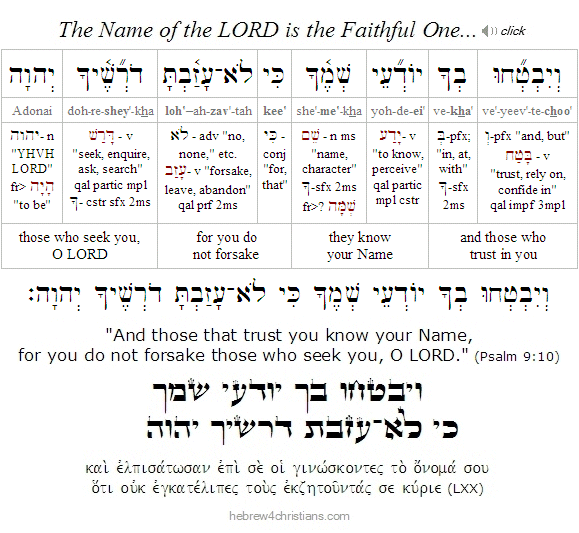 |
Esther and God's Providence...
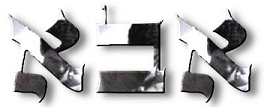
03.20.24 (II Adar 10, 5784) Much is made over the fact that the book of Esther is the only book of the Tanakh that does not explicitly mention the Name of God. However, the idea of God's sovereignty and diivine providence (i.e., hashgachah, הַשׁגָחָה) is clearly implied throughout the entire story. Indeed the sages teach that the message of Purim concerns the kingship of God (ממלכת האל), with the word "the king" (המלך) appearing over 100 times and the word "kingdom" (מלכות) appearing ten times in the scroll. In most cases the word "king" refers to King Achashverosh, though the sages say that when Achashverosh is not explicitly named, it may also refer to the King of the Universe.
The phrase hester panim (הסתר פנים) means "hiding of the face" and is often used when discussing the Book of Esther. In this sense of the term, hester panim is somewhat like the sun on an overcast day: Just because you don't see it doesn't mean it isn't there. God's providential love is at work at all times, whether we perceive it or not. This is suggested in the name of the scroll itself: the phrase Megillat Esther (מגילת אסתר), literally "the Scroll of Esther," can be rearranged to say megallat ha'seter (מגילת הסתר), "the concealed scroll."
In light of this nes nistar (נס נסתר), or "hidden miracle" of the Jew's deliverance, Esther and Mordecai ordained that Purim should be observed as a "day of feasting and merrymaking" and of sending gifts to the poor (Esther 9:22,28). By the way, Purim (פורים) was so named because Haman had cast lots (purim) to determine the day on which to destroy the Jews.
So what does Purim teach us? Well first of all it teaches that the LORD is in control of everything, even if may seem otherwise. Nothing happens apart from God's sovereign will, and therefore everything works together for the ultimate good for those who trust in Him (Rom. 8:28). The term hashgachah pratit (השׁגחה פרטית) refers to God's personal supervision of our lives (hashgachah means "supervision," and pratit means "individual" or "particular"). Since He is the Master of the Universe (אדון עולם), God's supervision and providence reaches to the smallest of details of creation - from subatomic particles to the great motions of the cosmos. God not only calls each star by its own name (Psalm 147:4), but knows each particular lily and sparrow (Matt. 6:28-30, 10:29). Each person created in the likeness of God is therefore under the direct, personal supervision of God Himself -- whether that soul is conscious of that fact or not. As Yeshua said, even the hairs on your head are all numbered (Matt. 10:30). The God of Israel is called אלהי הרוּחת לכל־בּשׂר / Elohei ha-ruchot lekhol-basar: "The God of the spirits of all flesh" (Num. 16:22), and that means He is LORD even over those who vainly attempt to suppress His Presence and reality. Second, Purim teaches that God's plans for Israel will never (ever) fail and that those who disregard Israel in their theology do so at their peril. Third, the story of Esther provides a warning for those tyrants and princes of this world who oppress God's people: Like the false usurper Haman, you are likewise doomed to failure, and the LORD will vindicate all who trust in Him for deliverance.
There is great comfort when we understand that God has complete authority over everything in the universe -- including our ultimate welfare (John 10:27-28). When we pray to the LORD God of Israel, we intuitively understand that He is completely sovereign and Lord over all things... All power, glory, authority, and dominion is His alone, and all that is in the heaven and in the earth is His (1 Chron. 29:11-12). We do not worry that He is somehow incapable of handling our troubles or that He is unable to help us. No, we acknowledge that the God most High (אל עליון) sustains all things by the Word of His power (Col. 1:17). He is "the blessed and only Sovereign, the King of kings (מלך המלכים) and the Lord of lords" (1 Tim. 6:15). Whenever we think clearly in light of the revelation of Scripture, we apprehend the truth about God's sovereign glory and power...
Hebrew Lesson
Proverbs 16:9 reading (click):
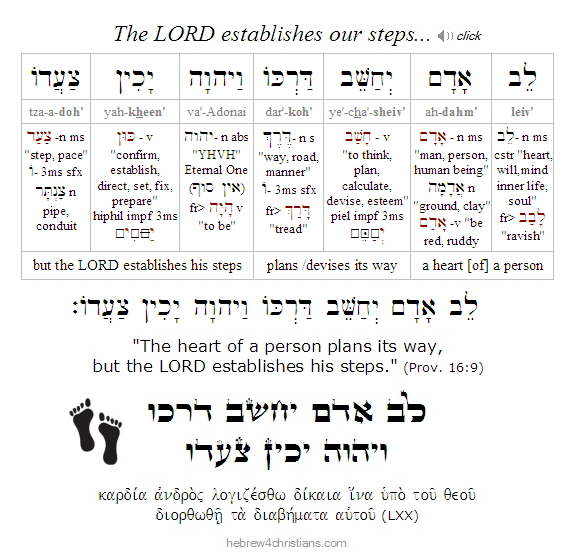 |
Torah of Sacrifices...
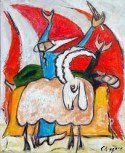
03.19.24 (II Adar 9, 5784) Our Torah portion this week (i.e., Vayikra) begins with the Lord calling out (קָרָא) to Moses to explain the "laws of korbanot" (תורה של קרבנות), or the way the people could pleasingly draw near to him. Note that the root of the word korbanot, often translated as "offerings" or "sacrifices," is karov (קרוב) which means to come close, to enter into, or to approach. The korbanot, or sacrifices, were meant to bring us closer to God, and the central sacrifice at the altar was that of a defect-free male lamb offered daily, called korban tamid (קָרְבַּן תָּמִיד), or the "perpetual sacrifice." Unlike other sacrifices that may be offered at the altar, the korban tamid was continually offered by God Himself in commemoration of the great Passover redemption wherein the blood of the lamb was offered on behalf of Israel. Like the cross of Messiah our Passover (משיח פסח שלנו), God provides the Lamb and by this grace He enables access to the divine presence for blessing and eternal life...
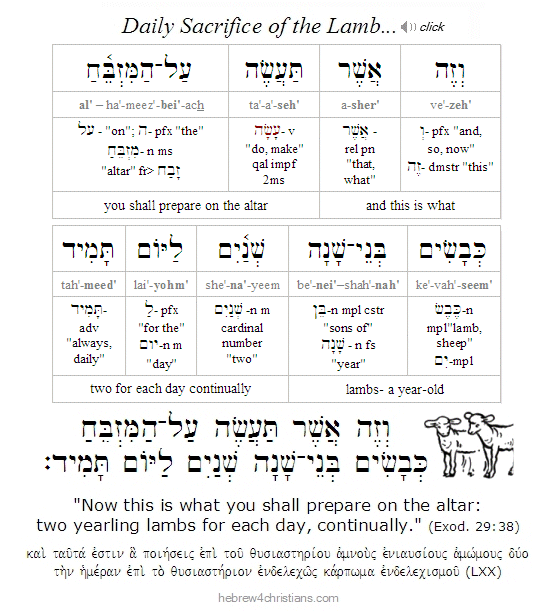 |
Other sacrifices, such as the "chatat" (חטאת) or sin offering, required the offerer to place his hands on the head of the animal, leaning on it will all his might, as he confesses his wrongdoing and expresses his desire to return to God. This procedure is called "semichah" (סמיכה) and the confession is called "vidui" (וִדוּי). Immediately following this the animal is led away to be ritually slaughtered (i.e., shechittah: שחיטה) and the blood was caught in a basin and then dashed upon the altar by the designated kohen (כּוֹהֵן), or priest.
Various other korbanot are mentioned in our reading, including the "olah" (עולה), or "ascending" offering wherein the kosher animal is entirely burned on the altar; the "shelamim" or "peace" offering (קרבן שלמים) given for celebratory events or to give thanks (תודה); the "asham" or guilt offering (קרבן אשאם) which is a type of sin offering that is more serious and involves restitution for wrongdoing. Note that for each of these offerings, if an offerer is too poor to offer an animal for sacrifice, the "minchah" (קרבן מנחה), or prepared flour offering, or the "ohf" (קרבן עוף), a bird (i.e., pigeon or dove) sacrifice was acceptable.
Note that the original Passover sacrifice (קרבן פסח) was not given to the Levitical priesthood as a sin offering, since it preceded Sinai and the giving of the various laws concerning the Mishkan/Temple sacrificial rites. In the same way, Yeshua's sacrifice was directed from Heaven itself by means of the prophetic office of Malki-Tzedek (מַלְכִּי־צֶדֶק) - a higher order of priesthood (Gen. 14:18; Psalm 110:4; Heb. 7). Yeshua both offered Himself up as the "Lamb of God" that causes the wrath of God to (eternally) pass over those who personally trust in Him, and He also offered himself as the "Goat of God" whose blood was sprinkled in the Holy of Holies to cleanse us from sin and give us (everlasting) atonement. (Other metaphors are also given in Scripture, for example, Yeshua offered Himself as a Snake lifted up (John 3:14-15; cp. Num. 21:4-9), as a Red Cow (parah adumah), and so on).
For Yom Kippur (יום הכיפורים), or the "Day of Atonement," two goats were required: one goat was for blood sacrifice in the Holy of Holies (the Goat of the LORD) and the other was used as a "scapegoat" for the sins of the community (the goat of Azazel). The Gospels seem to emphasize the connection between Yeshua as the "Lamb of God who takes away the sins of the world" with Passover/Exodus more than the connection between Yeshua as the "Goat of the LORD" whose blood was sprinkled upon the Mercy Seat with Yom Kippur - though the author of the Book of Hebrews explicitly makes this connection (Heb. 9:11-12; 24-ff).
It may seem like the details of the various sacrifices are tedious and even boring to read, but the deeper truth of what they represent is nothing short of amazing. Yeshua as the "Lamb of God" pictures personal redemption from slavery to Satan and freedom from the wrath of God. This is the greater Passover/Exodus connection. By means of Yeshua's shed blood and broken body, the wrath of God passes over us and we are set free to serve Him.... Yeshua as the "Goat of God" pictures both personal cleansing (i.e., "propitiation" or "expiation" for our sins: the Greek word (ἱλαστήριον) is used in the LXX for the kapporet (Mercy Seat) in the Holy of Holies which was sprinkled with the blood of the sacrifice on Yom Kippur) as well as national teshuvah and cleansing for ethnic Israel at the end of the Great Tribulation period. At that time Yeshua will function as Israel's true High Priest whose sacrifice is applied for Israel's Atonement. This is the Yom Kippur connection.
Hebrew Lesson
Psalm 4:5 Hebrew reading (click):
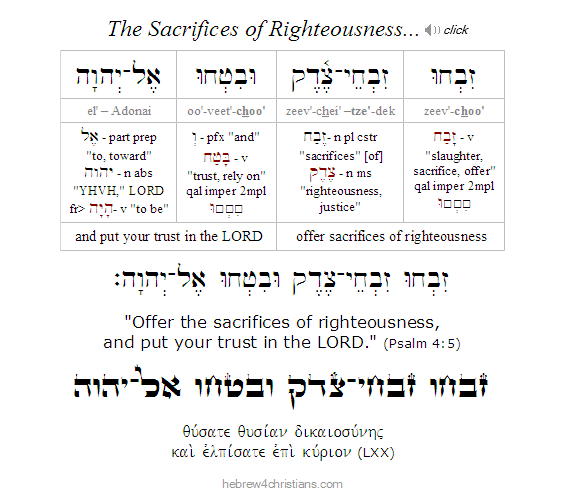 |
Teshuvah and Despair...
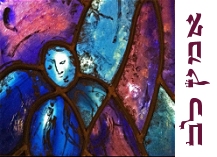
03.19.24 (II Adar 9, 5784) There are moments – dark, gnawing, raw – when you may lose sight of hope, when you might even fear that you have lost your faith – not in God or his promises – but rather in yourself, in your own strength to continue, to stay focused, to keep pressing on "hope against hope..." The remedy here is always the same: to remember that within you – that is, in your flesh - "there is no good thing" and that the miracle of salvation is made secure by God's passion for you, not your own power or desire. "Not by might, nor by power, but by my Spirit, saith the LORD of Hosts."
We don't trust in ourselves nor in the strength of our inner resolve, but solely in the power of God to make the way (John 1:13). We must turn away from ourselves to regain the message of God's unfailing love; only when we lose sight of ourselves do we find ourselves. God redeems you from your lost estate and touches you in your uncleanness; He clothes himself in your pain so that you may be clothed in his love. That never changes, despite dark moments, and to that we must always return...
Hebrew Lesson
Isaiah 40:29 reading (click):
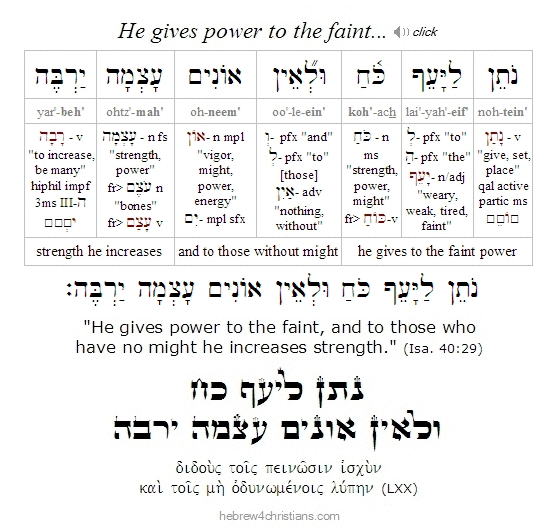 |
Where it says, "I can do all things through Messiah who strengthens me" (Phil 4:13), that includes being healed of the inner pain of your life: your failures, your shame, the ache of rejection, abandonment, and so on. It means being set free from disillusionment, despair, and the oppression of relentless fear. "I can do all things through Messiah" means no longer accepting messages of self-hatred and hopelessness, no longer heeding the malicious whispers that say: "I am of no value," "I am unlovable," "my life is hopeless." No, "I can do all things through Messiah" means learning to be accepted, honored, and esteemed by God; it means opening your heart to God's love and blessing for your life; it means allowing your heart to be made right, to have inner peace... After all, Yeshua's great prayer was that we would know the truth of God's love for us (John 17), and this is the central need our lives.
The Centrality of Leviticus...

03.19.24 (II Adar 9, 5784) The Book of Leviticus (i.e., sefer Vayikra: ספר ויקרא) is to the Torah what the Book of Hebrews is to the New Testament. Leviticus is both the physical and spiritual center of the Five Books of Moses and comprises its ritual expression. The sages count 246 of the 613 commandments of the Torah in this book (over 40%), and many of the Talmud's discussions regarding ritual purity and holiness are based on it.
Many Christian readers of the Bible want to skip the Book of Leviticus, however, because they find the detailed description of the Mishkan (Tabernacle) and the various laws of the sacrificial system to be tedious and/or irrelevant for followers of Yeshua. This is unfortunate because in its pages the great sacrificial work of Yeshua is foreshadowed and explained for us. Indeed, without the underlying concepts "seeded" there, various fundamental New Testament teachings concerning the atoning sacrifice of Yeshua for our sins, our justification by faith, and our call to walk in sanctification would not make much sense....
The LORD intended that the sacrificial laws given to the Levitical priests (i.e., kohanim) would foreshadow the coming atoning sacrifice offered by Yeshua, the "Lamb of God slain from the foundation (יְסוֹד) of the world" (1 Pet. 1:19-20, Rev. 13:8). This is why these laws are called torat Kohanim - the "teaching of the priests." This instruction (i.e., torah: תּוֹרָה) was intended for all Israel to understand the need for blood atonement in order to draw near to God (Lev. 17:11). The Levitical system as a whole served as a "type" or "picture" of heavenly realities. Moses received the "pattern" (i.e., tavnit: תַּבְנִית) of the Throne of God on Sinai, but this was a physical copy or "shadow" of the spiritual Reality he beheld in visions. The Mishkan was always intended to be moved into the Promised Land, which King David later established in Zion, the place of the Holy Temple. But it was the sacrificial death of Yeshua that is the focal point and goal of it all: Yeshua is the Substance of all that the sacrifices foreshadowed...
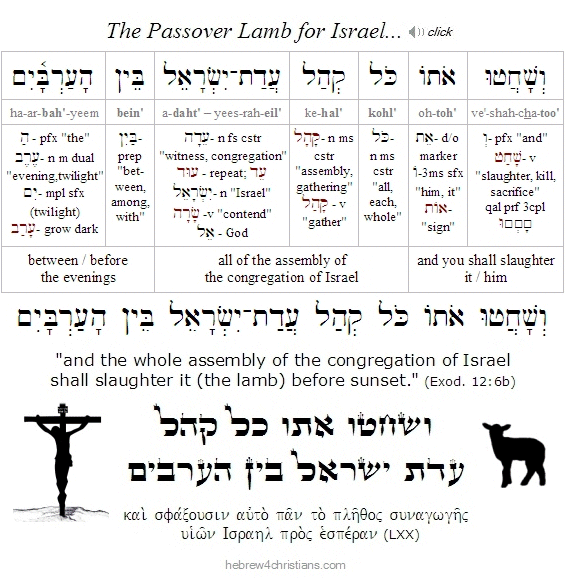 |
Audio Podcast:
Hidden in Plain Sight...
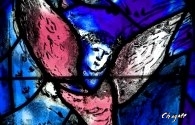
03.18.24 (II Adar 8, 5784) Shalom dear friends. The festival of Purim begins Saturday, March 23rd at sundown this year. During this time we revisit the enigmatic Book of Esther and joyfully recount how God providentially cares for his people...
Although the Name of God is not explicitly mentioned in the Book of Esther, the story is essentially about revelation, that is, the disclosure of God's Presence despite His apparent concealment. The phrase hester panim (הֶסְתֵר פָּנִים) means "hiding of face" and is often used when discussing the divine providence. God's plan is being fulfilled, step-by-step, even if it is hidden within the "natural" world of human beings and their choices (Jer. 10:23; Prov. 21:1). The LORD is Ha'mashgiach (i.e., הַמַּשְׁגִיחַ, the supervisor) of all things - from the motions of subatomic particles to the great events of the cosmos. He not only calls each star by its own name (Psalm 147:4), but knows each particular lily and sparrow (Matt. 6:28-30, 10:29). Indeed, each person is under the direct, personal supervision of God Himself (הַשְׁגָּחָה פְּרָטִית) -- whether he or she is conscious of this or not. As Yeshua said, even the hairs on your head are all numbered (Matt. 10:30).
גָּדוֹל יְהוָה וּמְהֻלָּל מְאד
וְלִגְדֻלָּתוֹ אֵין חֵקֶר
gah·dohl · Adonai · oo·me·hoo·lahl · me·ohd
ve·leeg·doo·lah·toh · ein · chei'·ker

"Great is the LORD, and greatly to be praised,
and his greatness is unsearchable." (Psalm 145:3)
Download Study Card

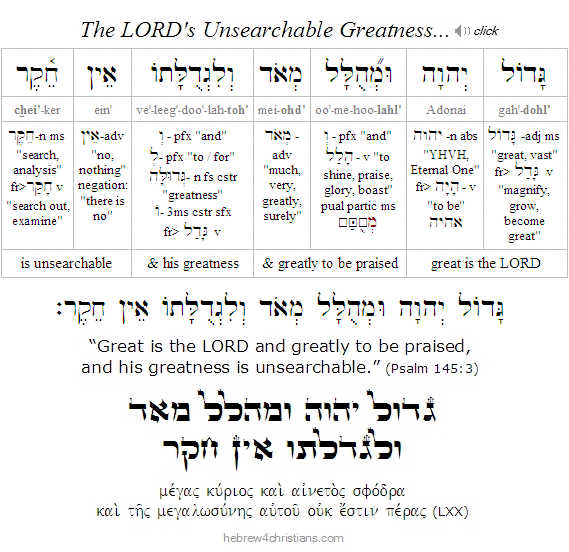
The Apostle Paul taught that God "chose us [εκλεγομαι] in the Messiah before the foundation of the world" (Eph. 1:4). God called you by name -- before He created the very universe itself. "God has chosen you from the beginning for salvation through sanctification by the Spirit and faith in the truth" (2 Thess. 2:13). God loves you with an "everlasting love" (אַהֲבַת עוֹלָם) and with lovingkindness (i.e., chesed, חֶסֶד) draws you to Himself (Jer. 31:3). There is no fear in God's sovereign and irresistible love for your soul (1 John 4:18). "If God is for us, who can be against us?" (Rom. 8:31).
Note: For more on this topic, see "Theology, Paradox, and Purim."
Parables and Revelation...
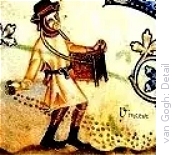
[ The holiday of Purim celebrates God's providential deliverance of his people... ]
03.18.24 (II Adar 8, 5784) Yeshua often used various agricultural images in his parables. For example, he explained that people are known by the "fruits" of their lives (Matt. 7:16-20). He likened the spread of his message in terms of "sowing and reaping" (Matt. 13:3-23) and compared the Kingdom of Heaven to the secret working of a mustard seed (Matt. 13:31-32). Yeshua regarded the world as a "field" for planting with different "types of soil" (Matt. 13:38-43), and warned of the "great harvest" of souls at the end of the age (Luke 10:2; Matt. 13:30). He pointed to signs from a fig tree to indicate the nearness of the prophesied End of Days (Matt. 24:32-33). Yeshua also used the metaphor of a "vine and its branches" to explain how his followers are to be connected to Him (John 15:1-6).
Undoubtedly Yeshua taught in parables because they simultaneously conceal and reveal the truth. A parable obscures the truth to those who don't really want it; just as it reveals the truth to those who do (Luke 8:9-10; Psalm 72:8; Matt. 13:34-35). Since Yeshua's whole life was a parable of sorts - a "disguise" that led to the victory of our deliverance (Phil. 2:7) - it is not surprising that he regularly used "figures of speech" to provoke people to examine their own heart attitude and faith... In this connection note that Yeshua never explained the "mysteries of the kingdom of God" directly to the crowds, nor did He ever pander to the crowd's clamor or interests. His message is always meant for the individual soul who was willing to follow Him -- to the one who had "ears to hear."
Reading the parables can help us take inventory of our lives. For example, whenever we hear the famous "parable of the sower" (Matt. 13:3-23) we are reminded that God is like a farmer who sows seed upon the soil of human hearts (the quality of which may be hard, shallow, choked, or good). If we are honest with ourselves, we will see our own hardness, shallowness, and selfishness in contrast to the fruitfulness marked by the good soil, and this may prompt us to seek God for help. Only the new heart (lev chadash) created by power of God's Spirit can possibly yield the fruit of the Spirit. Yeshua therefore warns us: "Take care then how you hear, for to the one who has, more will be given, and from the one who has not, even what he thinks that he has will be taken away" (Luke 8:18).
Hebrew Lesson
Psalm 78:2 Hebrew with comments (click):
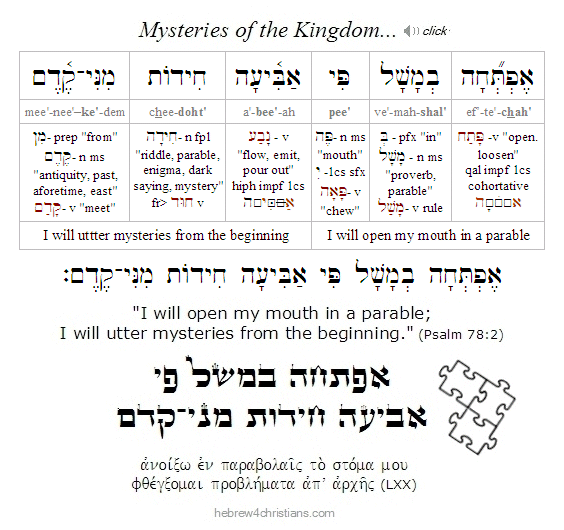 |
With God all things are possible, and the life of God is a miracle that comes from God's own source of Life. It is the fruit of the Spirit, after all, and not the fruit of human effort or moral reformation... Amen and Chag Purim Sameach!
Note: March 2024 updates continue here.
Follow the site's progress:
Site Updates for 2024
Site Updates for 2023
Site Updates for 2022
Site Updates for 2021
Site Updates for 2020
Site Updates for 2019
Site Updates for 2018
Site Updates for 2017
Site Updates for 2016
Site Updates for 2015
Site Updates for 2014
Site Updates for 2013
Site Updates for 2012
Site Updates for 2011
Site Updates for 2010
Site Updates for 2009
Site Updates for 2008
Site Updates for 2007
Site Updates for 2006
Site Updates for 2005
Site Updates for 2004
Hebrew4Christians Forum
|



















































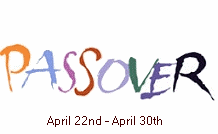

![Spring Holiday Timeline (H4C]](../../About_HFC/Site_News/roshchodeshim-line.gif)
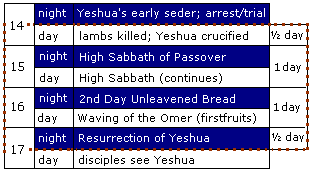









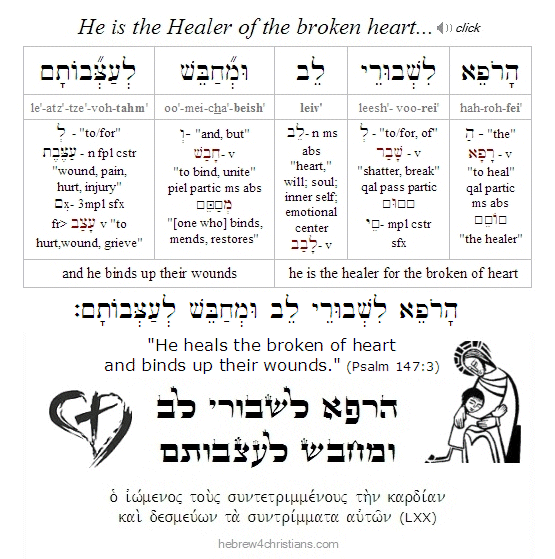

![Spring Holiday Timeline (H4C]](../../About_HFC/Site_News/shabbathagaolline.gif)



